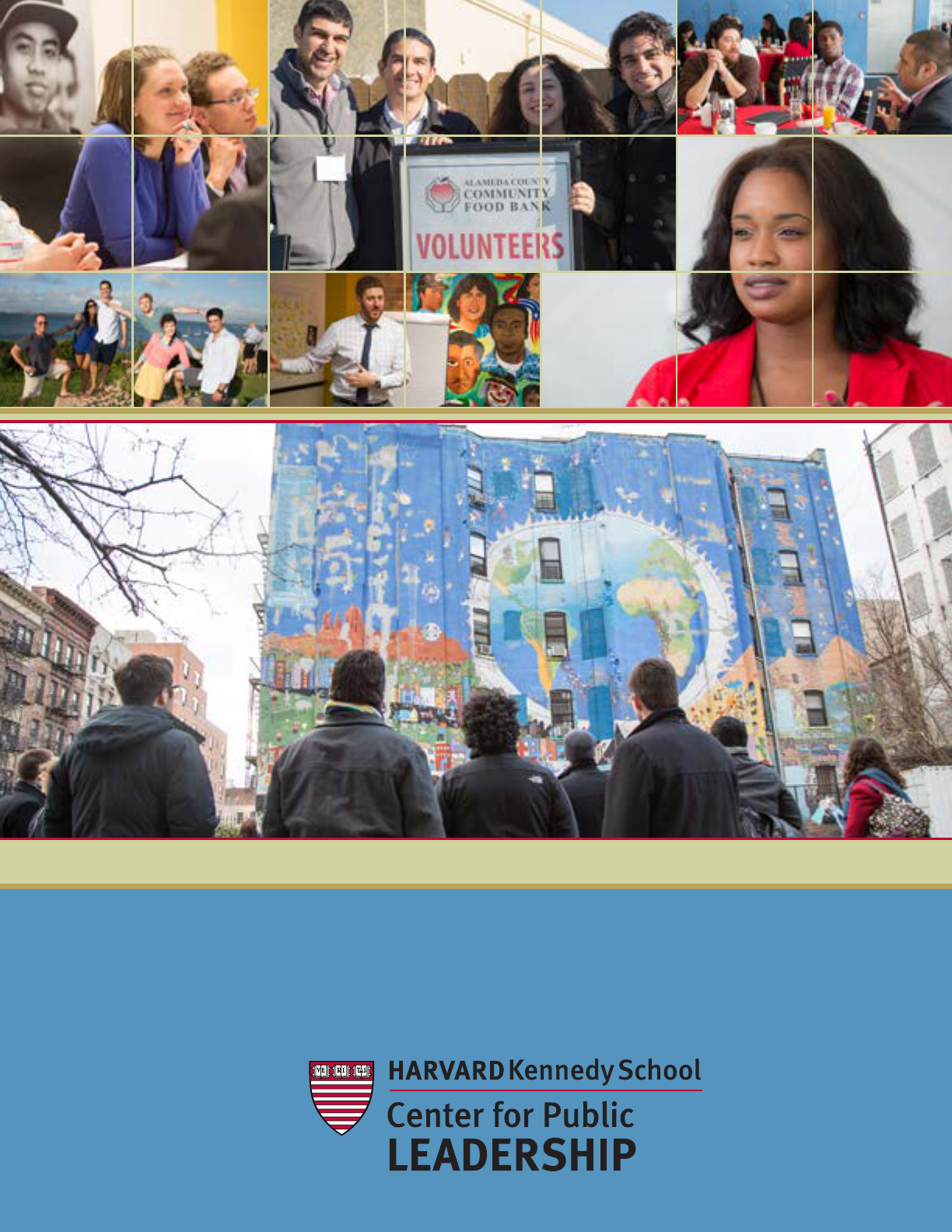
PROFILE BOOK2013-2014
Center for Public LeadershipFellows
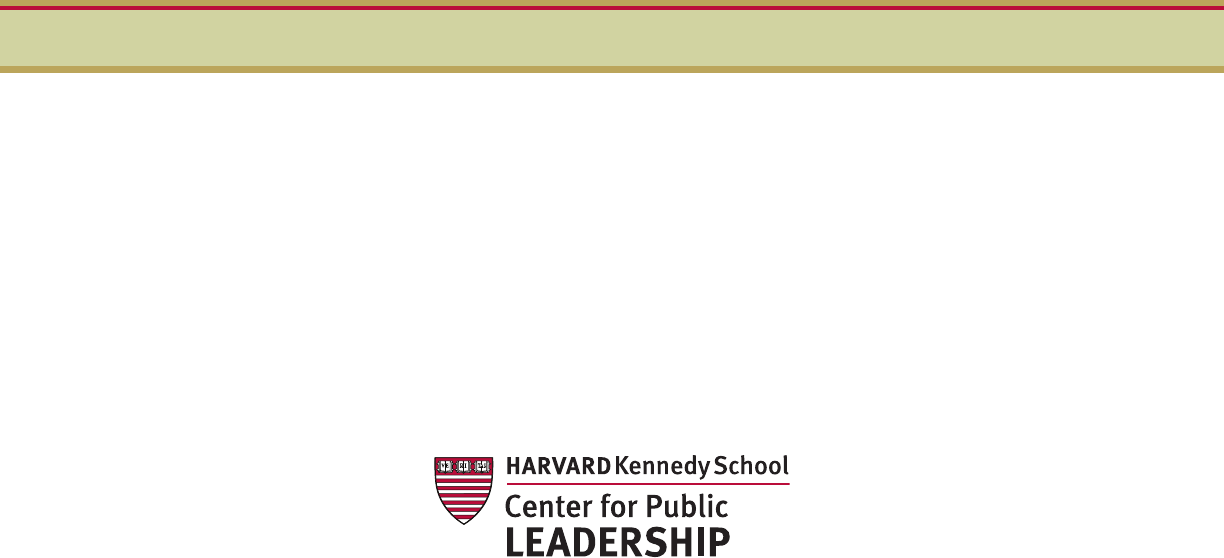
P B -
Center for Public LeadershipFellows

PROFILE BOOK 2013-2014
2
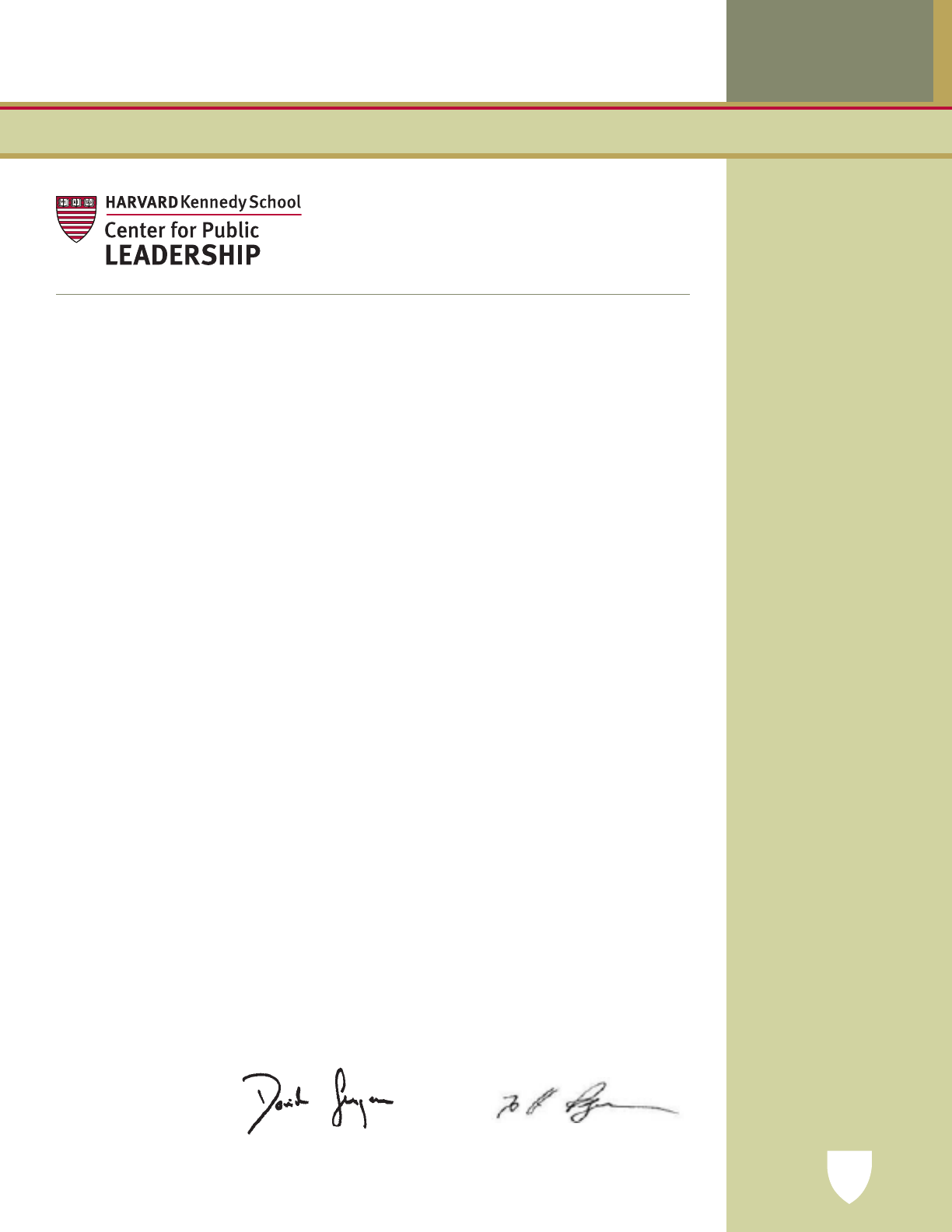
PROFILE BOOK 2013-2014
Center for Public Leadership Fellows
F
Letter from the Co-Directors
e Center for Public Leadership (CPL) is built on the premise that world-class leaders are not
really born—they are self-made. Our intention is to help students understand and work on core
leadership skills so that they enter the world primed for success. Our ve fellowship programs
account for over 40% of scholarships among the 11 HKS Centers:
• Dubin Fellowships — Glenn Dubin designed his fellowships to serve Kennedy School
students who have demonstrated the ability to thrive and lead in the face of adversity, and a
commitment to making a transformative impact on their communities.
• George Fellowships — supported by Bill and Penny George, these fellowships provide a
third-year capstone experience for students pursuing joint degrees at the Kennedy School and
Harvard Business School. e program emphasizes character development.
• Gleitsman Fellowships — these fellowships are oered to Kennedy School students who will
become social innovators and social change agents. ey grow out of a $25 million bequest by
Alan Gleitsman that has endowed several programs at the Center.
• Wexner Fellowships — these pioneering fellowships at HKS were established by the Wexner
Foundation over 20 years ago, each year bringing eight to ten mid-career students from Israel.
Wexner Fellows are not included in this book for security reasons.
• Zuckerman Fellowships — with funding from Mort Zuckerman, this fellowship oers people in
the elds of business, law, and medicine full scholarships plus stipends to pursue a public service
degree from the Kennedy School, Graduate School of Education, or School of Public Health.
is year, we are thrilled to welcome 51 Fellows to our Center and to the extended alumni community
of over 500 people working across all sectors of public service. e nancial support of these programs
is a magnet for top students, but the value proposition is much broader: each group of Fellows comes
together regularly for dinners, speakers, retreats and other experiential learning opportunities to enrich
their academic experience and to build lasting ties that can become a powerful force for change.
Since joining forces as co-directors we are, in eect, undertaking the relaunch of our Center.
Our aim is to propel CPL to the forefront of research on leadership and the training of the next
generation of leaders for the common good. We are poised to signicantly increase the number
of fellowships, creating more opportunities for those devoted to leadership in public service to
study at Harvard. Finally, eective July 1 the Hauser Center for Nonprot Organizations became
the Hauser Institute for Civil Society and took up residence within CPL. is merger oers an
extraordinary opportunity to strengthen social sector leadership in the U.S. and abroad.
We look forward to sharing this journey with you over the next year, exploring how to best prepare
a younger generation to manage and lead.
With warmest wishes,
Center for Public LeadershipFellows
3
David Gergen Max Bazerman
Professor of Public Service Professor of Business Administration
Co-Director Co-Director
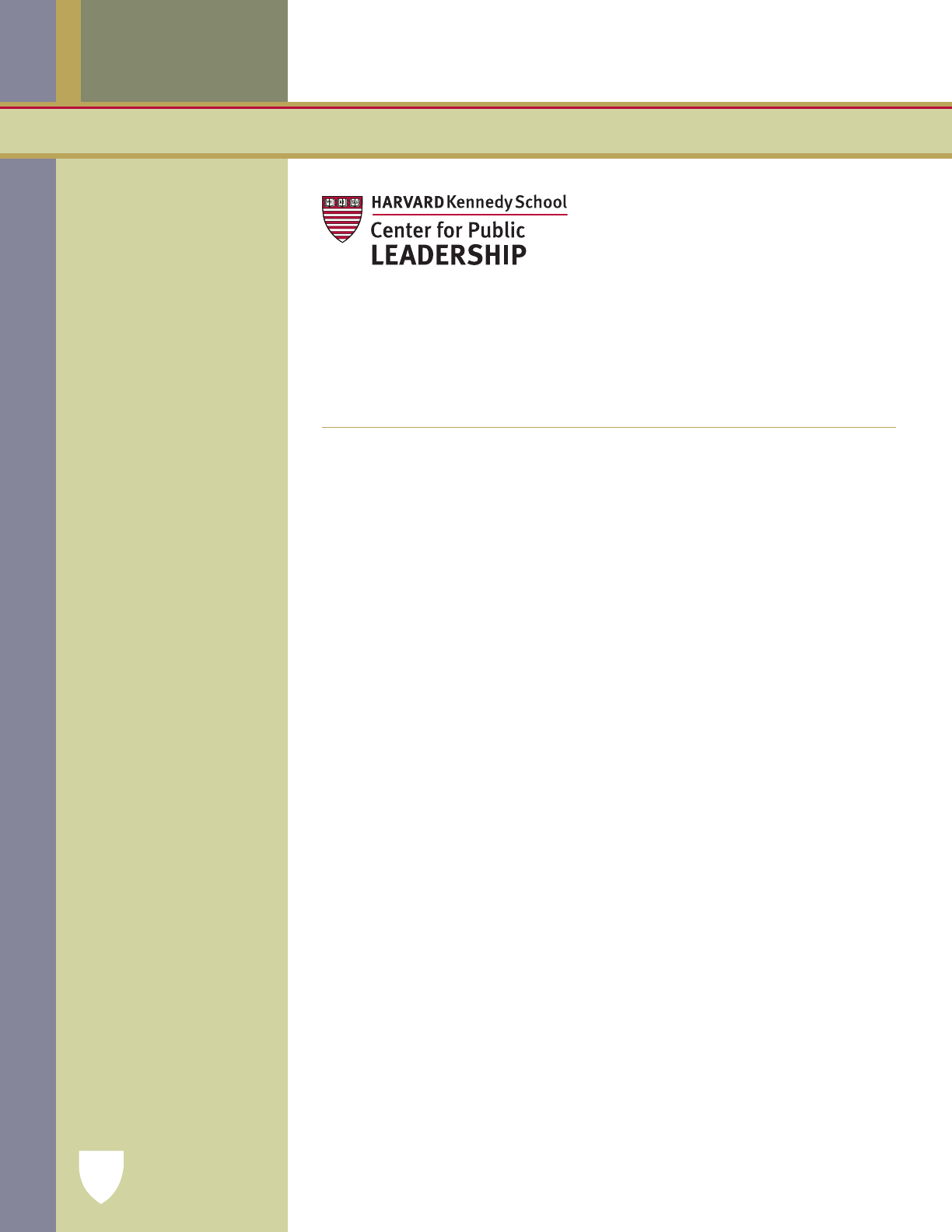
PROFILE BOOK 2013-2014
Dubin Fellows
Harvard Kennedy School
4
About the Dubin Program
Dubin Fellows
Harvard Kennedy School
T D P E L
e Dubin Program provides generous opportunities for HKS students with
a demonstrated commitment to transformative leadership for the public good.
Dubin Fellows are entering master’s degree students at the Harvard Kennedy
School who have demonstrated strong character, academic excellence, the
ability to thrive and lead in the face of adversity, and a commitment to making
a transformative impact on the communities they serve. ey are awarded a
scholarship up to full tuition and health fees, and participate in an enriching
cocurricular experience designed to enhance and engage their development as
the next generation of public leaders.
In order to facilitate an outstanding Fellows’ experience and create the broadest
possible impact of the program on the entire Kennedy School, the Dubin
Fellows Program for Emerging Leaders also supports the following:
• Summer internships – for both fellows and non-fellows, the
program oers Summer Fellowship Grants for HKS students
engaging in unpaid summer internships or research projects that
relate to leadership and public service.
• Dubin emerging leaders’ speaker series – designed to engage both
the Dubin Fellows and the broader Kennedy School community in
discussions on leadership from academics and practitioners in many
disciplines, we invite speakers from around the globe to impart their
leadership lessons.
• Field experience – an opportunity for up to 15 students to join the
fellows in New York City or a similar venue to gain an understanding
of the deep-rooted problems of society and innovative approaches
to resolving them.
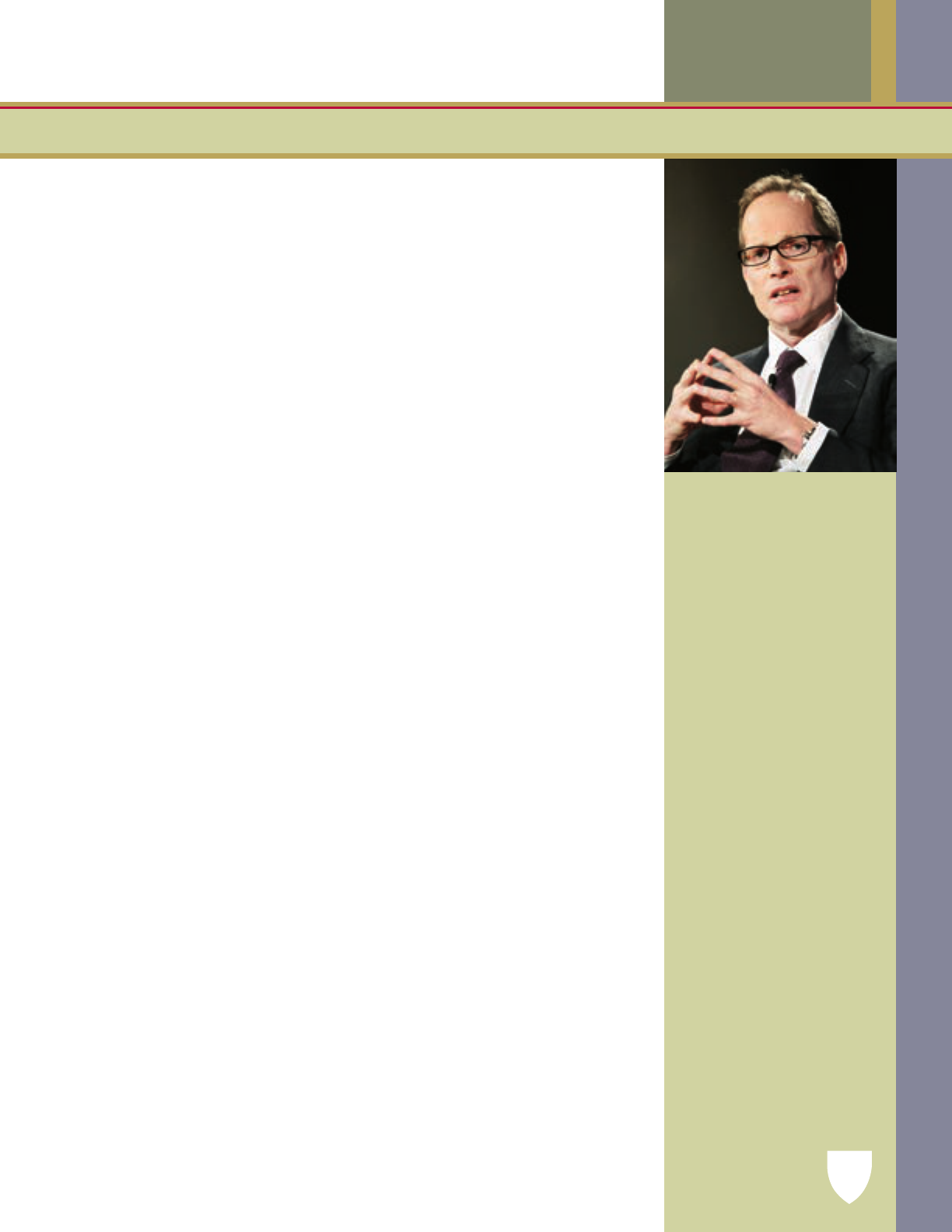
PROFILE BOOK 2013-2014
Dubin Fellows
Harvard Kennedy School
5
Dubin Fellows
Harvard Kennedy School
About Glenn Dubin
G D is Chairman, Chief Executive Ocer and co-founder of
Highbridge Capital Management, an alternative asset management company
founded in 1992. e company has evolved from a multi-strategy hedge fund
into a diversied investment platform that includes hedge funds, traditional
investment management products and credit and equity investments with longer-
term holding periods. Highbridge and its aliates manages approximately $30
billion in capital for many of the world’s most prominent institutional investors
– including pension funds, sovereign wealth funds, endowments and foundations
– and family oces. e rm is based in New York with oces in Hong Kong,
London, Rio de Janeiro and São Paulo and employs (with its aliates) more than
465 people, including over 135 investment professionals.
In 1984, prior to starting Highbridge, Mr. Dubin co-founded Dubin & Swieca
Capital Management, a company specializing in alternative investment strategies
and recognized as a pioneer in employing multi-manager hedge fund portfolios
guided by the principles of Modern Portfolio eory.
In late 2004, J.P. Morgan Asset Management purchased a majority interest in
Highbridge, creating one of the most signicant strategic alliances in the hedge
fund industry to date. In July 2009, J.P. Morgan Asset Management completed
its purchase of substantially all remaining shares of the rm – a transaction that
remains at the forefront of the hedge fund industry’s institutionalization.
As a follow-on to the success of the Highbridge/J.P. Morgan strategic partnership,
in October 2010 Highbridge announced the purchase of a majority interest in
Gávea Investimentos, one of Brazil’s leading alternative investment management
rms. Gávea was co-founded in 2003 by Chairman and Chief Investment Ocer
Arminio Fraga, former President of the Central Bank of Brazil.
Mr. Dubin is a founding Board member and former Board chair of the Robin
Hood Foundation, an organization in New York that applies investment principles
to charitable giving. He is also a Board member of Mount Sinai Medical Center
and the Museum of Modern Art. He serves as a member of the Dean’s Executive
Committee of the Harvard Kennedy School. Mr. Dubin is an alumnus of the
State University of New York at Stony Brook.
Mr. Dubin and his wife have three children and live in Manhattan.
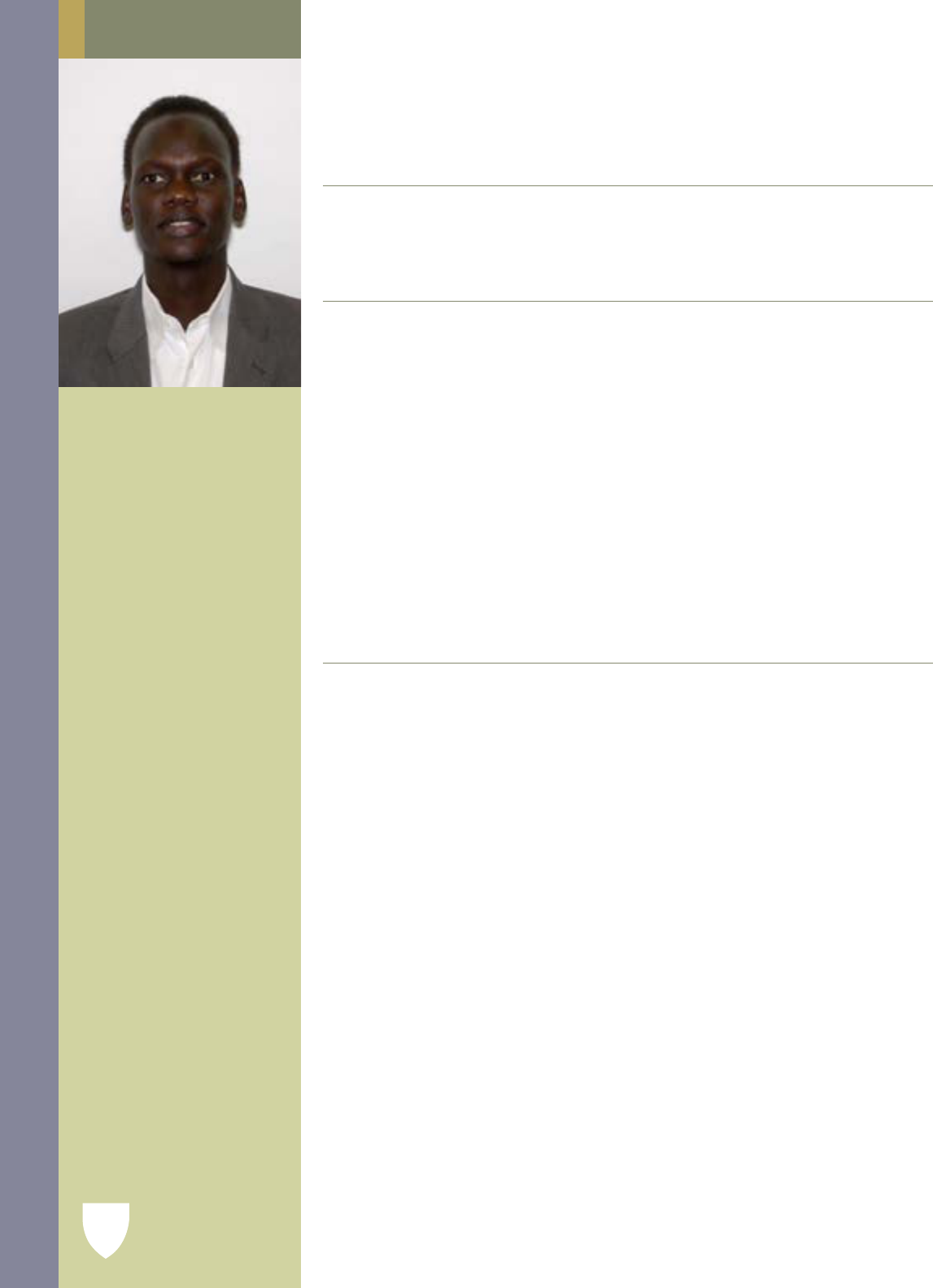
PROFILE BOOK 2013-2014
Dubin Fellows
Harvard Kennedy School
6
DENGMAJOKCHOL
Harvard Kennedy School
Master in Public Administration Candidate
A H
George Washington University, M.B.A. in Global Business Management
Arizona State University, B.S. in Political Science, Minor in Economics
P H
International Finance Corporation (IFC): Consultant on investment climate
advisory services
Ministry of Investment, South Sudan: Consultant on decentralization of
investment climate services; regulatory simplication and investment generation
World Bank: Consultant on private participation in transport infrastructure
projects in low- and middle-income countries
Lost Boys and Girls of Sudan, (USA): Co-Founder and Executive Director
Goodwill of Central Arizona: Manager
International Rescue Committee: Assistant Case Manager
Jonglei Peace Initiative, North America (JPINA): Advisor
Key advocate to the US Congress on the Lost Boys of Sudan Loan
Forgiveness Act
N
I have seen leadership up close and personal: I learned indispensable lessons of leadership
from my father. As the Head Chief of the Nyarweng Dinka clan, he demonstrated
excellence in public service as he presided over governance, social policies, cattle and
land ownership. My parents instilled in me intrinsic values: hard work, honesty, justice,
humility, and resilience. ese qualities have enabled me to overcome the odds of war
and lead my fellow Lost Boys.
My interest in pursuing public service as a career to transform South Sudan is embodied
in my personal experience as a survivor of a 21-year civil war which resulted in more
than 2.5 million deaths and over 4.5 million displaced persons. roughout the 15-
year journey of the Lost Boys of Sudan, I have demonstrated resolute leadership. As
the Executive Director, I spoke about human rights, refugees’ lives, and poverty to
inspire the American public. I helped mobilize more than 3,800 Lost Boys and Girls
in the US, and advocated for a change in the US policy toward Sudan by engaging the
Sudan Caucus, Black Caucus, and Foreign Relations Committee.
My interactions with multilateral agencies have reinforced my passion for public
policy problems. I aspire to contribute to the restoration and transformation of South
Sudan by aecting the approaches, methods, and policies of economic development.
Since 2005, South Sudan has been receiving billions of dollars in oil revenues, but
has experienced only dismal development outcomes. What has emerged instead is a
“consumer elite” that takes in, but produces almost nothing. I intend to be trained as a
practitioner who can develop better policies to manage oil and other natural resources.
e Dubin cocurricular activities will enhance my leadership skills and will present
me with unparalleled opportunities to learn from the world’s most accomplished and
renowned personalities. Similarly, the Dubin Fellowship will provide me with a once-
in-a-lifetime opportunity to join a global network of fellows.
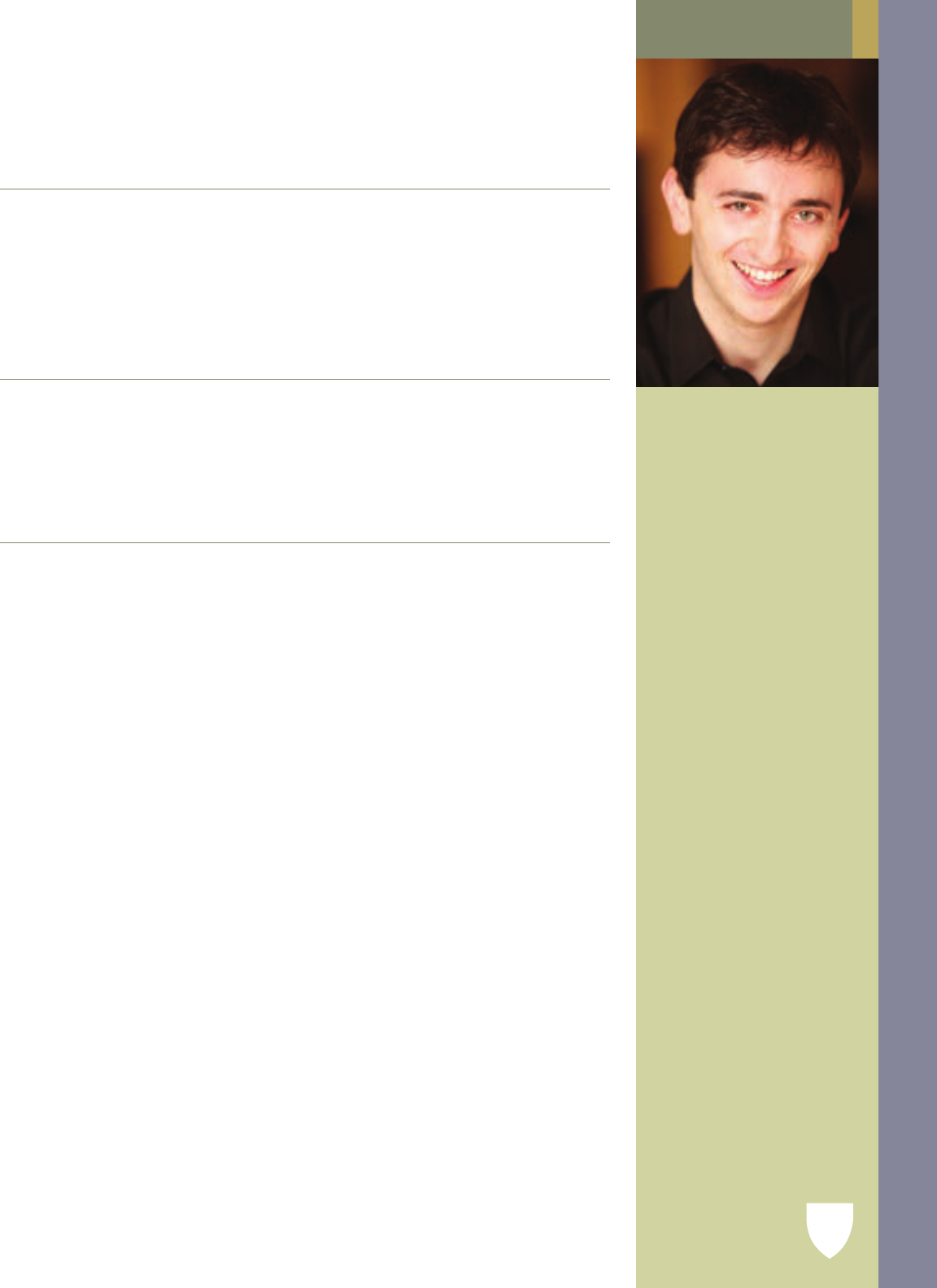
PROFILE BOOK 2013-2014
Dubin Fellows
Harvard Kennedy School
7
MARKDLUGASH
Harvard Kennedy School
Master in Public Policy Candidate
A H
Oxford University, M.Sc. in Refugees and Forced Migration and Criminology
Rhodes Scholar
Swarthmore College, B.A. in Honors Psychology and Education with
Highest Honors, Phi Beta Kappa; Joel Dean Fellow
USA Today Academic All-Star
P H
Americans for Informed Democracy: Social Innovator Award for Smart
Investing
Global Health Forum: Co-Founder and Executive Director
Human Rights Watch, Health and Human Rights Division: Intern
N
As an undergraduate researching depression prevention and bipolar depression at the
University of Pennsylvania, I became fascinated by the question of dissemination: why
is it that so much research conducted in the academy fails to make an impact in the
“real world”? What is needed to translate more research into potentially life-saving
and life-enhancing interventions?
While writing my honors thesis on the topic, I worked on a bednet distribution
program in a Ugandan community of displaced persons and saw rsthand the
devastating impact malaria can have in poor communities. I came to see the failure
to provide cheap medications and anti-malarial bednets to people who cannot aord
them as a salient example of a deadly failure of dissemination. It motivated me to work
at developing strategies that bridge the gap between research and practice so existing
knowledge can more immediately benet people.
My time in Uganda, as well as my experience working at Human Rights Watch and
writing asylum applications for women survivors of sexual assault under the Violence
Against Women Act, made me acutely aware of the challenges facing de facto refugees
and asylum seekers. In order to develop a more nuanced understanding of the complex
legal and political framework underpinning the global refugee regime, as well as
potential avenues for reform, I studied at Oxford University’s Refugee Studies Centre
and Centre for Criminology.
In my career, I hope to work on creating a more humane framework governing the
movement of refugees and helping to end abusive detention processes ranging from
indenite detention with a lack of government or judicial oversight to severe human
rights abuses including torture.
I am incredibly excited by the chance to study at Harvard Kennedy School as a Dubin
Fellow and to take advantage of the opportunities oered through the Center for
Public Leadership. I hope that this experience will make me a more skilled and
eective advocate and leader.
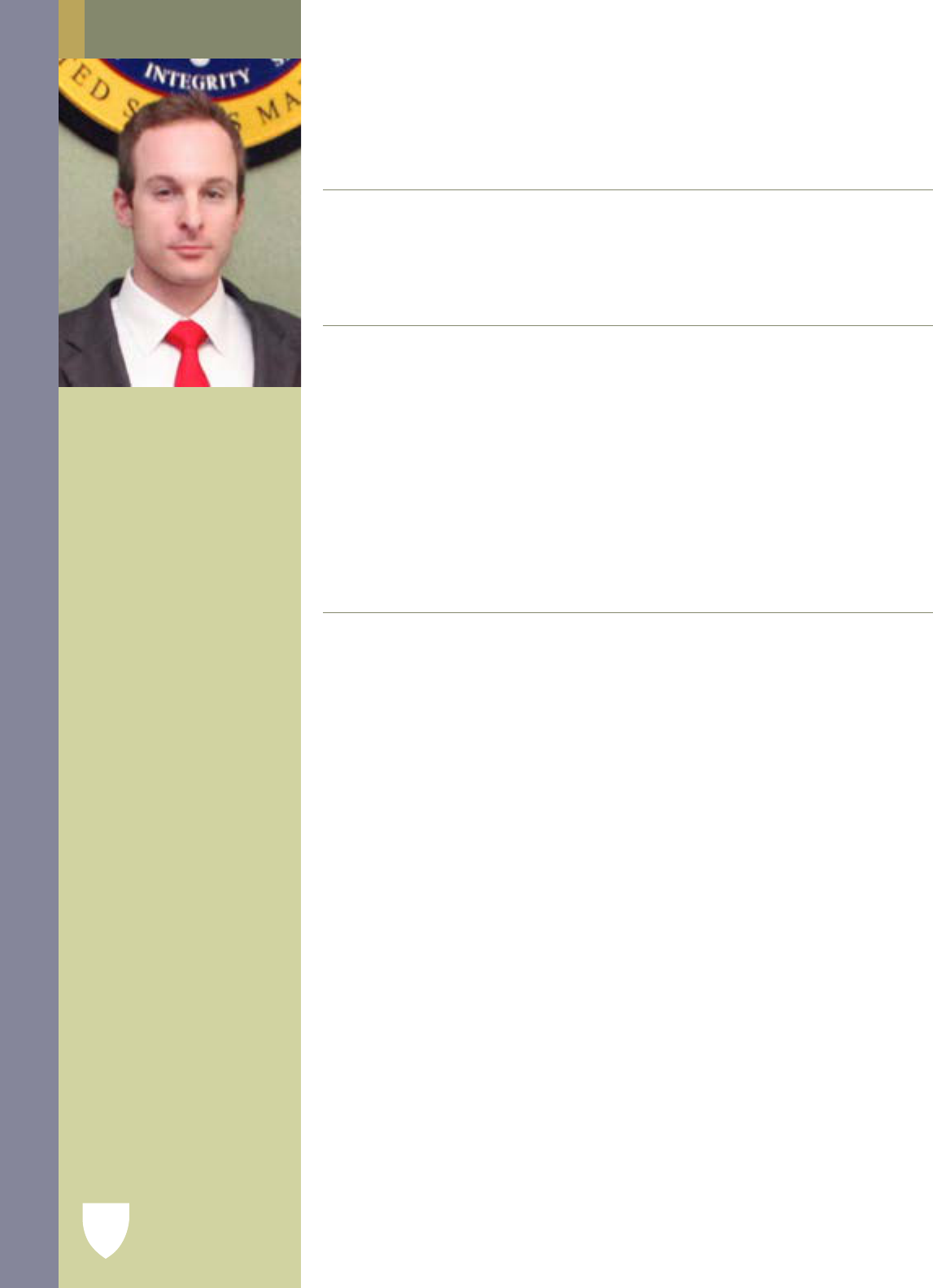
PROFILE BOOK 2013-2014
Dubin Fellows
Harvard Kennedy School
8
JUSTINFREEH
Harvard Kennedy School
Master in Public Administation Candidate
A H
Georgetown University Law Center, J.D. Candidate
United States Naval Academy, B.S. in Political Science, International
Relations Concentration, with Merit
P H
Naval Special Warfare Ocer
Operation Iraqi Freedom and Operation Enduring Freedom: Completed
multiple special operations deployments
Oce of Senator John McCain: Legal Intern
Criminal Division of the US Attorney’s Oce for the Southern District of
New York: Legal Intern
Federal Bureau of Investigation’s Hostage Rescue Team: Student Intern
Assistant Attorney General for the Criminal Division of the Department of
Justice: Legal Intern
N
e tragic events of September 11
th
, 2001 took place when I was a senior in high school.
After witnessing such senseless loss of life perpetrated by individuals who hate the very
freedom America stands for, I felt compelled to serve my country during a time of war.
e Naval Academy prepared me to lead men and women in combat and developed
my moral and ethical qualities to a high caliber. For four years, I prepared for the rigors
of being an ocer in the Navy by striving to better myself both as a leader and as a
warrior. I knew that I would ultimately be responsible for the lives of my fellow service
members. I have always undertaken this responsibility with the utmost seriousness,
and my choice of undergraduate institution was driven by the Academy’s ability to
prepare me to be a leader of character.
Upon graduation from Annapolis, I was selected as a member of the Naval Special
Warfare Community, where I served for ve years on active duty. It was an honor to lead
Navy SEALs on multiple deployments against the Al Qaeda network and other violent
extremist organizations committed to the destruction of the United States. Each time
my team executed a mission against the enemy, we reminded ourselves that our family,
friends, and fellow citizens remained safe in part because of the work we accomplished.
As I transition from the military, I aspire to continue serving our Nation — but in
a dierent capacity. My professional goals are to leverage my military experience
in order to strengthen national security and counter terrorism eorts within the
diplomatic arena. One of my primary passions is merging the real world experience of
returning veterans with the skilled Foreign Service Ocers focusing on the long-term
engagement eort to bring democracy and human rights to places where they do not
exist. e nexus between the Dubin program and the Center for Public Leadership will
further enrich my HKS experience by exposing me to a network of gifted individuals
who feel strongly about public service.
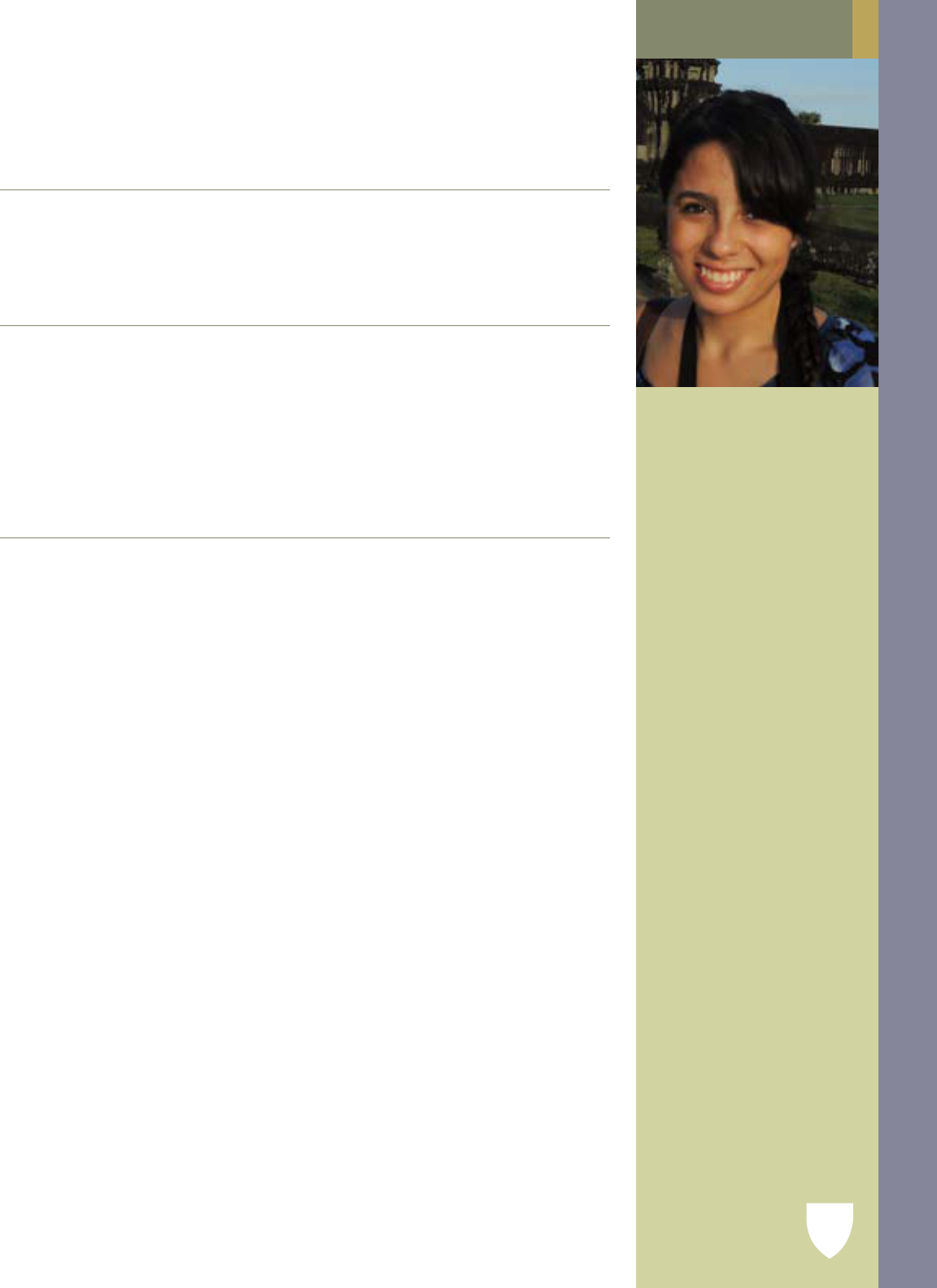
PROFILE BOOK 2013-2014
Dubin Fellows
Harvard Kennedy School
9
SOFÍAHURTADOEPSTEIN
Harvard Kennedy School
Master in Public Administration / International Development Candidate
A H
Centro de Investigación y Docencia Económicas (CIDE), B.A. in Political
Science and International Relations, summa cum laude
Fulbright Scholar
P H
Mexican Agency for International Development Cooperation: Deputy
Director of Policy Planning
National Savings and Financial Services Bank: Consultant on Financial
Education
Innovations for Poverty Action, Mexico: Intern
Oce of International Aairs for the President of Mexico: Intern
N
I grew up in a country of many contrasts. Inequality is one of the most pressing
development problems Mexico faces, and it is an unavoidable part of its citizens’ everyday
lives. is is why I chose at an early age to work towards improving people’s livelihood
in my country. I am particularly interested in the implementation of social policy in
indigenous communities, which represent around 9% of Mexico’s population. With
over 10 million inhabitants, they are the most numerous in Latin America and one of
the most marginalized groups in the country: around 40% live in extreme poverty and
another 39% live below the poverty line.
My stay as a volunteer in an indigenous community in Chiapas was a life-changing
experience and helped me dene my vision of development. It convinced me that the
aim of development strategies should be to ensure that everybody has access to the same
opportunities. is can only be achieved if public policy takes into consideration the
specic and diverse characteristics of each community.
Scholarships, jobs and a bit of luck have given me the opportunity to travel around the
world and see both the deprivations of poverty, which are strikingly similar in dierent
countries, and the possibility of providing fair opportunities to all citizens. I have lived
on three dierent continents and have had the opportunity to discover and contrast
everyday life in many developing and developed countries around the world. ese
experiences have showed me the diverse solutions other communities have found to face
poverty and other development challenges, and have inspired me to continue learning
about good practices and ideas through graduate studies.
I am very excited to study at Harvard Kennedy School since I am certain it oers the
best opportunity for me to broaden my understanding of the complexity of development
challenges and will give me the tools needed to responsibly hold a government position
where I can make a meaningful contribution to poverty alleviation.
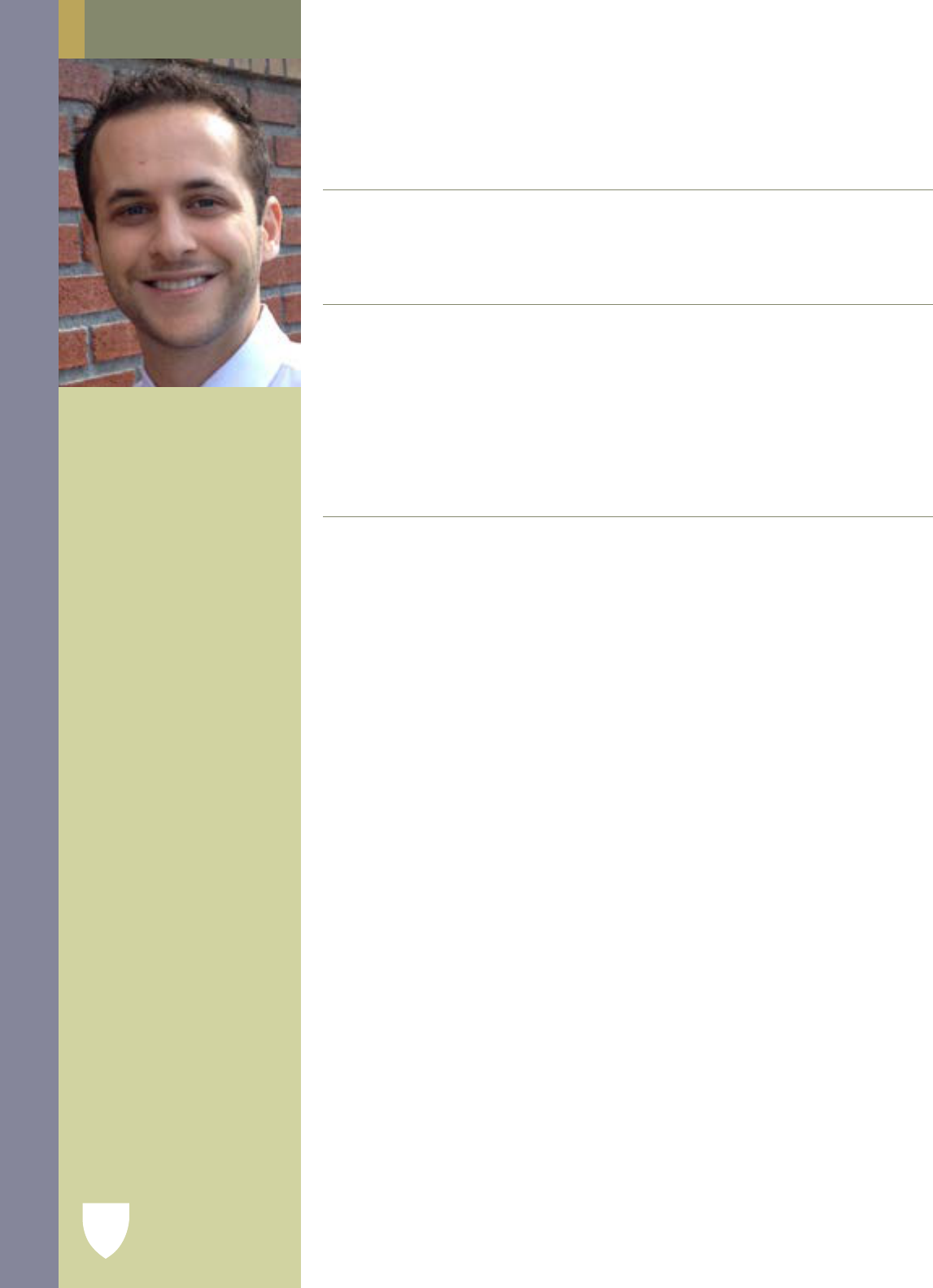
PROFILE BOOK 2013-2014
Dubin Fellows
Harvard Kennedy School
10
MICHAELKLEIMAN
Harvard Kennedy School
Master in Public Policy Candidate
A H
University of Pennsylvania, B.A. in Cinema Studies, magna cum laude
Fulbright Scholar
P H
Righteous Pictures: Co-Founder & Creative Director
Director/Producer of feature length documentaries, e Last Survivor (2010)
and Web (2013)
Best Documentary: 2010 Oxford Film Festival
Special Jury Prize in Documentary: 2010 Dallas International Film Festival,
2010 Indie Memphis Film Festival
N
My road to public policy has not been a traditional one. My undergraduate pursuits were
motivated by a love of cinema. Studying lm at Penn, I realized the important role it can
play in fostering social change. After graduating, I co-founded a production company,
Righteous Pictures, dedicated to creating documentaries that address pertinent social
issues. In 2010, we released our rst lm, e Last Survivor, telling the story of survivors
of four dierent genocides and mass atrocities – the Holocaust, Rwanda, Darfur, and
Congo – as they rebuild their lives in the aftermath of tragedy. In 2011, we launched a
social action campaign that brought the lm to 150 cities around the world.
After completing e Last Survivor, I was awarded a Fulbright Scholarship to begin
work on my second lm, Web. I went to Peru for a year to document the One Laptop
per Child program and the eects of digital technology. I lived in small villages in the
Andes Mountains and the Amazon Jungle as villagers interacted with laptops and
the Internet for the rst time. In addition to these two feature lms, I have produced
various short lms around the world on subjects ranging from transparency and
accountability in government (Uganda and India), access to healthcare (Haiti), and
education reform in the United States.
ese experiences have led me to conclude that as the world has become increasingly
networked, the most eective leaders are those who are able to forge partnerships and
empower like-minded actors around the globe. Critical to this are forums for cultural
exchange that allow us to understand the perspectives of others and recognize our
common goals. I believe that lm can serve as such a forum. My goal in pursuing an
MPP at the Kennedy School is to gain a deeper understanding of policy development,
execution, and evaluation. Armed with these new skills, I hope to continue making
documentaries that allow us to recognize ourselves in one another and spark the type
of collaboration needed to overcome the global issues we face together.
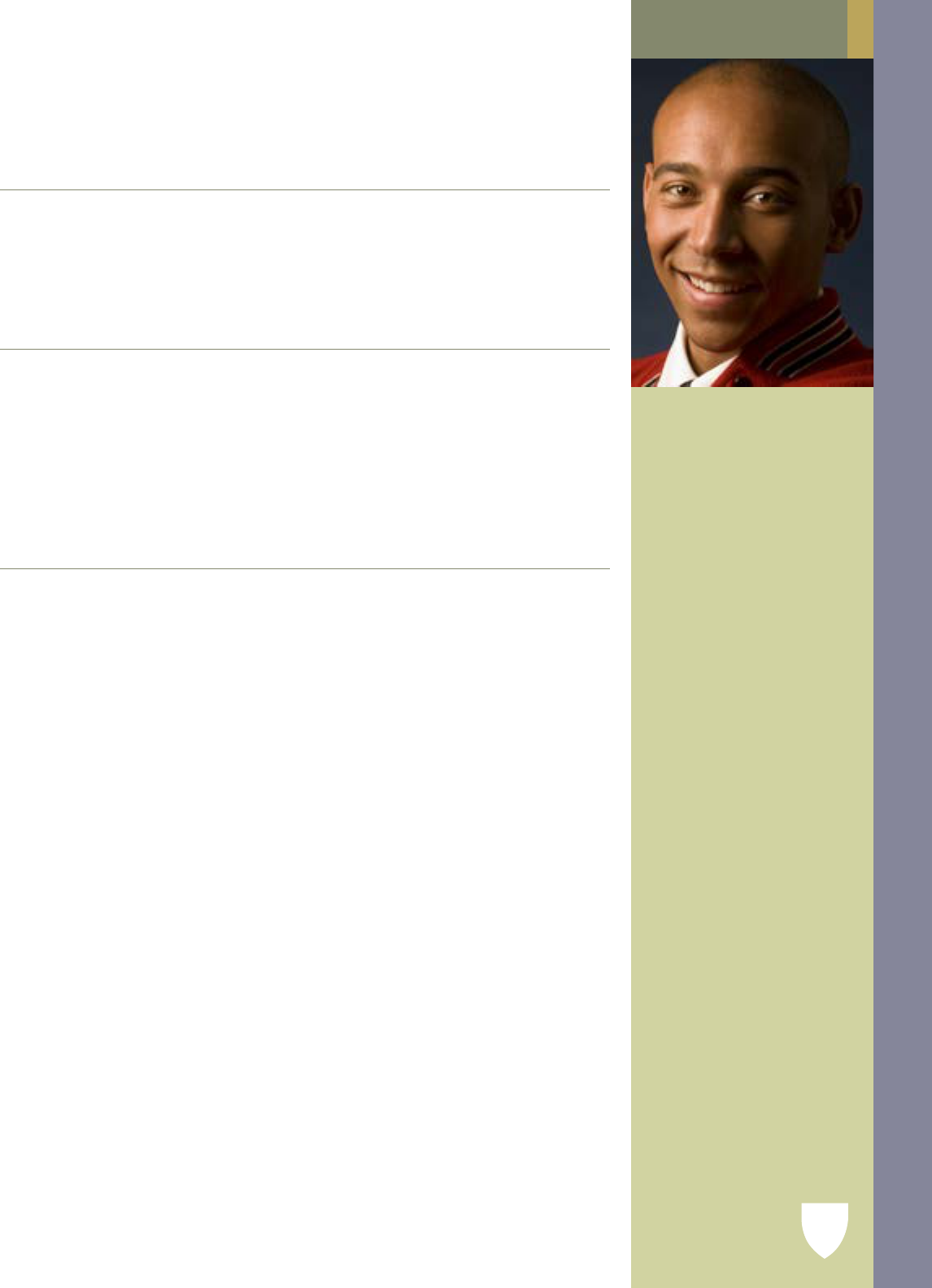
PROFILE BOOK 2013-2014
Dubin Fellows
Harvard Kennedy School
11
ALISTERMARTIN
Harvard Kennedy School
Master in Public Policy Candidate
A H
Harvard Medical School, M.D. Candidate, Harvard Graduate Council
Representative (HMS)
Rutgers University, B.S. in Biological Sciences, summa cum laude
Marshall Scholarship Finalist
P H
weDREAM: Co-founder
e Albert Schweitzer Fellowship
Beth Israel Deaconess Medical Center: Value Stream Mapping Analyst
Crimson Care Collaborative Student Run Clinic: Senior Clinical Sta
Rutgers Tennis 2006-2007 Most Improved Men’s Tennis Athlete Award
Big East Conference Honors Academic All-Star Team Award
N
Not so long ago, I was a high school drop-out from a forlorn New Jersey school, in
a town crippled by unemployment and rife with gang activity. I had been raised by
a strong willed mother, a Haitian immigrant who found herself underemployed and
struggling to support us in an environment that worked against her every eort to
instill in me the dreams she had been forced to defer for herself. With her love, a
good measure of luck, and tennis, a sport I had been introduced to as a teenager while
working as a janitor at a nearby tennis facility, I was able to earn my GED and an
athletic recruitment to Rutgers University.
At Rutgers I found my stride both on and o the court and served as tutor and mentor
for the Oce for Diversity & Academic Success in the Sciences (ODASIS), a program
dedicated to helping disadvantaged students succeed academically. Yet it was my role as
a motivational speaker in the program’s workshops held at the University and at high
schools in the neighboring community that gave me a clearer sense of my potential
as an organizer and leader. At Harvard Medical School, I co-founded weDREAM,
a motivational-speaking and professional mentorship program in community centers
throughout neighboring Roxbury. is gave me me the chance to gain rst hand insight
into barriers to healthcare aecting patients from Boston’s most vulnerable communities.
Because of my experience working with this population I was later selected as an analyst
for a merger project at the Beth Israel Deaconess Medical Center aimed at increasing
access to breast cancer screening modalities in high risk groups.
From these experiences I’ve learned that physician-leaders equipped with a distinct
awareness of the needs of the target population and a keen knowledge of the political
frameworks governing healthcare policy will be critical in ensuring stability at a time
when healthcare reform will do much to improve access for millions of the previously
uninsured, many of whom hail from communities precisely like the one I call home.
I cherish the opportunity to learn and grow as a public service leader in this regard
through my time as a Dubin Fellow at HKS.
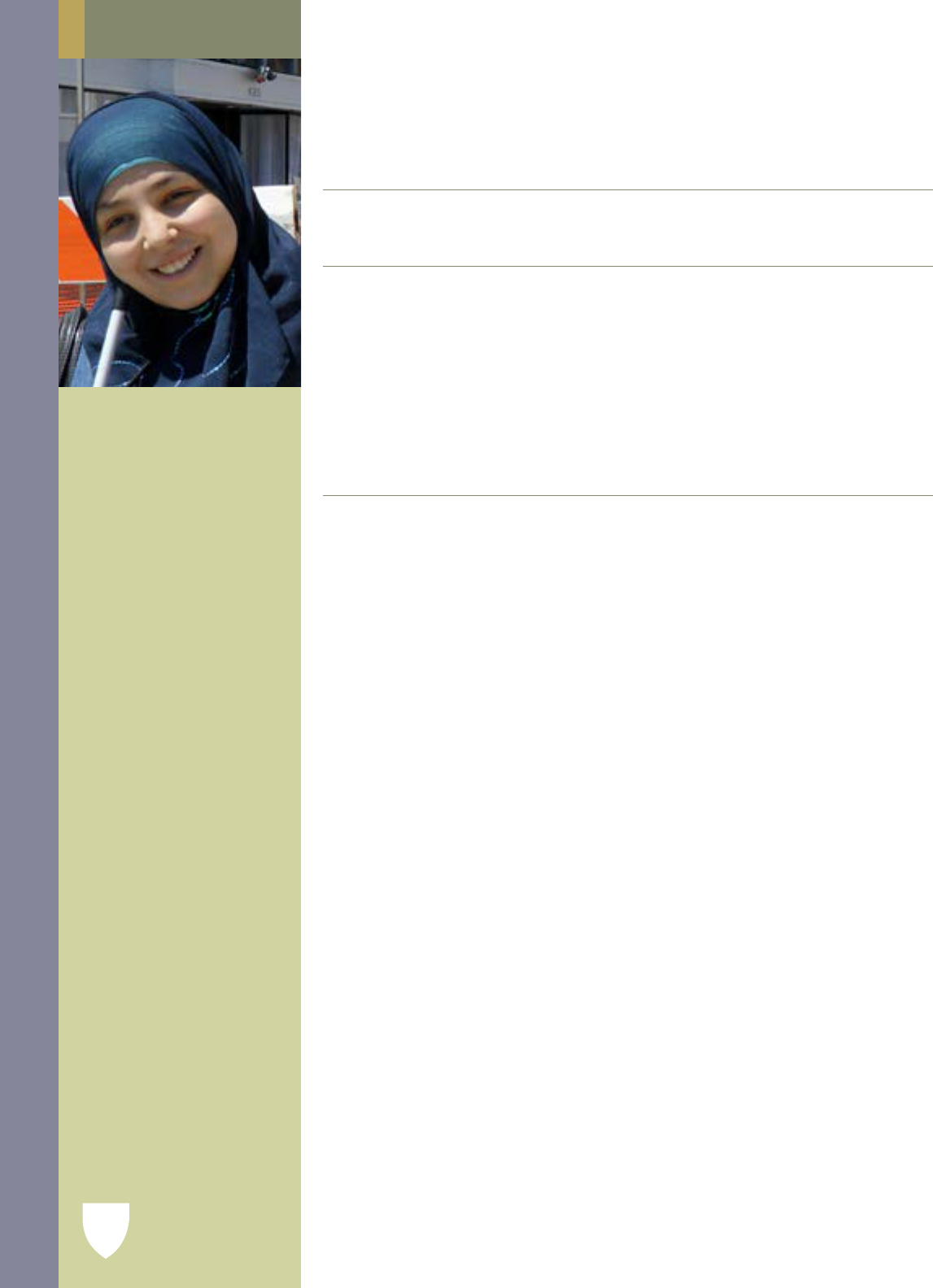
PROFILE BOOK 2013-2014
Dubin Fellows
Harvard Kennedy School
12
SARAMINKARA
Harvard Kennedy School
Master in Public Policy Candidate
A H
Wellesley College, B.A. in Economics and Mathematics, cum laude
P H
Empowerment through Integration: Founder and President
MIT IDEAS Competition: Received team award to design low-cost math
and science tools for blind children in developing countries
Dreams for Kids: Raised $50,000 in grant funding to operate athletic and
leadership programs for disabled youth
Panel speaker for the Clinton Global Initiative (CGI U) 3
rd
Annual Meeting;
Advocacy & Awareness Mentor for the CGI U 4
th
Annual Meeting
N
After being diagnosed with blindness at age seven, I became aware of how dierent
being blind was in a developing country versus a developed one. I was fortunate to
grow up in the US, where the government assists the disabled. A blind person, for
instance, can walk safely across the street because of accessible infrastructure and
public awareness. However, in developing countries like Lebanon, where I spent my
childhood summers, crossing the street is a dangerous task due to cultural stigmas
and lack of government support. After experiencing such disparity in public policy,
integration of the blind has become my life passion.
One of my goals is to make education accessible to the blind. Blind children in
developing countries are discouraged from pursuing math or science largely because
the tools that facilitate learning for the blind are expensive. With funding from the
MIT IDEAS competition, I led a team to develop prototypes for low-cost math and
science tools that could be easily reproduced in any local community.
I also founded Camp Raqi in 2009, which served the visually impaired children
of Tripoli, Lebanon. We focused on instilling condence and independence in our
campers by, for example, teaching them how to walk with canes. Ashamed parents
had chosen not to provide their blind children with canes. Sadly, in shunning one
disability they had introduced another; their children had become completely
dependent, unable to function in society. e campers’ growing condence during
Camp Raqi, however, convinced many of the parents to see integration and
independence as possibilities for their children.
In 2010 I expanded Camp Raqi into a nonprot organization called Empowerment
rough Integration (ETI). A year later, ETI became a 501(c)(3) certied organization.
Although, along with the executive board, I gained the skills to operate a moderately
sized organization, I felt that I needed more education to understand how to be
involved in policy change. I believe that Harvard Kennedy School and the Dubin
Fellows Program will help me grow further as a leader and discover how to best serve
the needs of the disabled populations across the globe.
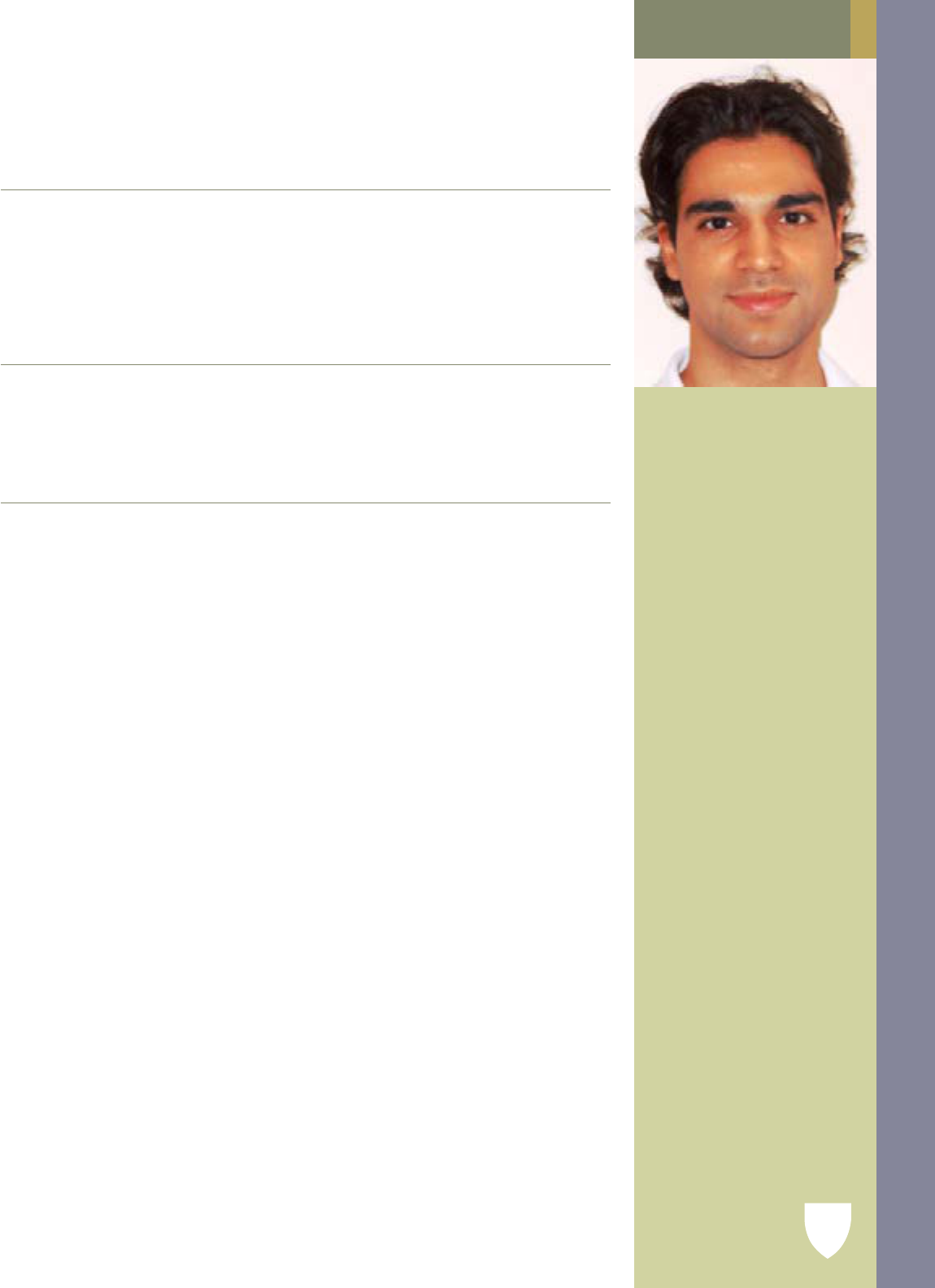
PROFILE BOOK 2013-2014
Dubin Fellows
Harvard Kennedy School
13
FARZINMIRSHAHI
Harvard Kennedy School
Master in Public Policy Candidate
A H
University of Cambridge, Christ’s College, B.A. (Hons) Classics, Triple
First-Class Honours; Sir Ian McFarlane Award for Excellence; Founder and
President of Christ’s College Classics Society
Jelf Medal: King’s College London University award for academic excellence
at Secondary School
P H
Goldman Sachs Foundation: Goldman Sachs Global Leader
Rank Foundation Leadership Award and Rank Foundation Fellowship
Cambridge University United Nations Association (CUUNA): President
N
As an Iranian-Indian, born and brought up in the UK, I have been lucky enough to
straddle dierent cultures and divides, appreciating the tremendous value that one can
derive from being open to each. It has been my long-standing goal to bridge this divide,
fundamentally through public service, but also through the channels of commerce and
business. My application to the Harvard Kennedy School MPP was rooted in this dream:
to equip myself with the best knowledge and networks that proponents of public service
can give. With these, I hope to transform how East and West view each other through
increased dialogue, cultural awareness, and mutual investment.
I have tried to gain as much of a well-rounded education as possible in order to best
prepare myself to full this dream. While at University, I worked in the Russia Section
of the British Foreign and Commonwealth Oce as a policy analyst, and for the last
two years I have worked as a Cross-Asset Financial Analyst on the Goldman Sachs
Trading Floor. Outside of work, I’ve tried hard to lead collaborations which emphasise
inter-faith and inter-cultural awareness. I’m a fellow of the Rank Foundation, a UK
grant-giving Christian Charity; former President of the Cambridge University United
Nations Association, a 1,300-strong international aairs society; and the current
director of “Get Involved,” an initiative sponsored by the Aga Khan dedicated to
bringing together hundreds of members of dierent faith-groups in local community
volunteering projects around the UK.
I am honoured to have the chance to build upon these experiences through the CPL’s
own experiential trips and to be exposed to students, fellows and leaders who can teach
me to meaningfully transform the prospects of those regions—the Middle East and the
Emerging Markets—which I am most passionate about, and whose vast potential, I
believe, remains misunderstood and underexposed.
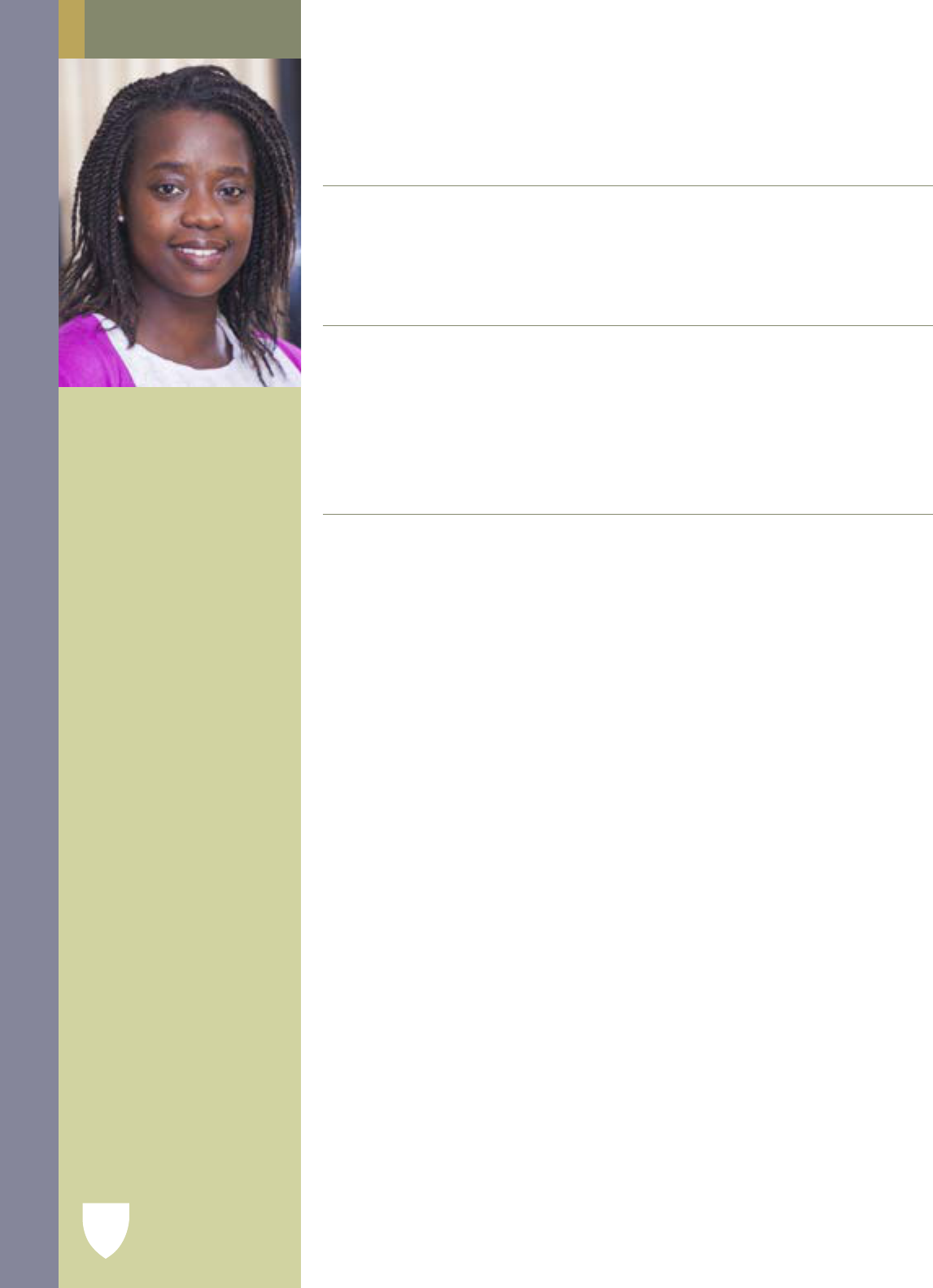
PROFILE BOOK 2013-2014
Dubin Fellows
Harvard Kennedy School
14
AMANDLAOOKOOMBAKA
Harvard Kennedy School
Master in Public Administration / International Development Candidate
A H
Harvard Business School, M.B.A. Candidate
Yale University, B.A. in Economics and International Studies with Distinction
Smith Richardson Fellow for Studies in Grand Strategy, New Haven, CT
P H
McKinsey & Company: Associate (designated) in Lagos, Nigeria and
Minneapolis, MN
e Leadership Institute at Yale: Co-Founder
Smart Citizens, Kenya: Nominated Board Member
Selected as Global Young Leader by the Congressional Youth Leadership Council
N
“Amandla Awethu!” – power to the people! My late mother named me Amandla
to reect my late father’s struggle for a new political dispensation in Kenya. ey
inspired my initial desire to lead a life of transformative public service, but witnessing
the 2007 post-electoral conict in my country (as an election monitor) refueled this
commitment. Seeing Kenya on re – as a result of poor governance, deep rooted
land equity and wealth issues, poverty, ethnic tensions and disgruntlement en masse
at having the right to vote obfuscated – helped me crystallize my own denition of
transformative leadership: giving power to and developing the capabilities of the
people to deliver on change.
I believe that growing private sector resources and capabilities in Africa is key
to incubating the changes we seek in land/equity distribution, poverty et al. ese
benets can “trickle-up” to public governance provided that private sector growth
and development is inclusive, and a concerted eort is made to transfer skills. Most
of my work at McKinsey has focused on performance transformations and building
capabilities to drive step-change improvements in the nances and governance
structures of public and private institutions. From managing a team advising one of the
largest national oil companies in West Africa on cost eciency, to drafting a ve year
strategy to double growth at a Kenyan bank, to designing a nancial architecture for
the Ethiopian government to provide welfare payments to 8 million rural inhabitants,
I feel incredibly privileged to work at the intersection of the public and private sectors
on some of the most pressing issues Africa faces today.
Attending sessions at the 2011 African Leadership Network gathering armed
for me the power of interdisciplinary approaches to public service. e richness
of conversation on subjects like commercial investments in social enterprise could
not have occurred without leaders from the private and public sectors at the same
table. Additionally, pushing the resulting insights to action requires someone with
an operational understanding of both sectors to guide decision-making. I am excited
for the joint MPA-ID / MBA and Dubin experience as the next step on my journey
to drive change for Kenya by further developing my private sector mind alongside
my public sector heart.
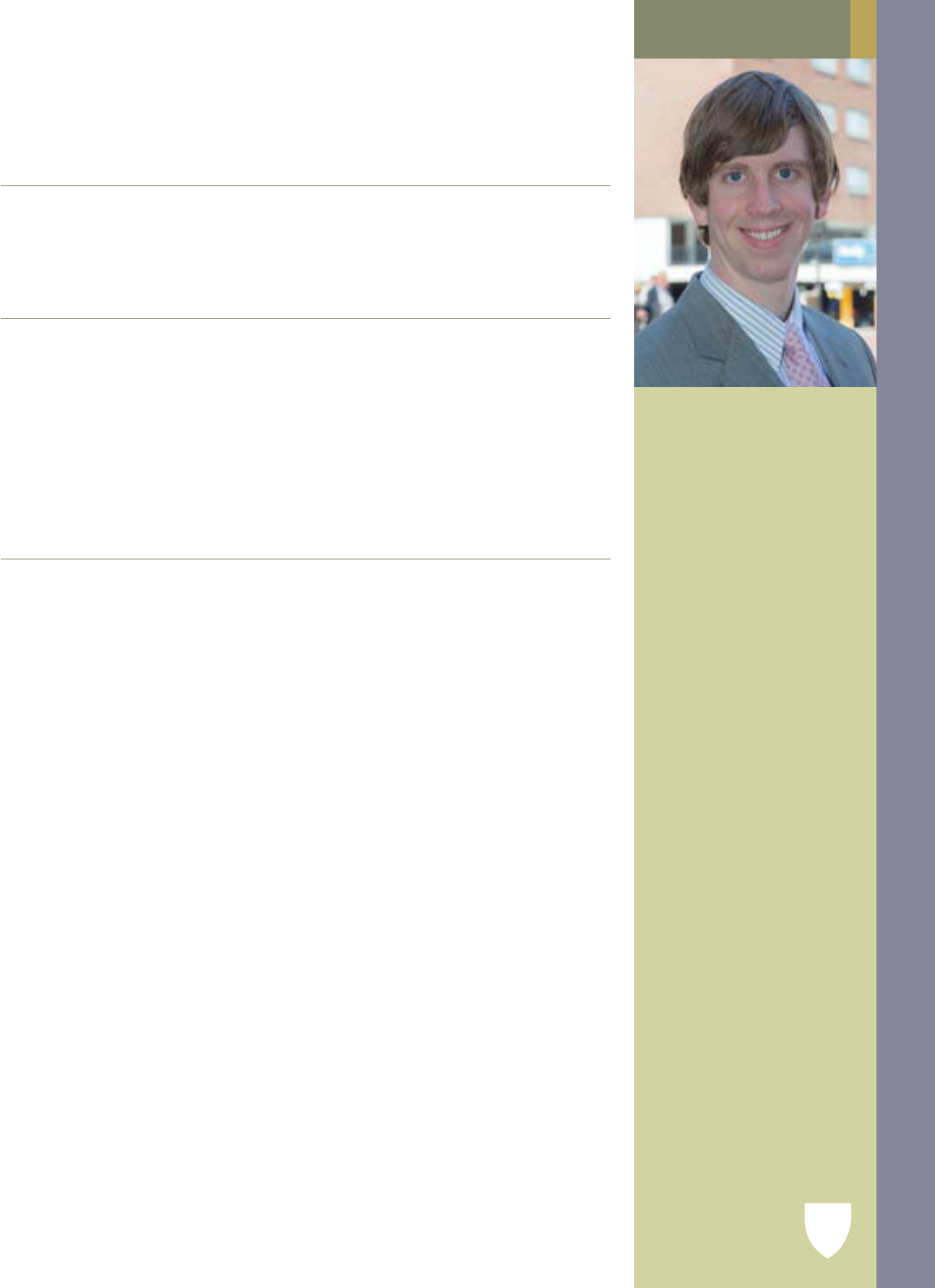
PROFILE BOOK 2013-2014
Dubin Fellows
Harvard Kennedy School
15
ROBERTSWENDIMAN
Harvard Kennedy School
Master in Public Policy Candidate
A H
University of North Carolina School of Medicine, M.D. Candidate
University of North Carolina at Chapel Hill, B.A. in Political Science and
Chemistry with Distinction; Varsity Swimming and Diving Team Captain
P H
Cecil E. Sheps Center for Health Services Research: Health Policy Analyst
Mission Hospitals Ethics Committee Member
Health Policy Interest Group, UNC School of Medicine: Founder and
Co-President
Carolina Leadership Academy: 3-Dimensional Leadership Award
Parkwood Volunteer Fire Department: EMT-Basic
Eugene S. Mayer Community Service Honor Society
N
While race, gender, and socioeconomic status are health care disparities that receive
much attention in the lay press, the disparities across rural communities are often
overlooked. A quarter of the United States’ population lives in a rural area, yet these
regions are served by only 15% of the physician workforce. e shortage of general
surgeons is even greater, with only one of every ten surgeons practicing in a rural
community. ese access to care issues play a major role in patient morbidity and
mortality, and are a driving factor for rising health care costs.
is is why I chose to complete my undergraduate medical education in a rural training
program in Asheville, North Carolina, learning rsthand from clinical innovators in
an underserved part of the state. Rather than studying medicine through traditional,
sequential clerkships, I spent time in each specialty every week. roughout the year I
followed a cohort of patients, acting as their advocate and student-doctor in an attempt
to develop true continuity of care. is “longitudinal” model allowed me to obtain a
unique view of all aspects of our health care system, as well as an opportunity to study
gaps in care faced by patients. ese experiences have strengthened my resolve as a future
surgeon to develop widespread solutions aimed at improving quality and access to care.
Overcoming these systemic obstacles requires leadership, innovation, and commitment
to social change. e ideal candidates to become agents of change in the health care
sector are physicians, who work closest with patients and best understand the language
of medicine. My duty to patients does not end at the bedside or in the operating
room. As a Dubin Fellow at the Center for Public Leadership, I intend to garner the
knowledge and tools necessary to become a physician-leader in the health policy arena.
rough public service, I believe I can be a positive agent of change in our health care
system, improving the lives of patients through better quality care.
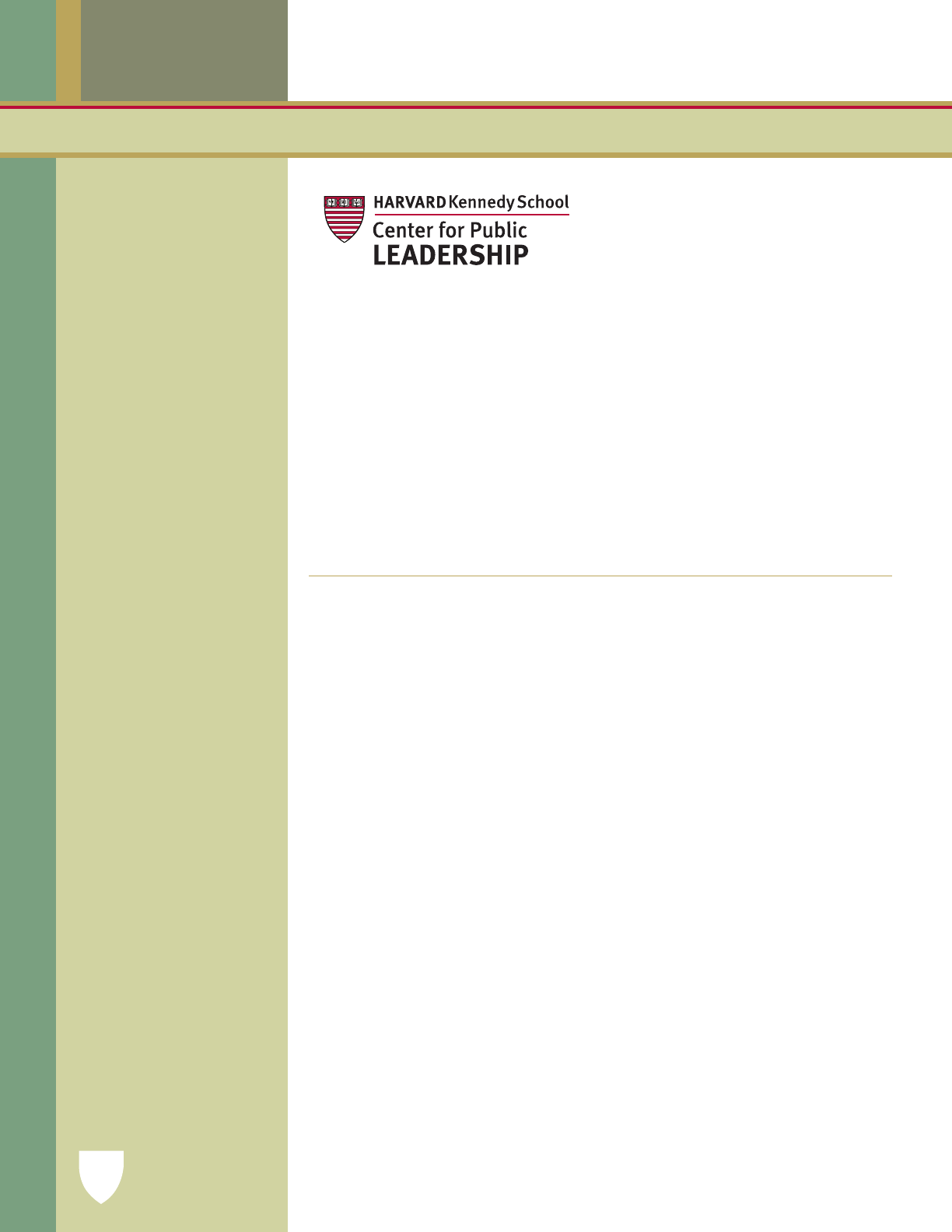
PROFILE BOOK 2013-2014
George Fellows
Harvard Kennedy School
16
T G L F
“Our communities are faced with more and greater challenges than ever before.
We envision this program as one that will help future leaders learn the skills that
will enable them to confront these challenges in innovative ways.”
Bill George
Professor of Management Practice, Harvard Business School
Co-Founder, George Family Foundation
Made possible through a generous gift from the George Family Foundation, the
George Leadership Fellowships support selected students in the joint program
oered through Harvard Business School (HBS) and Harvard Kennedy
School (HKS) with a $10,000 stipend. e fellowships reect the foundation’s
commitment to enhancing public service by investing in character formation and
leadership development.
Fellows are selected based on their demonstrated interest in community and
organizational transformation through public service, activism, and social
entrepreneurship, as well as a commitment to working in two of three designated
areas—the public sector, private sector, and nonprot sector—over the course
of their careers. Special emphasis in the program is placed upon character
development and ethical leadership.
About the George Leadership Fellowship
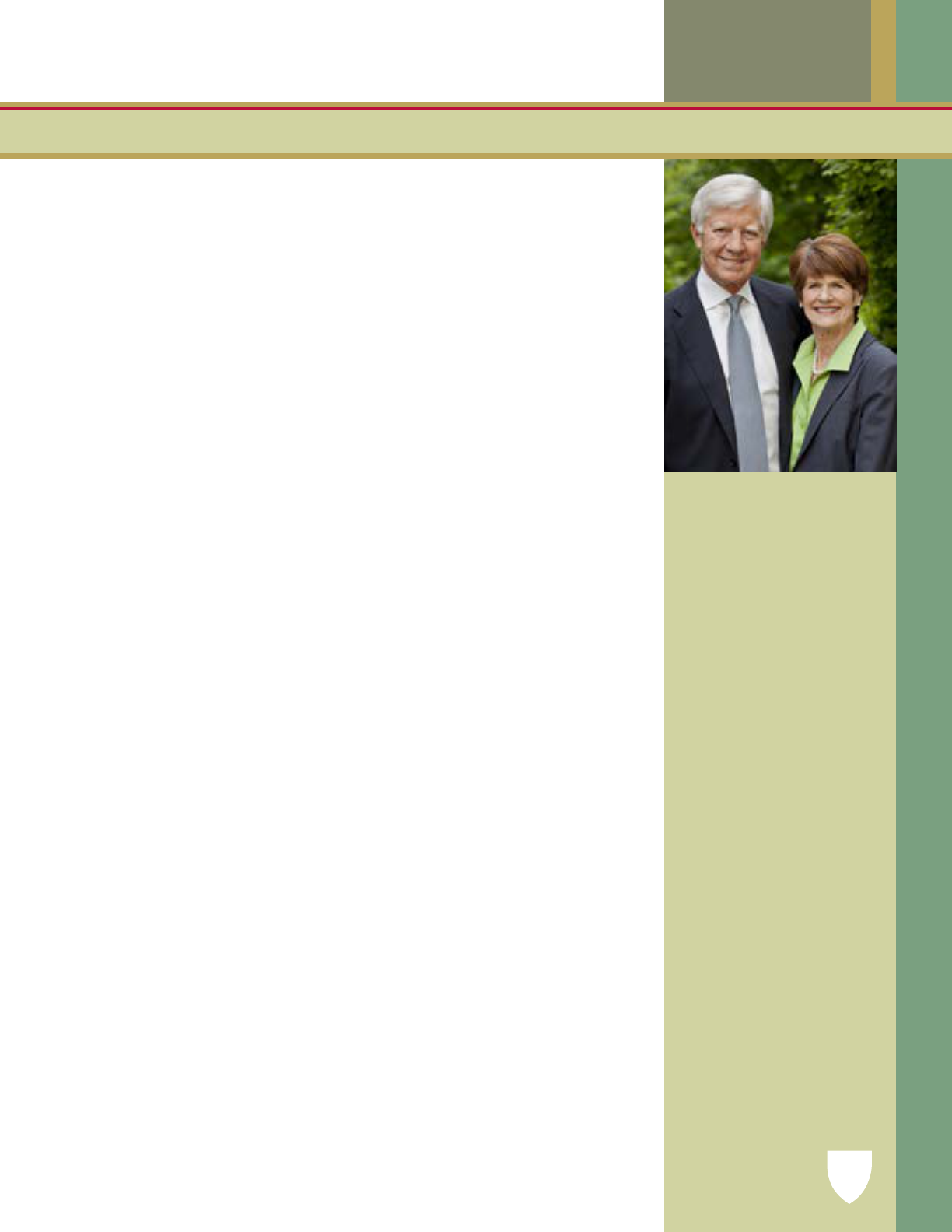
PROFILE BOOK 2013-2014
George Fellows
Harvard Kennedy School
17
About the George Family Foundation
e Minneapolis-based George Family Foundation was established in 1992
by Bill George, now Professor of Management Practice at Harvard Business
School, and his wife, Penny Pilgram George. e Foundation is a grant-making
philanthropy organization funding integrative health & healing, leadership,
spirituality and community.
B G is professor of management practice at Harvard Business
School, where he teaches leadership and leadership development. He is the
author of four best-selling books: 7 Lessons for Leading in Crisis, True North,
Finding Your True North, and Authentic Leadership. Bill currently serves on the
boards of ExxonMobil, Goldman Sachs, and the Mayo Clinic, and formerly
on the boards Novartis and Target. He is the former chairman and CEO of
Medtronic and a 1966 graduate of Harvard Business School. Bill has made
frequent appearances on television and radio, and his articles have appeared
in numerous publications. He was elected to the National Academy of
Engineering in 2012 and has been named one of “Top 25 Business Leaders
of the Past 25 Years” by PBS.
P G is President of the George Family Foundation in Minneapolis
and a leader in the national movement to transform medicine and healthcare
through the principles and practices of integrative medicine. As co-founder
of Sellergren-George Consulting Psychologists, she specialized for more than
twenty years in helping senior executives select for and build high-performing
teams. She is co-founder of the Bravewell Collaborative, a national collaboration
of philanthropists dedicated to advancing the principles and practice of
integrative medicine. Penny George also co-founded what is now known as
the Penny George Institute for Health and Healing at Abbott Northwestern
Hospital in Minneapolis, the George Institute is the largest hospital-based
integrative medicine program in the country. Her leadership in philanthropy has
been featured in the Chronicle of Philanthropy, the Minneapolis Star Tribune, and
Compass, the journal of the Center for Public Leadership at Harvard University.
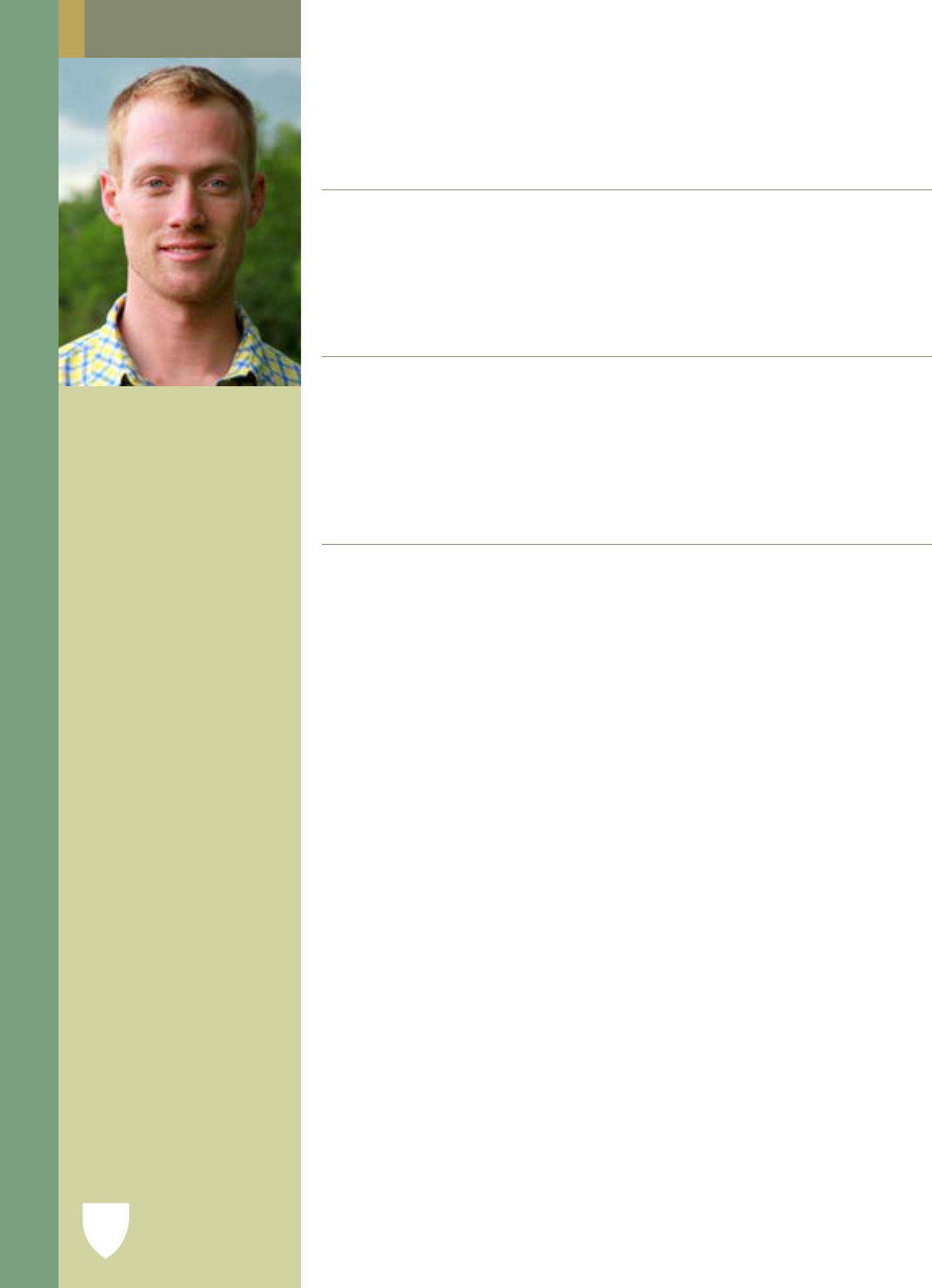
PROFILE BOOK 2013-2014
George Fellows
Harvard Kennedy School
18
PETERBROOKS
Harvard Kennedy School
Master in Public Policy Candidate
A H
Harvard Business School, M.B.A. Candidate
Harvard College, B.A. in Government with High Honors
Fulbright Scholar: Rajasthan, India
Zuckerman Fellow (2011-12)
P H
Xylem Inc.: Summer Associate, Corporate Strategy
Aspen Institute, Impact Careers Initiative: Co-founder/Director
New York City Veterans Career Center: Consultant
United States Marine Corps, 1st Battalion, 7th Marine Regiment:
Captain, Infantry Ocer
N
Before I ever set foot in Iraq I spent four years in college at Harvard studying warfare
and counterinsurgency in the classroom. As a Marine Ocer-in-training in 2006
– the height of violence in Iraq – my interest in war was as much professional as
academic. But the challenges I actually faced in Al Al Anbar Province, Iraq as an
infantry platoon commander were broader than mere security and stability operations;
working to improve Iraqi politics, economic development, and rule of law strained my
capabilities as a 24-year-old lieutenant in ways I never expected.
Even as my battalion provided security, I couldn’t shake the feeling that we were ill-
equipped to provide the Iraqis with what they needed most: education, functioning
courts, economic opportunity, and basic services. Our inability to help the Iraqi
government deliver drinking water was a particularly vivid failure, one which, years
later, led me to research fresh water policy as a Fulbright Scholar in Rajasthan, India.
Water lies at the nexus of many of the great challenges of the future: energy, agriculture,
public health, diplomacy, environmental degradation, and climate change. I have spent
the last two years at Harvard examining how policy and business tools can improve
our stewardship of fresh water resources while also expanding aordable access to
reliable fresh water in the developing world. My career will begin in the global water
technology sector after which I hope to serve in government, addressing national
security challenges that emerge from natural resource depletion.
Parallel to my career, I plan to nd ways to serve my other two passions: encouraging
more talented young people to devote their early careers to public service and
improving military veteran services. I look forward to a rewarding year as a George
Fellow that I know will expand my ability to serve these causes across the public,
private, and not-for-prot sectors.
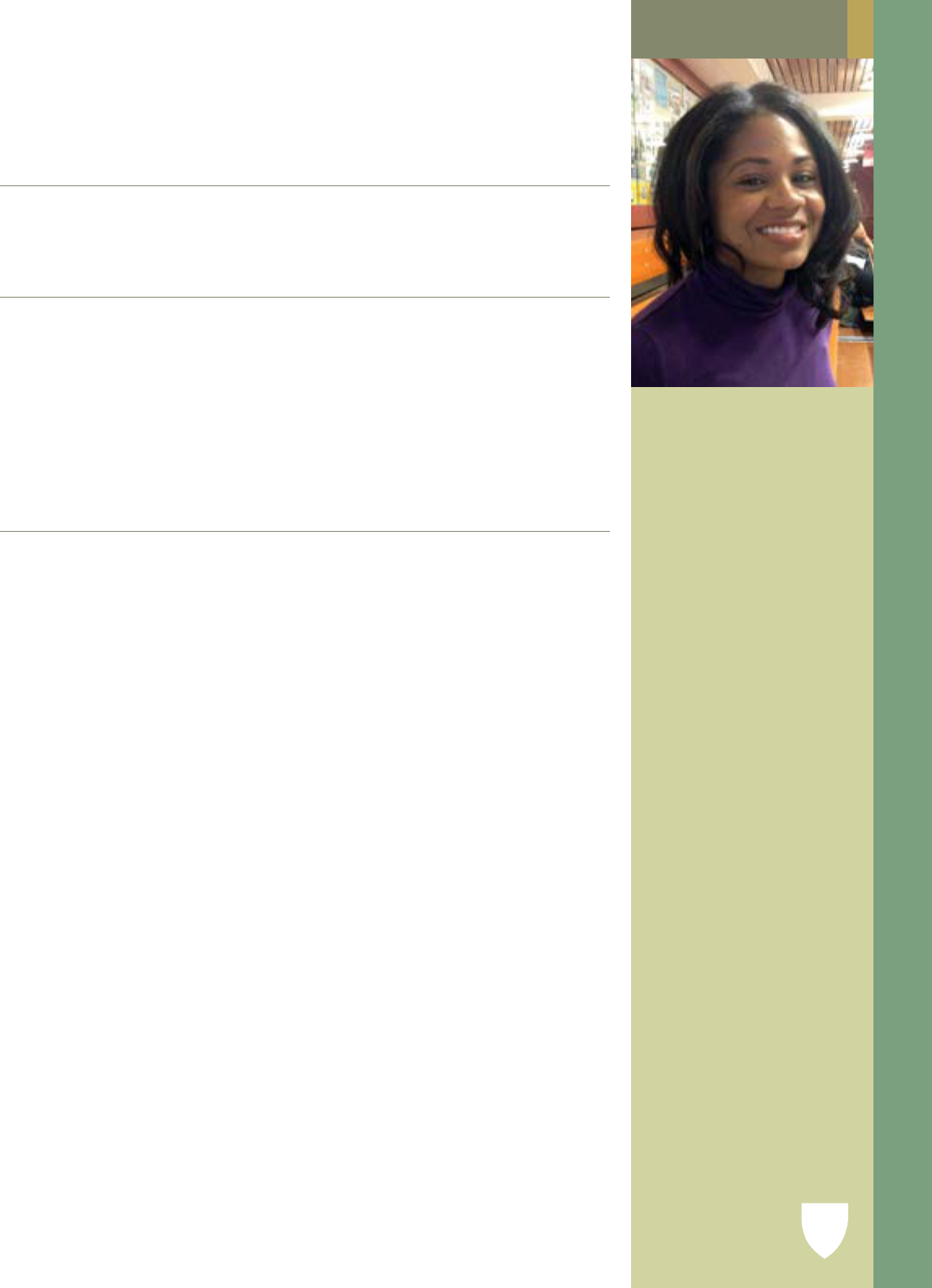
PROFILE BOOK 2013-2014
George Fellows
Harvard Kennedy School
19
RONIESHA L.COPELAND
Harvard Kennedy School
Master in Public Policy Candidate
A H
Harvard Business School, M.B.A. Candidate
Howard University, B.B.A. in Marketing, summa cum laude
P H
Oce of Mayor Kevin Johnson: Mayoral Fellow, Ash Center Summer
Fellowship in Innovation
McMaster-Carr Supply Co.: Project Manager
Fannie Mae: Business Analyst
Management Leadership for Tomorrow: Fellow
Delta Sigma eta Sorority, Inc.: Eastern Regional Representative and
National Executive Board Member
N
As the daughter of two small business owners, I inherited my parents’ entrepreneurial
spirit. Additionally, growing up in the Detroit area, I witnessed disparities in opportunity
due to socioeconomic dierences. I realized that I was an anomaly—blessed with
parents who, despite not graduating from college, made sure that I attended good
schools and participated in developmental activities that positioned me for future
success. I also saw my parents use their business to create employment opportunities
for individuals who struggled because of their educational or criminal background.
eir example underpins my desire to have a business career with a social impact.
Furthermore, they inspired my desire to develop policies that create opportunities for
disadvantaged communities and enable anyone to reach their full potential.
ese experiences led me to Fannie Mae after undergrad, as I hoped to create housing
opportunities for those who would otherwise lack access to home ownership. ey also
sparked my commitment to children. From running a summer camp out of my home
in Detroit, to mentoring low-income middle school girls in Chicago, to developing an
arts and leadership education program for an elementary school in DC, I have spent
most of my life working to positively shape the lives of children.
HKS and HBS have only deepened this commitment and made the need more real
to me. ey have broadened my interest in education, motivating me to explore
ways to impact children’s lives through both policy and business. I plan to leverage
both academic experiences in developing educational products and experiences for
children as well as working with elected ocials to improve public education and
shape social and economic policy.
e George Fellowship will support my continued development as an eective multi-
sector leader. In particular, it will hone my ability to not only work in both business
and government independently, but to also successfully bridge the chasm between the
two sectors, fostering sound policy making and necessary cross-sector collaboration.
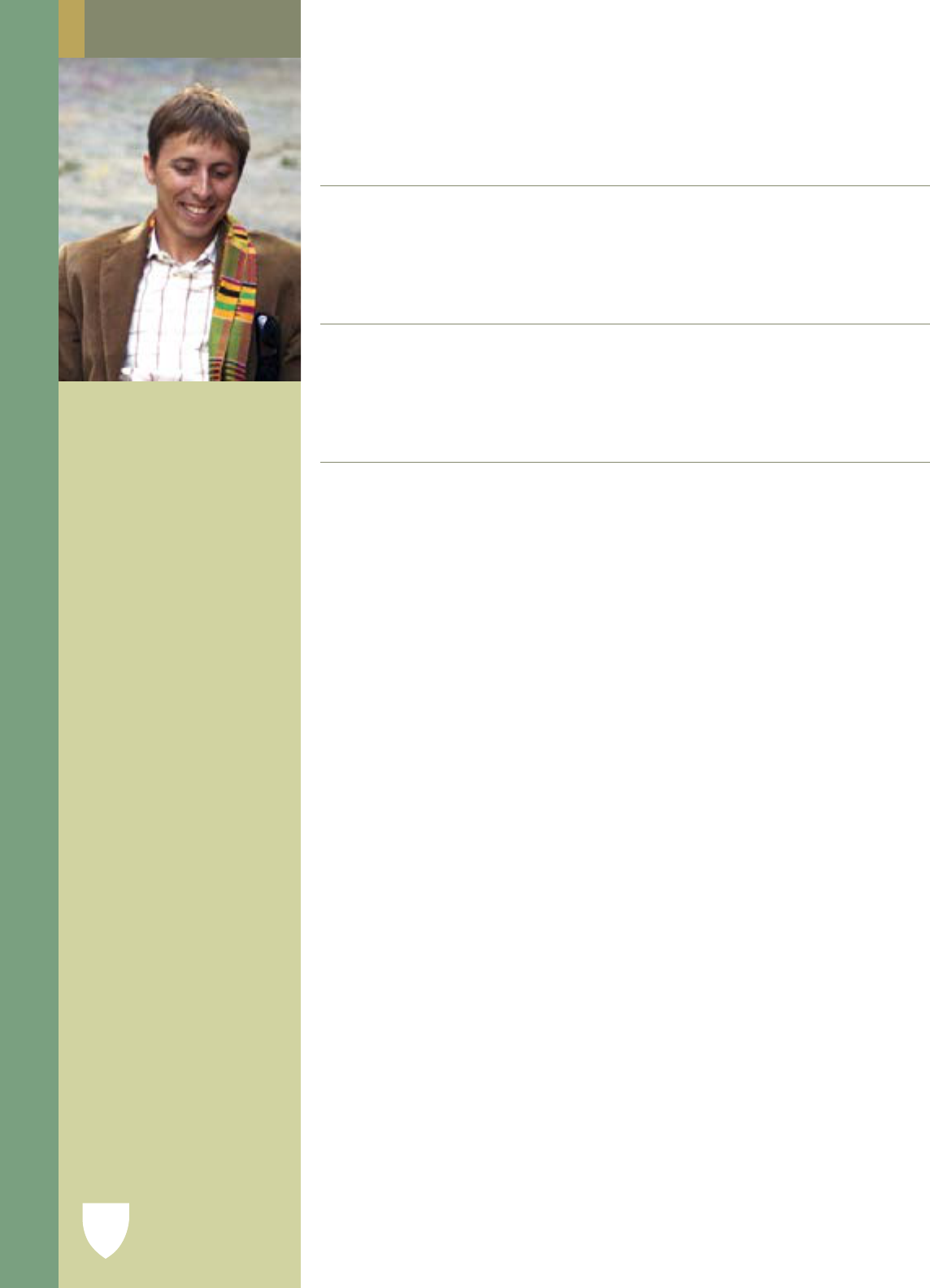
PROFILE BOOK 2013-2014
George Fellows
Harvard Kennedy School
20
JAMESDYETT
Harvard Kennedy School
Master in Public Policy Candidate
A H
Harvard Business School, M.B.A. Candidate
Harvard College, A.B. in Social Studies
Zuckerman Fellow (2011-2012)
P H
Global Environment & Technology Foundation (GETF): President
White House National Economic Council: Summer Intern
Imagine H2O: Global Partnerships Coordinator
N
After college, inspired by my father’s service in the Peace Corps in Senegal, I joined
Global Environment & Technology Foundation (GETF), a non-prot focused on
developing and managing cross-sector partnerships to increase access to safe water and
sanitation on the African continent.
While at GETF, I had the opportunity to lead the capital campaign to help WaterHealth
International (WHI), an innovative, venture-backed social enterprise, enter Africa. It was
through this experience that I saw the potential for entrepreneurial business models to
achieve unique, powerful social impacts. In the case of WHI, by charging a small amount
for safe water, they could aord to sustain the service (in contrast to the history of failed
charitable water projects on the continent) and by creating a compelling investment
opportunity, the company could access the capital markets and reach scale rapidly. It was
this experience that convinced me to pursue an MBA so I could learn more about how
to build and lead great mission-driven companies.
In addition to social entrepreneurship, I’m also passionate about economic policy. e
joint-degree program has allowed me to think about how these interests can complement
one another. Last summer, I interned at the White House and noticed that while many
people working in government have business backgrounds, they tend to come from
larger institutions – management consulting rms, investment banks, and Fortune
500 companies. Our public institutions can benet tremendously from the skills of the
entrepreneurial community – the ability to communicate a vision, pivot quickly, and
work on a tight budget. I believe there’s an opportunity to bridge this gap.
Moving forward, with the help of my fellow HBS and HKS students and peers in the
George Fellows program, I hope to lead and grow mission-driven businesses and make
a dierence as an advisor, manager, or elected ocial in government.
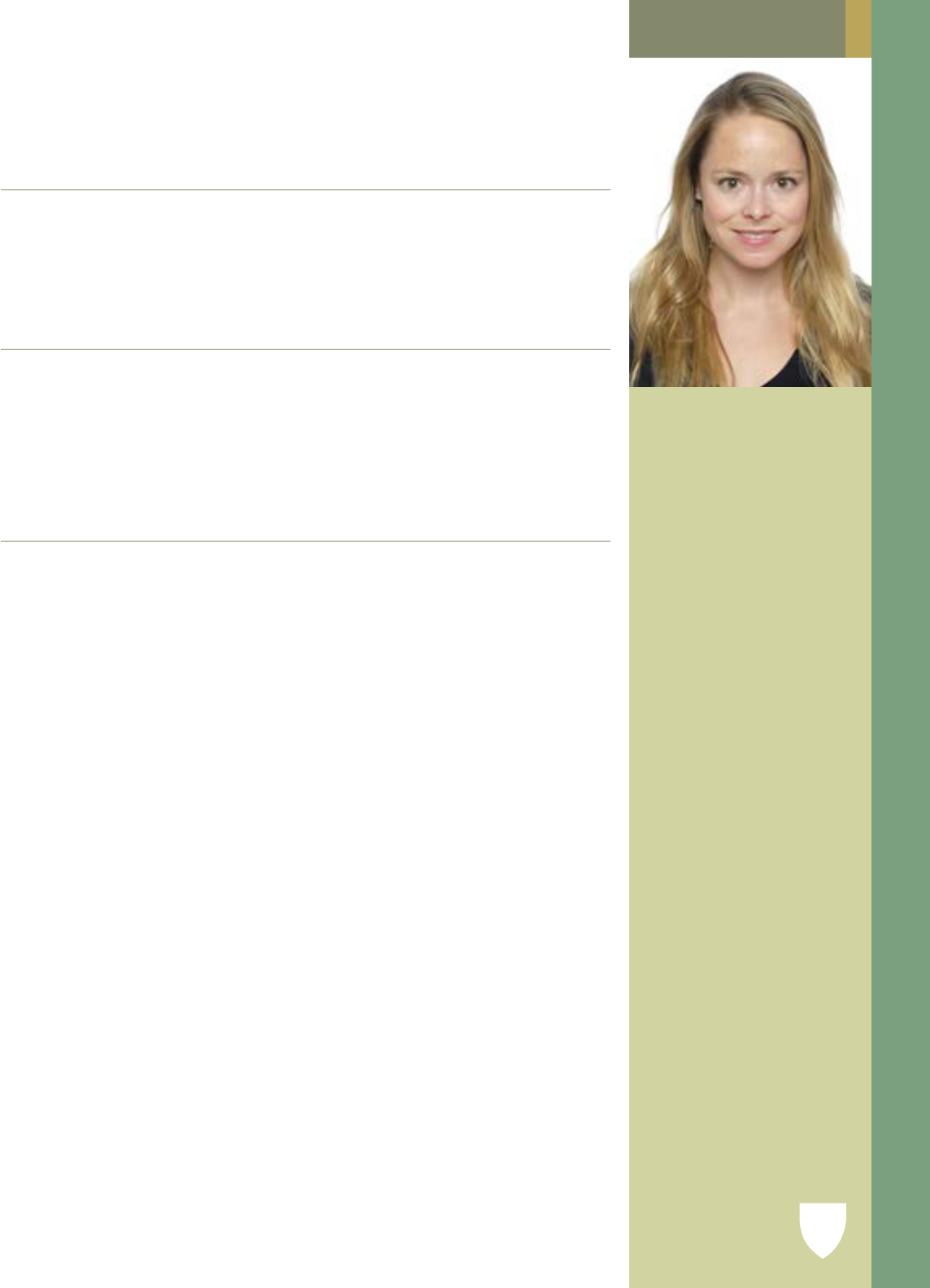
PROFILE BOOK 2013-2014
George Fellows
Harvard Kennedy School
21
PAIGEFITZGERALD
Harvard Kennedy School
Master in Public Policy Candidate
A H
Harvard Business School, M.B.A. Candidate
HKS/HBS Joint Degree Leadership Council Co-President
University of Pennsylvania, B.A. in Economics and Environmental Studies
with Honors; Benjamin Franklin Scholar
P H
United States Department of Energy: Special Assistant to the Deputy Secretary
Project Dharma, New Delhi, India: Advisor to the CEO
Blue Engine Message & Media: Consultant
Barack Obama’s Presidential Campaign: Director of Surrogates
Hillary Clinton’s Presidential Campaign: Advance Director for Chelsea Clinton
N
Before enrolling in the Joint HBS/HKS Degree Program, I spent several years working
in policy and politics in Washington, DC. I was attracted to this path by the potential
to inuence change on a national and even global scale, a motivation that continues
to shape my professional decisions. I started out working in the communications shop
of the think tank the Center for American Progress and then went on to serve on
the 2008 presidential campaigns of both Hillary Clinton and Barack Obama. After
the election, I worked for the Obama Administration in several capacities, most
recently working directly with Deputy Secretary Daniel Poneman at the Department
of Energy. In this capacity I was able to participate in US foreign policy creation on
issues ranging from renewable energy to nuclear non-proliferation. Witnessing the
diverse players implementing foreign policy illustrated to me that addressing some of
the most pressing problems facing our society requires solutions that span both the
public and private sectors.
e conviction that solving complicated problems necessitates employing best practices
from across sectors was rearmed this past summer while I was working for Project
Dharma, a for-prot social enterprise in New Delhi, India. Analyzing growth options
for this startup focused on distributing economic development goods to India’s bottom
of the pyramid consumers reinforced that combining cross-sector resources is the most
eective strategy to deliver ecient solutions.
With the help of the HBS/HKS Joint Degree Program, I hope to position myself to
similarly mobilize both public and private resources to address some of the critical
problems facing our society. I am honored to be a George Fellow and am excited to
leverage this talented fellowship cohort and the wider Joint Degree community in an
eort to nd integrated solutions to global challenges.
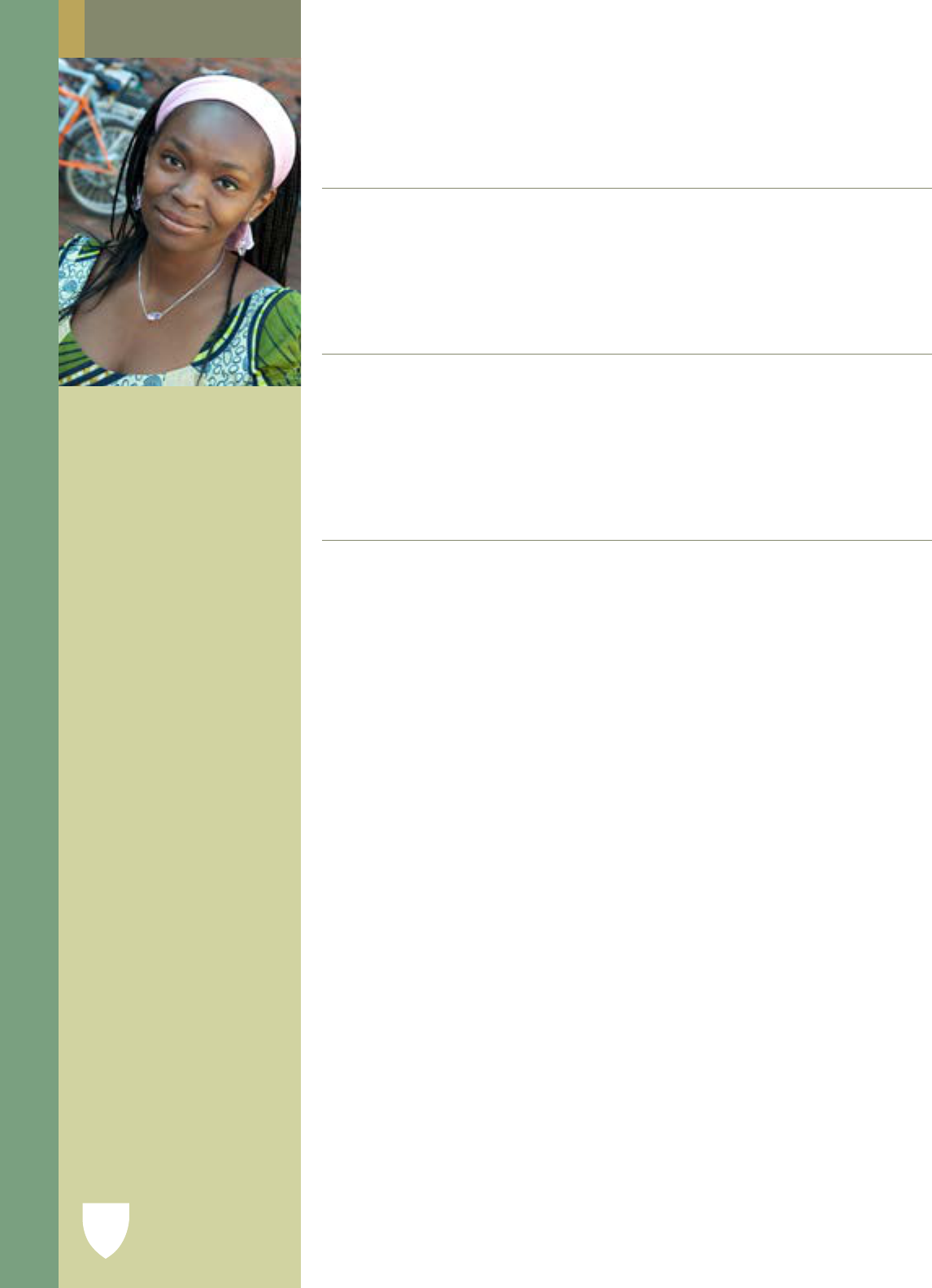
PROFILE BOOK 2013-2014
George Fellows
Harvard Kennedy School
22
LAYUSAISAODIDI
Harvard Kennedy School
Master in Public Administration / International Development Candidate
A H
Harvard Business School, M.B.A. Candidate
Harvard University, A.B. in Social Studies, cum laude
David M. Rubenstein Fellow
John H. McArthur Fellow
P H
Harvard Business School: Social Enterprise Fellow
Nigerian Ministry of Trade and Investment:
Small and Medium Sized Enterprise Initiatives Intern
Open Capital Advisors: Summer Fellow
e Boston Consulting Group: Associate
N
Coming from Nigeria, a country where much remains to be done in terms of poverty
alleviation, rights protection, and infrastructure development, among other things, I have
always been drawn to work in the non-prot sector and international relations. In high
school, I was president of both my high school’s Amnesty International and War Child
Canada chapters, and during my college career, I completed summer internships with
the 14th International AIDS Conference and the Canadian International Council, a
foreign policy think-tank. However, up until graduation, I was unsure about where I
would focus in the long run. To my surprise, it was only after joining the private sector
as a management consultant with the Boston Consulting Group that I began to hone in
on how I hope to make my contribution to the world.
I believe that the small and medium-sized business sector represents a growing, and –
until recently – largely neglected, space in development across the world. I am interested
in designing and eectively implementing policy aimed at encouraging entrepreneurship
and removing barriers preventing the scaling-up of small business in developing
economies. While I have been led to this eld by my sense of duty as a Nigerian citizen,
I believe that focusing on SMEs, which are often the most responsible for the creation
of jobs and products targeted at the poorest segments of the population, can unlock
economic and social development in many other countries.
As for my long-term goal, it is dicult to set a minimum or maximum. Simply put, I
hope to get as close as possible to inuencing policy in this area at the highest levels,
whether in Nigeria or on the international stage. To that end, I am excited to leverage my
participation in the George Fellowship Program, as well as my work at HKS and HBS
to prepare myself to seize the relevant opportunities as they appear.
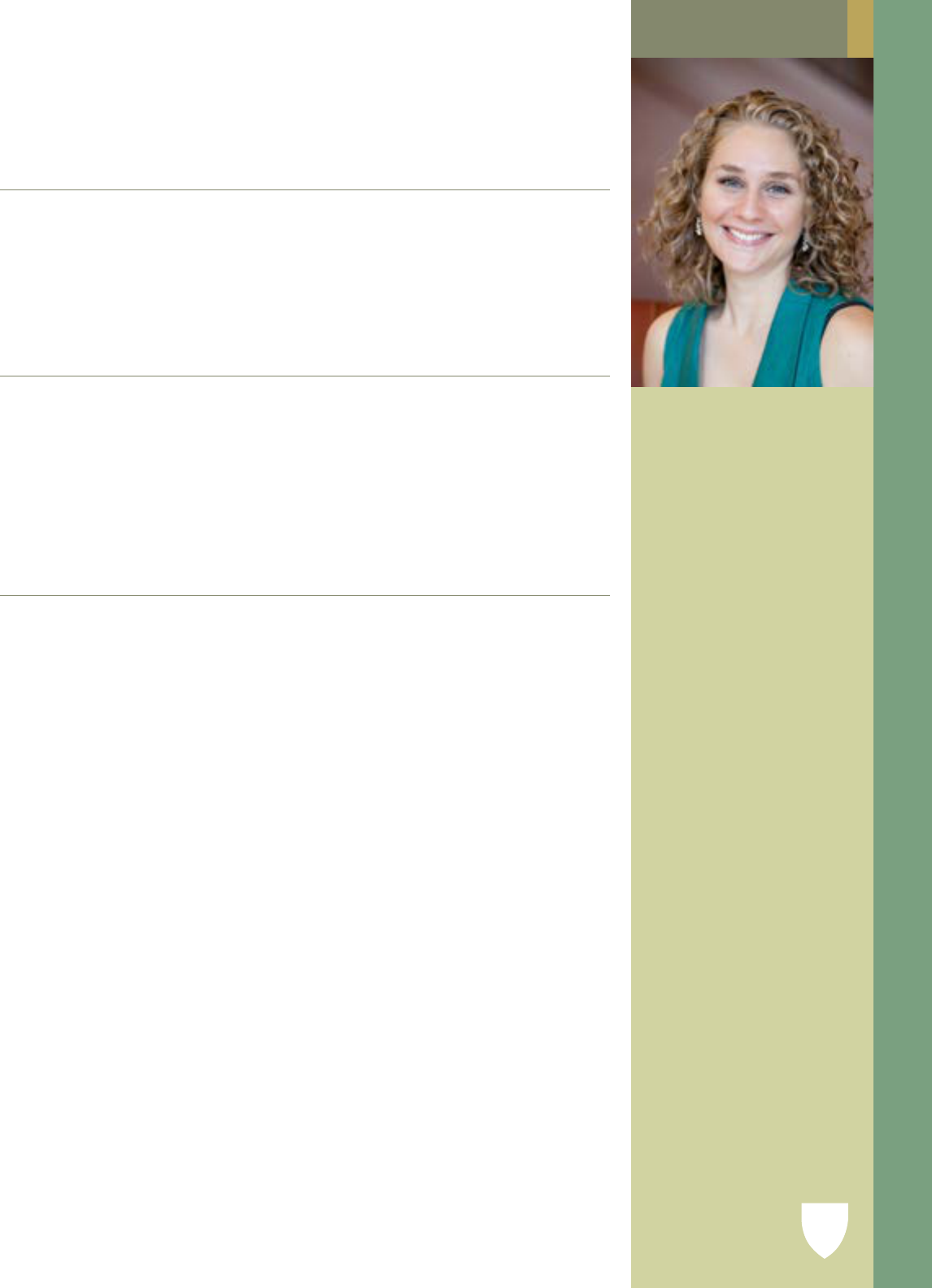
PROFILE BOOK 2013-2014
George Fellows
Harvard Kennedy School
23
ELEANORJOSEPH
Harvard Kennedy School
Master in Public Policy Candidate
A H
Harvard Business School, M.B.A. Candidate
David M. Rubenstein Fellowship
Harvard Kennedy School, 2012 Award for Excellence in Persuasion and Negotiation
Swarthmore College, B.A. in Economics and History with Honors; Dean’s Award
for “signicant and sustained contributions to the Swarthmore community”
P H
e Chartis Group: Summer Associate, New York
Dalberg Global Development Advisors: Summer Senior Associate, New York
Branson Center of Entreprenership: Summer Associate, Jamaica
Clinton Health Access Initiative: Laboratory Program Manager, Uganda
Daktari Diagnostics: External Consultant, Boston
Charles River Associates: Associate, Washington DC
N
“What is it that drives you to assist others?” My mind ashes to the eight-year old version
of myself, bouncing through the tunnels of the United States Congressional buildings
into my grandfather’s oce. At that early age, I already understood and was proud of
his service; to me he embodied the satisfaction and reward that result from doing work
on others’ behalf. My grandfather instilled in our family a value system that prioritized
service to a larger community. For him, that community was his constituency in New
York. Later, my parents dened their community to include Jews worldwide. I have
chosen to expand my community further still, believing that no one should lack the
opportunities that arise from health, shelter, and food – the most basic of human needs.
Regardless of our denition, contributing to and improving the opportunities of others –
whether through private business, public politics, or legal representation – has been and
remains a key indicator of success within my family.
“But how will you make impact?” ough my career had already spanned sectors, I failed to
realize the importance of a cross-sector lens until I was living and working abroad. After
two years in Life Sciences consulting with Charles River Associates, in 2009 I accepted
a job with the Clinton Health Access Initiative’s program in Uganda. As Laboratory
Program Manager, I worked to strengthen the diagnostic systems that identify, stage,
and monitor HIV-positive patients. While working in east-Africa, I recognized the
true complexity of breaking cycles of under-development and poverty. I learned that
governments simply cannot single-handedly supply basic goods to every citizen. ey
have neither the nancial nor human capital to meet this demand. Further, bureaucratic
decision-making frequently reduces the pace of change. It was in Uganda that I realized
I would straddle – I would always have one foot in the public sector and one foot in the
private sector. To me, fostering cross-sector collaboration is key to maximizing impact
and value. And it was for this reason that I applied to Harvard’s Joint Degree Program.
“And what is it that you will do in the future?” In the future, and with the help of the George
Fellowship, I hope to fuse my interests in international development, healthcare, and
entrepreneurship by launching my own social enterprise focused on developing countries
and base of the pyramid markets. Before graduation, I am especially excited to explore the
George Fellowship’s emphasis on personal leadership development and deeply honored to
join the community of fellows.
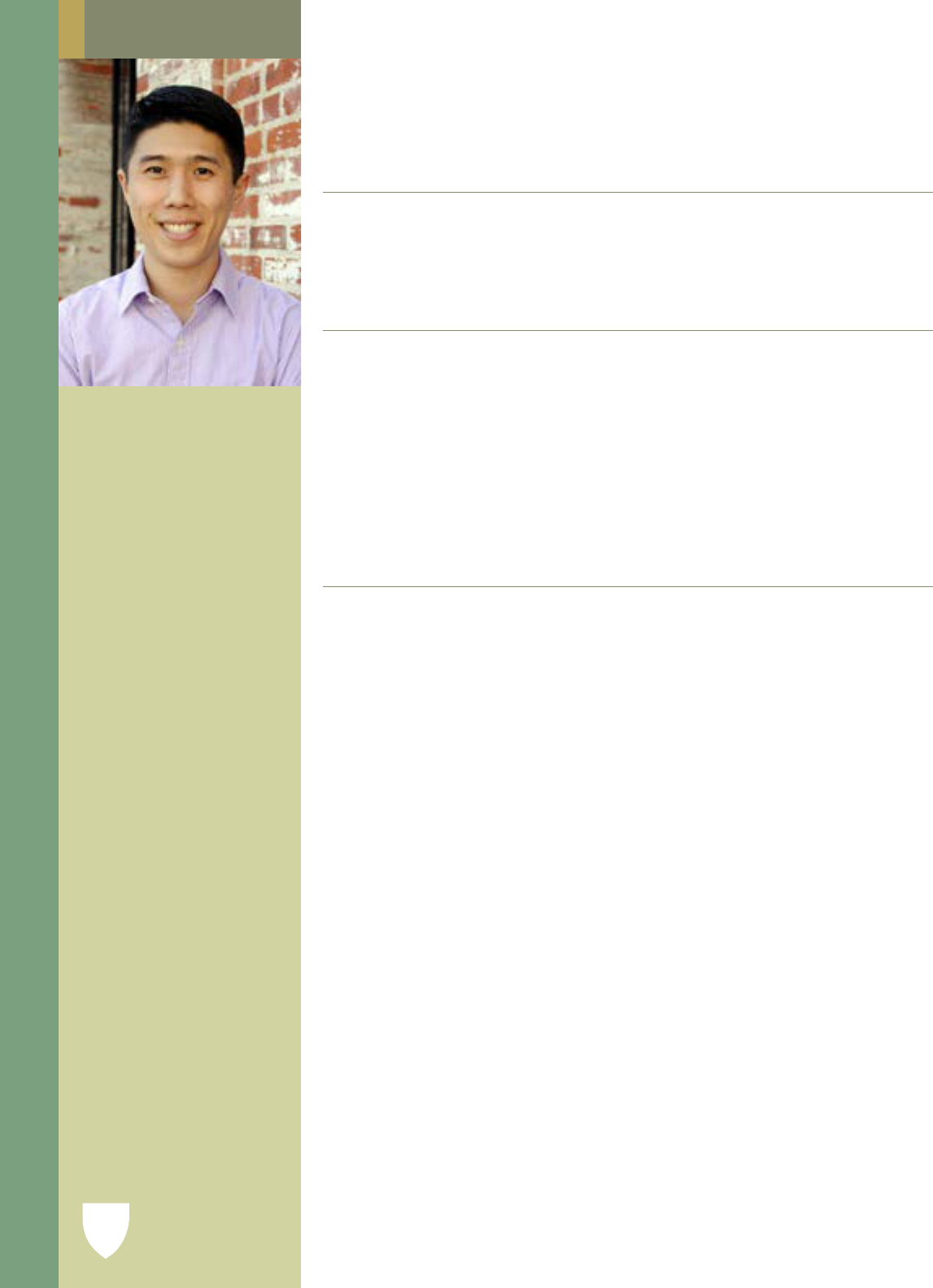
PROFILE BOOK 2013-2014
George Fellows
Harvard Kennedy School
24
BRYANJUNG
Harvard Kennedy School
Master in Public Policy Candidate
A H
Harvard Business School, MBA Candidate
Brandeis University, B.A. in Economics and Politics
David M. Rubenstein Fellow
P H
e Walt Disney Company, Corporate Strategy: Summer Associate
e White House: Director of Special Projects for the Senior Advisor
to the President
e White House: Special Assistant to the Director of the National
Economic Council
Obama for America: Scheduling and Special Projects for the
Vice Presidential Nominee
American Federation of Teachers Political Action Committee: Associate
N
I fully appreciated the extent of my dad’s union-negotiated healthcare insurance when
my mom was diagnosed with an advanced stage breast cancer. While my mom was able
to receive treatment at an aordable premium, I realized there were far too many families
that could not. In order to change this status quo, I focused my eorts solely in the public
sector, working for a labor union and then a presidential candidate who would work to
bring about universal healthcare, social justice, and economic opportunity.
It was not until I worked at e White House that I understood how the private and
social sectors could also eect change. When working for the Director of the National
Economic Council, I soon recognized that government needs business as much as
business needs government. Whether it was the CEO discussing her company’s
struggle during the economic crisis or the administration ocial seeking advice on job
creation, it was critical that they both worked together. When working for a Senior
Advisor to the President, I appreciated the collaboration between the Administration
and the social sector stakeholders that represented every constituency group. Without
this work, proposed public policies would neither be as robust nor as eective for the
very communities they serve. Clearly, the societal results were always stronger when
these sectors worked together.
e need for tri-sector leaders that can operate in the public, private, and social sectors
has become even more apparent during my time at the Kennedy School of Government
and Harvard Business School. My participation in the George Fellowship will provide
me an opportunity to learn from a diverse community of fellows, strengthen my
understanding of the global challenges we face, and build upon the tools we will need
to address such challenges.
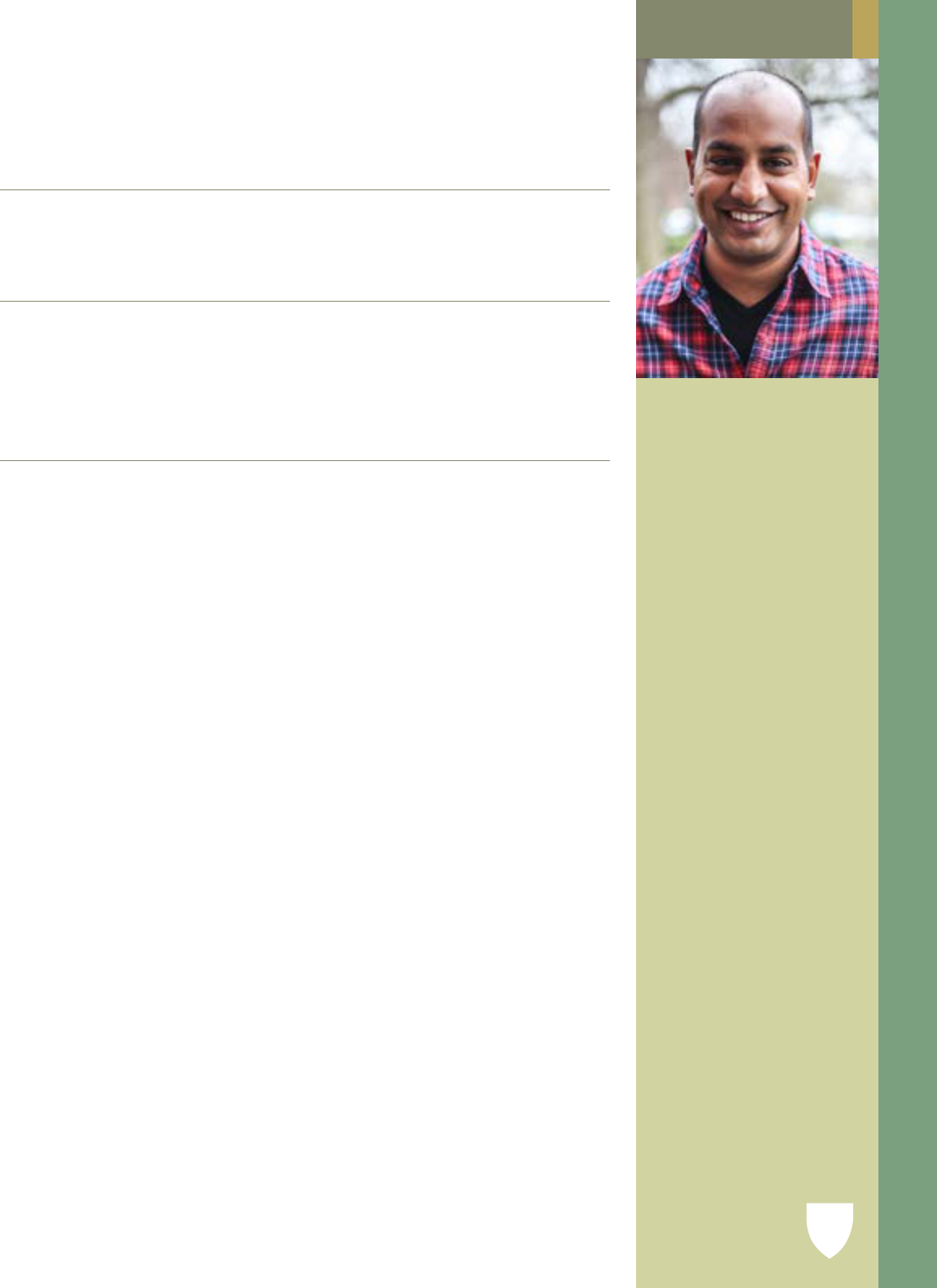
PROFILE BOOK 2013-2014
George Fellows
Harvard Kennedy School
25
KAPILKHIMDAS
Harvard Kennedy School
Master in Public Policy Candidate
A H
Harvard Business School, M.B.A Candidate
Queen’s University, B.Sc. (Honors) in Computing and Information Science
P H
Bart’s and e Royal London National Health Service (NHS) Trust:
General Manager of Cardiac Services
McKinsey & Company: Business Analyst
Oce of the Mayor of Calgary: Summer Intern
N
My fascination with business and government started when I worked on consulting
engagements with hospitals in Ontario, helping doctors, nurses, and administrators
reduce wait-times for patients and improve the coordination of their care. I was
hooked, and moved to England to manage a cardiac hospital, part of a larger academic
medical center that had been struggling with operational and nancial targets.
As a general manager, I was responsible for every aspect of my hospital’s operations,
from waiting times to nances, and from quality of care to patient satisfaction – all
delivered through a sta of 750. It was a truly formative leadership experience that
completely changed me. While I loved my leadership role, I grew frustrated with
aspects of England’s National Health Service and sought to learn more about how
health policy is formed – why England had chosen specic reforms, which from my
point of view on the hospital oor caused unintended consequences for my sta, often
making it harder to deliver the right care to patients.
Studying at the Kennedy and Business Schools has been a tremendous experience. I
have deepened my knowledge of US health policy, and discovered a passion for other
areas of public policy. I have also seen the important role that entrepreneurs are playing
in reforming health care delivery, and developed new skills that will allow me to be a
better operational leader. My professors and classmates have given me new insights
into the meaning and practice of leadership.
Over the last two years, I have come to realize that solving the seemingly intractable
public policy problems of our day, including health care, will require leaders who
can speak the language of policy and business. And, as I reect on the six years I
have spent away from my home in Canada, I feel a calling to return and help ensure
that the next generation of Canadians has the same incredible opportunities that
I enjoyed. My goal is to make a signicant contribution to Canada’s public health
system, as a leader, and someday, as an elected ocial. In this light, I am excited to
be a George Fellow, working with the community of fellows to deepen our personal
leadership development and develop new perspectives on issues that span the public,
private, and non-prot sectors.
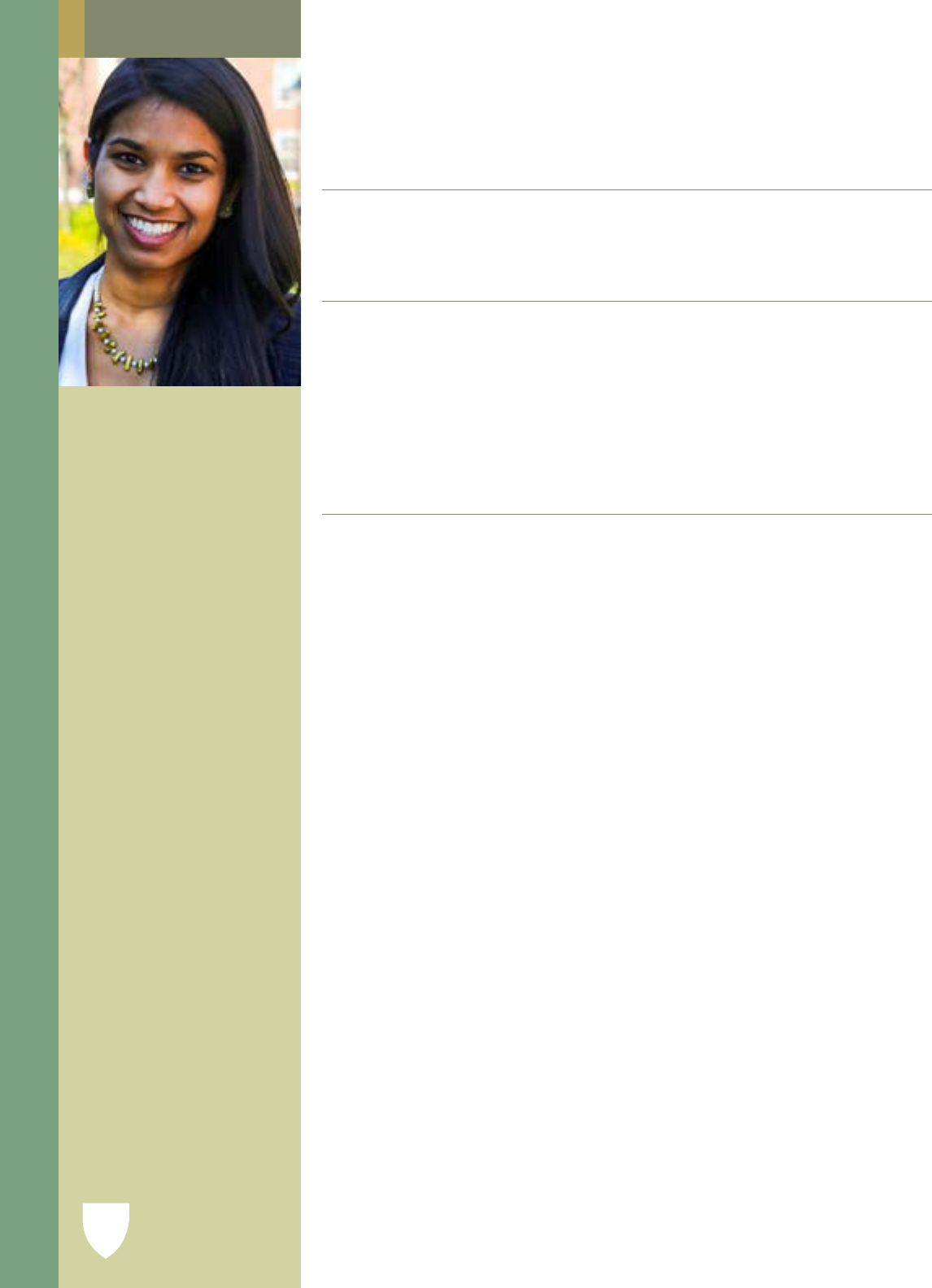
PROFILE BOOK 2013-2014
George Fellows
Harvard Kennedy School
26
DIVYAKUMARAIAH
Harvard Kennedy School
Master in Public Policy Candidate
A H
Harvard Business School, M.B.A. Candidate
Brown University, B.A. in Political Science, Pi Sigma Alpha
P H
Impact Connector: Founder and Chair, Social Enterprise Club at HBS
InSITE: Boston Founding Team
e White House: Policy Assistant, Oce of Social Innovation and Civic
Participation; Condential Assistant, Oce of Management and Budget
Obama for America: Field Organizer
Coro Fellowship: Fellow in Public Aairs, NYC
N
My parents taught me the importance of working hard. My father came to the US to
complete his medical residency, arriving with $3.20 in his pocket, no place to stay, and no
family. I grew up believing that working hard was enough to accomplish anything. But
during a trip to New Orleans just after Hurricane Katrina, I learned that success is more
complicated than that. I saw people who worked hard every day trying to regain control
of their lives but kept hitting barriers – physical barriers, social barriers, racial barriers.
at trip taught me that life is more complex than a simple equation, and inequality ran
much deeper than I had ever realized.
After college, I completed the Coro Fellowship in Public Aairs where I learned that
entrenched social challenges facing communities couldn’t be solved by one sector alone;
rather, working in partnership with public, private, advocacy, and non-prot sectors was
the only way to move forward. I went on to work on the Obama campaign and was
trained to be an organizer. I learned the importance of building strong communities and
the power of people coming together around a shared vision. Following the campaign, I
spent two and a half years working in the White House on the President’s budget and
his social innovation policy. I saw the potential for social innovation and impact investing
to change social outcomes, and realized that while government absolutely has a role to
play in building up an impact economy, government can’t do it alone. Entrepreneurs and
investors must drive the growth.
I see my career weaving through the private and public sectors, while staying connected
to my campaign and organizing roots. I want to build companies that embed social
impact into their core functioning, to demonstrate, not just preach, the viability and
scalability of strong companies with socially benecial practices. And I hope to return to
government with a rened perspective on innovation and small business.
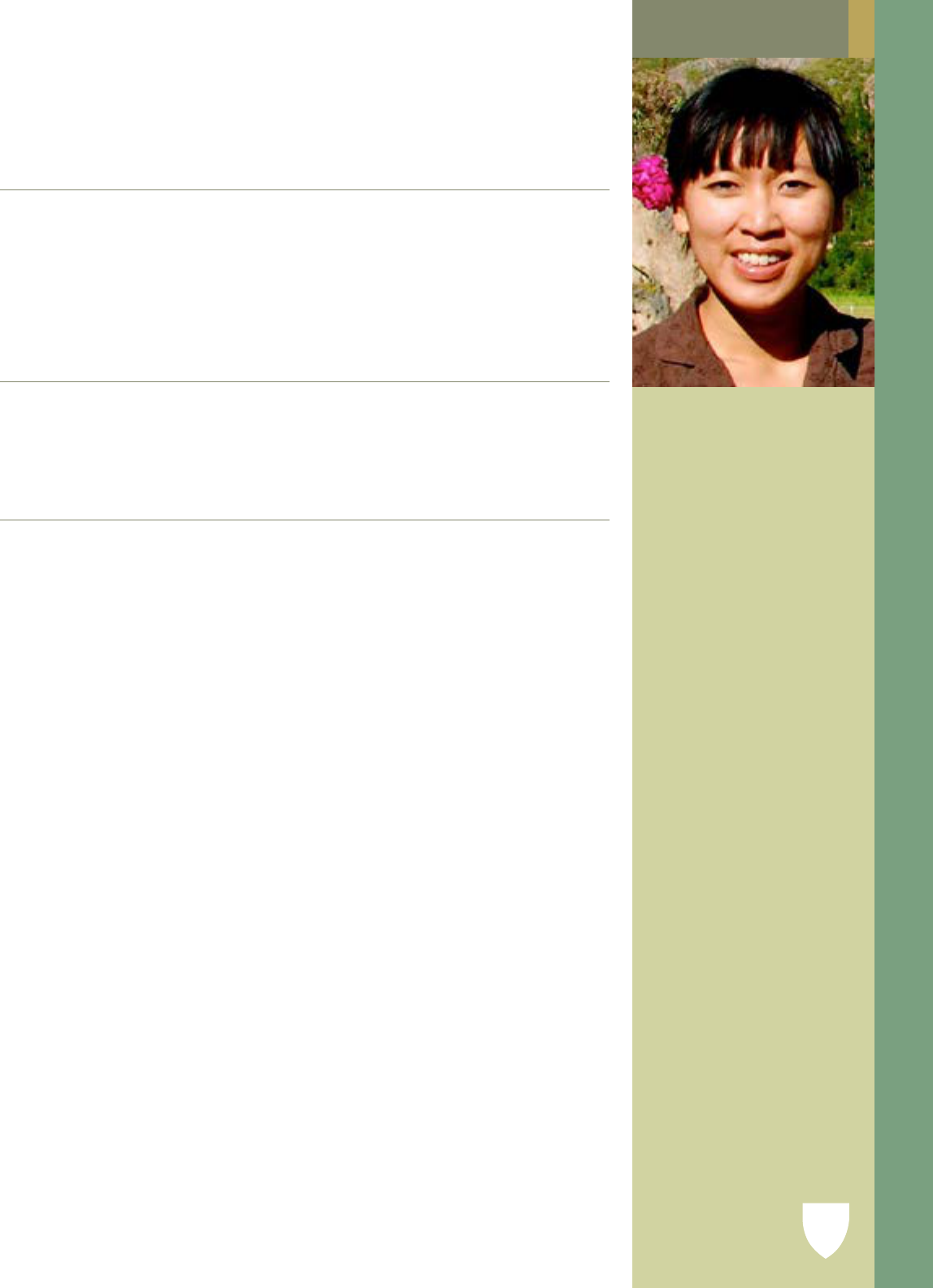
PROFILE BOOK 2013-2014
George Fellows
Harvard Kennedy School
27
ELSASZE
Harvard Kennedy School
Master in Public Policy Candidate
A H
Harvard Business School, M.B.A. Candidate
Harvard University Public Service Fellow
David M. Rubenstein Scholar
Harvard Business School Social Enterprise Summer Fellow
University of Chicago, B.A. in Economics
P H
McKinsey & Company: Business Analyst
International Monetary Fund: Research Assistant
Goldman Sachs: Investment Banking Summer Analyst
N
“Some men see things as they are and say why. I dream things that
never were and say why not.”
~ Robert Kennedy
I was a child who always asked why. at passion has led me to a very analytical path:
from studying economics, to dabbling in the world of high nance, to taking a front
row seat in the recent nancial crisis, and to advising companies on strategy. is path
has given me great privilege, and it comes with great responsibility. erefore I came
to Harvard to surround myself with the great minds of our generation, hoping to
confront the greatest challenges of our generation.
en I came to a realization. It takes a brilliant mind to ask why and understand how
the world is shaped. But it takes courage and conviction to ask why not, the question
that actually shapes the world.
Because solutions to the biggest problems of today and tomorrow will be found at
the intersection of the private and public sectors, we must be able to speak both the
language of government and the language of the market. I do not wish to just become a
literal translator. I want to become an interpreter who promotes mutual understanding.
And I want to become a poet who inspires shared appreciation.
As a social entrepreneur, my mission is to dismantle the false dichotomy between
doing business and doing good. I believe that business and government do not exist
in a purely zero-sum world. Fairness and economic growth seem incompatible not
because the rich must thrive at the expense of the poor, but because of the lack of
our imagination – the ability to say why not. One day, I hope to be in a position
to inuence politics and policy, promoting the most unlikely allies to engage in real
problem solving.
Embracing a childlike sense of possibility, I have been inspired by my experience at
Harvard to be a child again – a child who not only asks why but also, why not?
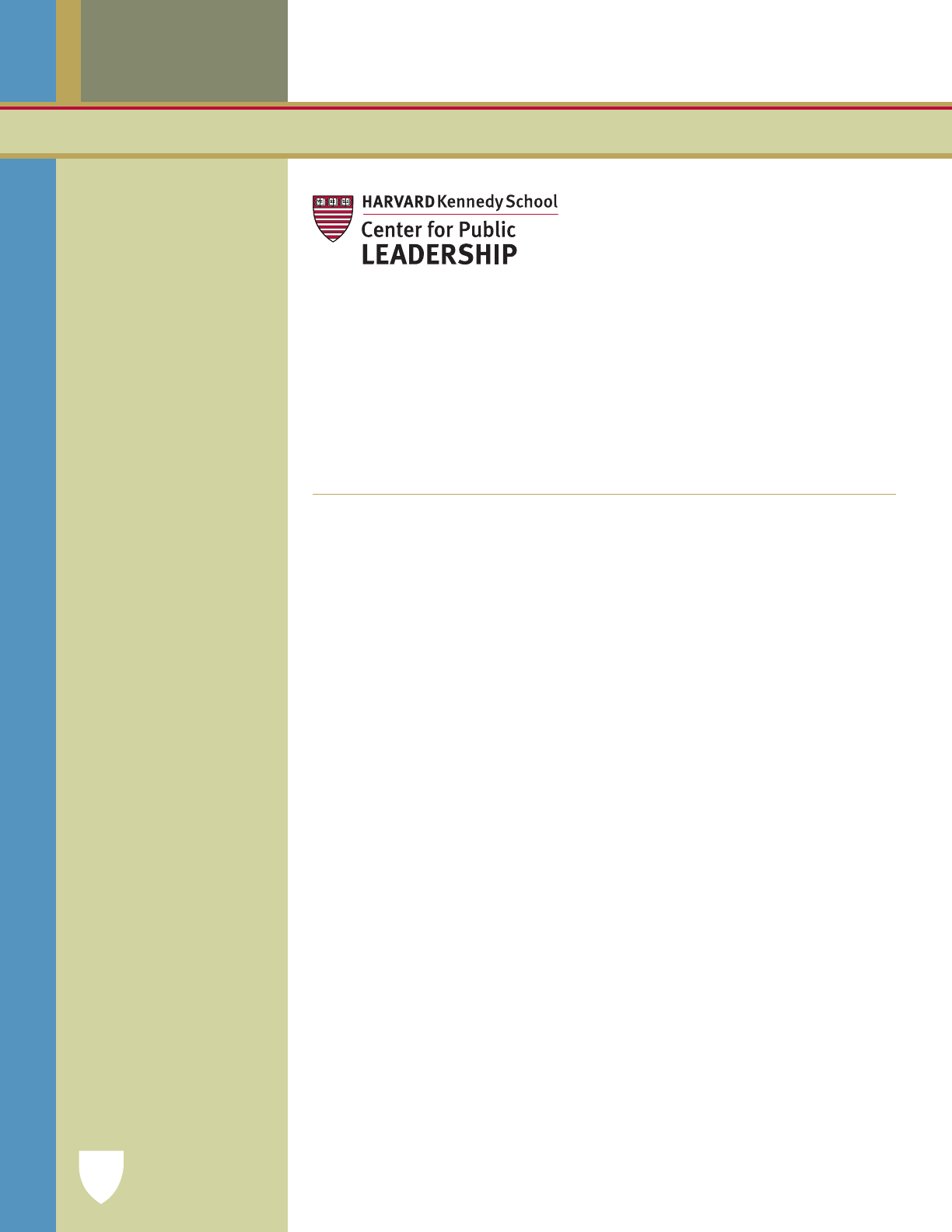
PROFILE BOOK 2013-2014
Gleitsman Fellows
Harvard Kennedy School
28
T G P I L F S C
With the income generated by a $20 million endowed gift from the estate of
Alan L. Gleitsman, CPL launched e Gleitsman Program in Leadership for
Social Change (GPLSC) in 2007. It was Mr. Gleitsman’s hope that if the world
knew of the accomplishments of social activists, others would be inspired by their
stories and would ght to correct some of the other problems facing us, thereby
improving the quality of life for all of us.
eGPLSC’s three principal components are:
• e Gleitsman Leadership Fellowship Program, which provides
signicant nancial support and a robust co-curricular experience to
promising students interested in social change;
• A set of programmatic initiatives, including visiting practitioners and
curriculum development, through which CPL plays a catalytic role in
the School’s (and Harvard’s) eorts to better prepare students as leaders
for social change, whether through activism, social enterprise, or other
strategies for change; and
• e Gleitsman Citizen Activist and International Activist Awards,
each of which carries a $125,000 cash prize and enables students
and the greater Harvard community to learn from the presence of an
extraordinary change agent when she or he visits campus.
is year, the endowment will support ve new activists with full tuition
Fellowships and welcome back four returning Fellows to carry on Alan’s vision
as often expressed through his favorite Robert F. Kennedy quote:“Few will have
the greatness to bend history itself, but each of us can work to change a small
portion of events, and in the total of all those acts will be written the history of
this generation.”
About the Gleitsman Program

PROFILE BOOK 2013-2014
Gleitsman Fellows
Harvard Kennedy School
29
About ALAN GLEITSMAN
A L. G was a successful entrepreneur in the television industry
for more than three decades and the founder of e Gleitsman Foundation,
which he established in 1989 to honor individuals who have initiated social
change. Mr. Gleitsman “wanted to recognize people who make a dierence, tell
their story and make other people aware of what one person can do.”
In addition to the Foundation, Mr. Gleitsman initiated a scholarship program
at UCLA designed to help attract outstanding medical students to the eld
of geriatrics; was honored by the University of Southern California for his
contributions to cancer research; participated in the International Peace Walk
in the Soviet Union; and established a scholarship program at the high school
he attended in Great Neck, New York that is awarded annually to the school’s
most outstanding graduate.
Mr. Gleitsman began his business career in sales for Sterling Television, a
television program distribution company that later became e Walter Reade
Organization. In 1970, he started Alan Enterprises, Inc. in Los Angeles,
specializing in the syndication of television programs in the United States. By
the time he sold the company in 1986, he had acquired the rights to a substantial
library of motion pictures, cartoons and series, and was actively involved in
distribution to television and video throughout the world.
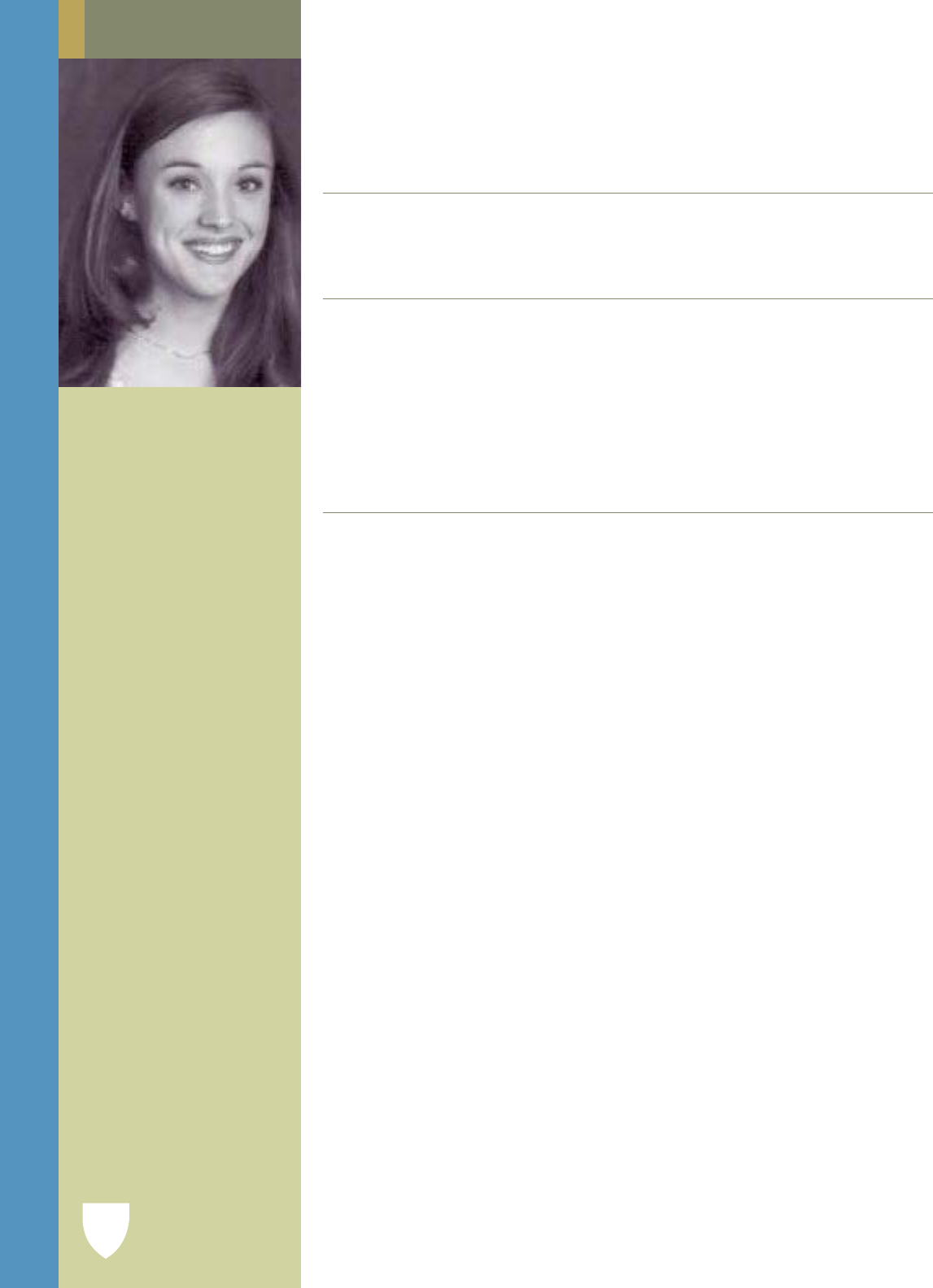
PROFILE BOOK 2013-2014
Gleitsman Fellows
Harvard Kennedy School
30
SARAHALLIN
Harvard Kennedy School
Master in Public Policy Candidate
A H
University of North Carolina at Chapel Hill, B.A. in Public Policy and
Economics, summa cum laude, Phi Beta Kappa
P H
Mississippi Economic Policy Center: Senior Policy Analyst
KIPP Delta Public Schools: Data Analyst
Women’s Fund of Mississippi: Board Member and Grants Committee Member
National Women’s Law Center:
Progressive Leadership and Advocacy Network Fellow
Mississippi Delta Workforce Funding Collaborative: Advisory Member
N
roughout my career, I have focused on helping expand opportunities for those in need.
While I was in college at the University of North Carolina, I researched the state’s
emergency food assistance network for my senior thesis. I was interested in better
understanding the needs of vulnerable communities and providing solutions for
advancing them. After graduation, I moved to the Arkansas Delta and worked for
a KIPP charter school. ere, I became particularly interested in how policies could
support students of all ages to pursue higher education and workforce training.
When I moved to Mississippi, my advocacy focus shifted to increasing the success of
Mississippi’s adults and low-income students in higher education and on strengthening
supports for low-income families. While working in Mississippi, I have researched
ways to strengthen remedial education and adult basic education programs, advocated
for increased support of students from disadvantaged backgrounds and served as a
resource about adult success in higher education.
I was drawn to the Gleitsman Fellowship and a Masters in Public Policy at the Kennedy
School, because the programs not only value the development of leadership, they
cultivate it. e time I spend with fellow public service leaders will be invaluable in my
path to generating policy that opens greater economic and educational opportunity for
low-income families and students in Mississippi and beyond.
I believe one of the Deep South’s greatest challenges is cultivating future leaders to
advocate on behalf of sound policies and our most vulnerable individuals. Mississippi is a
state characterized by superlatives: poorest, unhealthiest, least educated. Still, it is a place
of great hope. With strong leadership and informed policy, the state’s story can take a
dierent path. With lessons learned from the Gleitsman community, I hope to be a part
of shaping that story and a part of advancing students and families throughout the region.
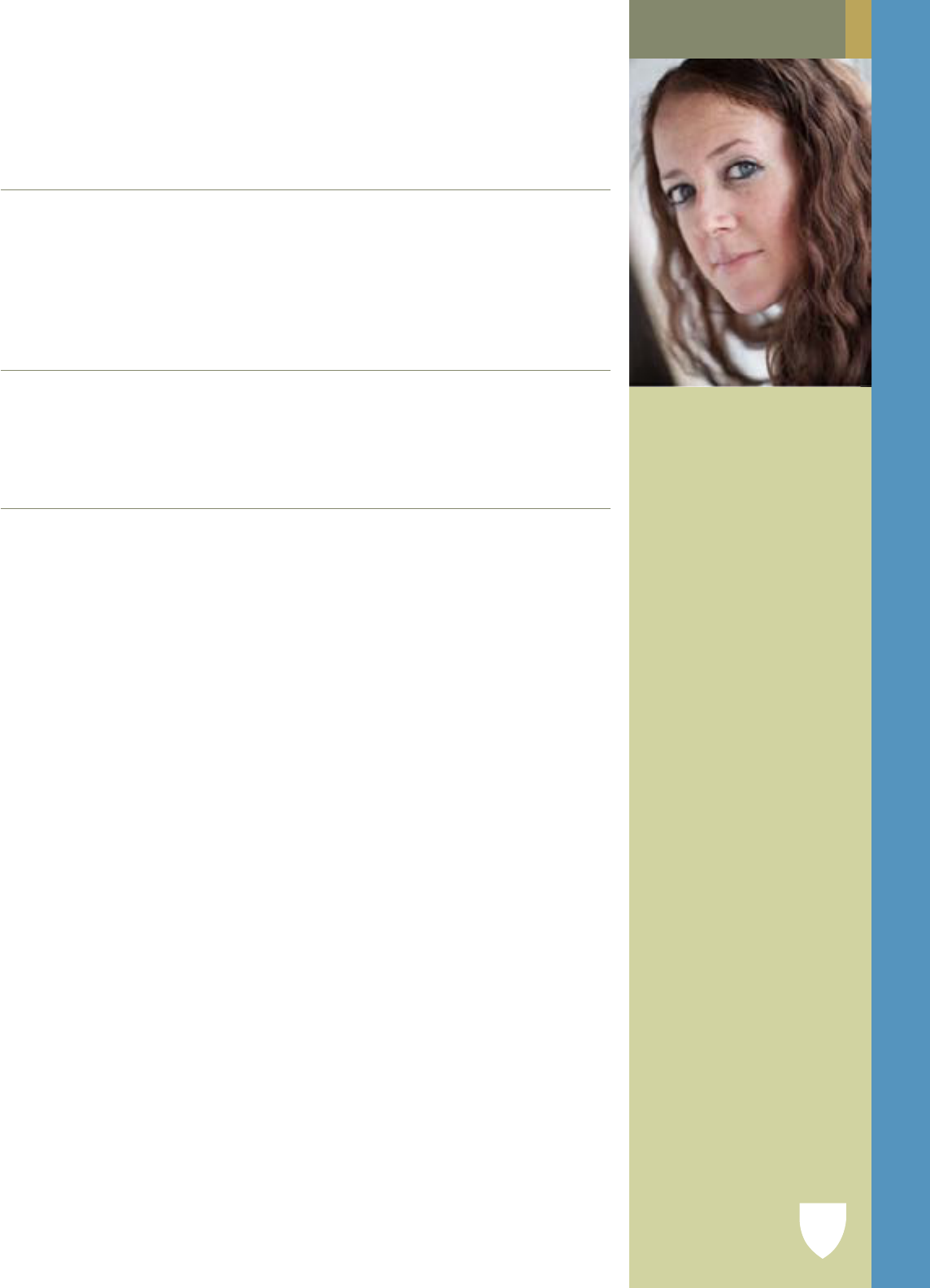
PROFILE BOOK 2013-2014
Gleitsman Fellows
Harvard Kennedy School
31
KATIEBOLLBACH
Harvard Kennedy School
Master in Public Policy Candidate
A H
Johns Hopkins School of Public Health, M.P.H. in Health Policy and
Systems; Sommer Scholar
Graduate Student Award for Civic Engagement, 2013 Service Learning and
Civic Engagement Conference
Stanford University, B.A. in International Relations and African Studies
P H
FACE AIDS: Co-Founder; Africa Program Director, Zambia and Rwanda
Partners In Health: Micronance Program Coordinator, Rwanda
Global Health Corps: Founding Program Director, Vice President of Programs
N
In the summer of 2005 I travelled to northern Zambia to volunteer on a literacy project
in a Congolese refugee camp. Of all the injustices in the camp, the denial of anti-
retroviral treatment to people living with HIV was among the starkest. e anger I felt
that summer watching people die of AIDS, when treatment was available at a nearby
Zambian hospital, has grown into a commitment to spending my career preventing
these kinds of unnecessary deaths. I took a leave of absence from my undergraduate
studies at Stanford and spent the year in Zambia building a structured savings and
support program for people living with HIV. In 2007-08, on a second leave of absence, I
helped to set up a similar program in Rwanda in collaboration with Partners In Health.
Inspired by the passion and power of the young people with whom I worked with in the
US, Zambia and Rwanda, I joined Global Health Corps, an organization dedicated to
building a new generation of leaders in global health, as the founding Program Director.
My time working with GHC fellows, emerging leaders from diverse disciplines and
geographies, deepened my belief that collaborative communities of young people built
around shared values can be great engines for social change. In leaving GHC one
of my priorities was to seek out and continue to help build communities like this
throughout the rest of my career. e Gleitsman Fellows program provides a unique
opportunity to be a part of such a community at Harvard.
Before coming to the Kennedy School, I pursued an MPH at Johns Hopkins. While
there I learned about biostatistics and epidemiology, but Baltimore’s health and social
justice activists were equally important teachers. Organizing and advocacy work in
Baltimore on issues from marriage equality to HIV criminalization deepened my
understanding of the needs of marginalized and underserved communities here at
home, and reinforced my belief in the power of grassroots activism. After nishing the
MPP program at the Kennedy School, I hope to continue to work as an advocate for
the uptake of eective social justice-oriented health policy at home and abroad.
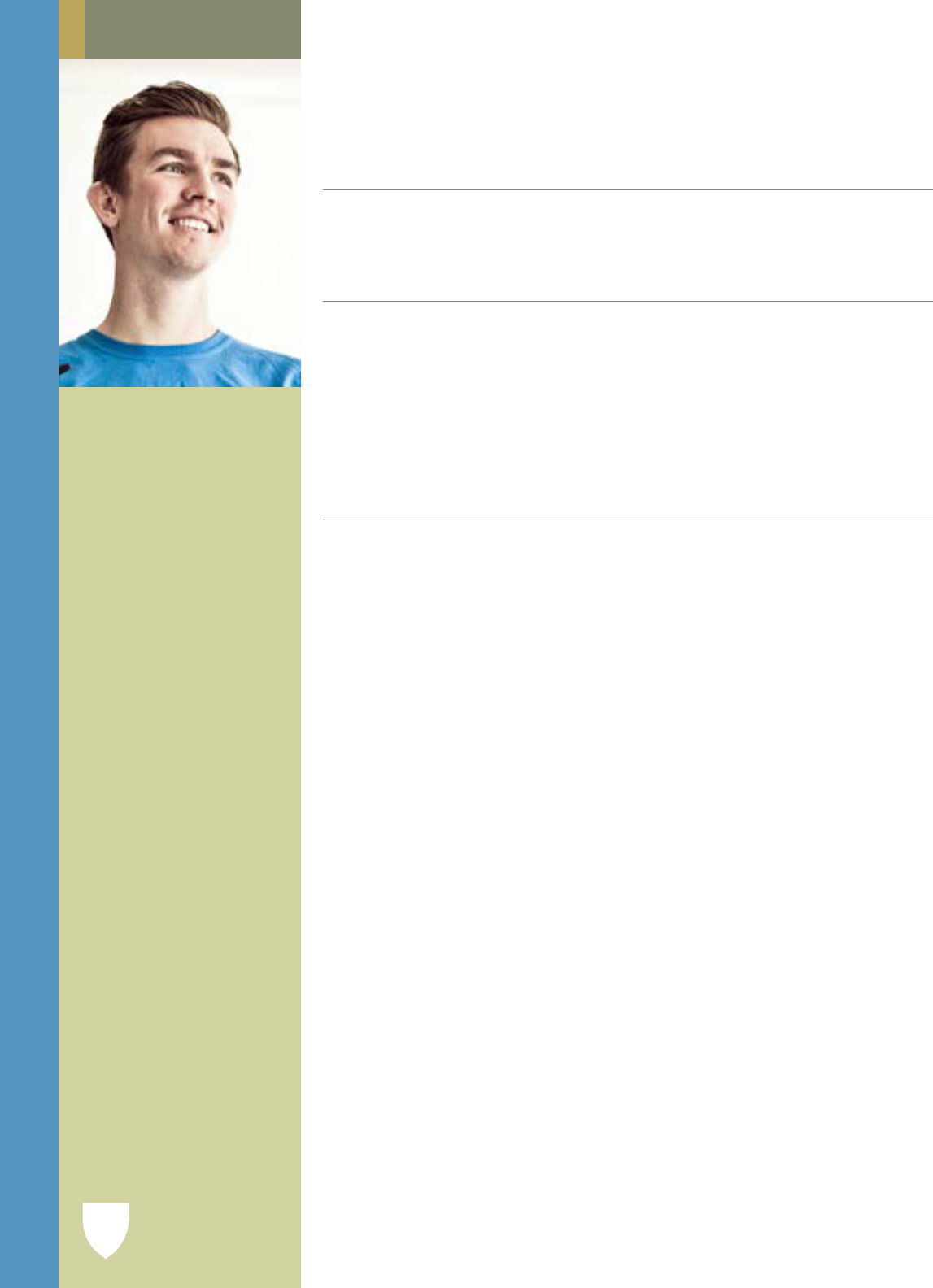
PROFILE BOOK 2013-2014
Gleitsman Fellows
Harvard Kennedy School
32
MICHAELMICKPOWER
Harvard Kennedy School
Master in Public Policy Candidate
A H
University of Melbourne, Australia, Bachelor of Laws, with Honours
University of Melbourne, Australia, B.A. in Political Science
P H
Environment Victoria: Community Campaigner
Environment Defenders Oce (Victoria): Law Reform Lawyer
Labor Environment Action Network: Victorian Co-Convenor
100% Renewable Campaign: Organiser & Steering Committee
Centre for Resources, Energy and Environmental Law: Research Assistant
Mallesons Stephen Jaques: Paralegal and Solicitor
N
My whole life I’ve been driven by a passion to make things fairer. I grew up in Western
Australia, a conservative place where great privilege and great disadvantage exist side-
by-side. My Catholic family raised me to believe in a compassionate society that looks
after its most vulnerable members, a belief that stuck with me and led me rst to
embrace social democracy, then a path in the environment movement.
As a young law student with a corporate law career lined up, I remember reading how
the eects of climate disruption — a problem created by rich countries like mine —
would be worst felt by millions of vulnerable people in developing countries. Struck by
how unfair that was, I decided to shift my focus to environmental law and policy. Over
the next four years I worked as a researcher, a lawyer and then as a policy advocate at
the Environment Defenders Oce, where I developed and inuenced better policy
outcomes on issues from carbon pricing to coal mining to biodiversity protection.
Increasingly, though, I came to believe that policy was not enough: that activism and
campaigns were needed as well, to overcome the political obstacles to change. So I
volunteered as a campaigner and organiser within the Labor Party and with a national
renewable energy campaign, building the power needed to achieve our policy goals. I
went on to work at Environment Victoria, and organised a campaign team of over 500
volunteers to push for better environment policies in the lead-up to the state election.
I want to combine smart policy with powerful campaigns that transform Australia
from a leader in the global fossil fuel industry to a leader in the transition to a more
fair and sustainable global economy. rough the Gleitsman Fellowship, I hope to
learn from a remarkable group of progressive change agents to help me do that. I
want to focus on policies and campaigns that eect structural adjustment in unviable
industries (like coal-red power generation) in a uniquely social democratic way: one
that puts the vulnerable people who depend on and are impacted by that change rst.

PROFILE BOOK 2013-2014
Gleitsman Fellows
Harvard Kennedy School
33
ARTUROREYES III
Harvard Kennedy School
Master in Public Policy Candidate
A H
University of Michigan, B.A. in Political Science
Teaching Fellow: Organizing – People, Power and Change, Prof. Marshall Ganz
P H
Dukakis Fellow: Oce of Governor Kitzhaber, Oregon
Michigan Voice: Deputy Director/Interim Director
Michigan Organizing Collaborative: Founding member, Board President
Hispanic/Latino Commission of Michigan: Commissioner
Coro Fellows Program in Public Aairs: St. Louis, MO Fellow
N
I grew up a Mexican kid from the trailer park with a erce belief in the American
Dream and voracious pride in my state. Michigan was a place that embodied the
essence of the American promise: opportunity. My great-grandparents had been
migrant farm workers that settled in Flint, Michigan for auto jobs, and my family had
been working in those factories ever since. Here, I was taught if you worked hard and
played by the rules, you had a ghting chance at a better life, no matter where you came
from. Balancing this belief with the harsh realities I was seeing in my hometown—
closing factories, rising unemployment and increasing poverty— inspired me to work
to ensure that we hold ourselves accountable for the promises we make as a society.
I developed a hunger to explore ways to help my community and my state. In college
I studied politics and social movements. I became a student leader on campus, and
worked for a labor union, a political campaign, a congressional oce and a community
organizing group. I immersed myself in opportunities to learn, grow and lead. After
graduating I participated in the Coro Fellows Program. I worked on innovative
approaches to bettering a community, like micro-lending, social enterprise and a
community-based urban produce market. I observed the most powerful change
happening when people in their communities were empowered to create it.
In my role as Deputy Director and Interim Director of Michigan Voice, I helped build
a diverse coalition of organizing, advocacy and community based organizations to
strengthen civic engagement capacity across the state. I rmly believe that democracy
functions best when all voices are lifted up and I have worked to empower community
organizations to lift the voices in their communities that often go unheard. It is through
this work that I have seen a great need to articulate a long term vision that promotes
equitable opportunity for all, organize diverse, cross-community collaborations, and
hold our elected ocials accountable to that vision.
I want to help build a long-term vision for my state that is rooted in Michigan’s identity
as a place of opportunity and committed to creating real, measureable impact for
people. rough pursuing a Masters in Public Policy at Harvard Kennedy School as a
Gleitsman Fellow, I plan to study the nexus of social movements, political leadership
and sound public policy to become a better leader for transformative change in my state.
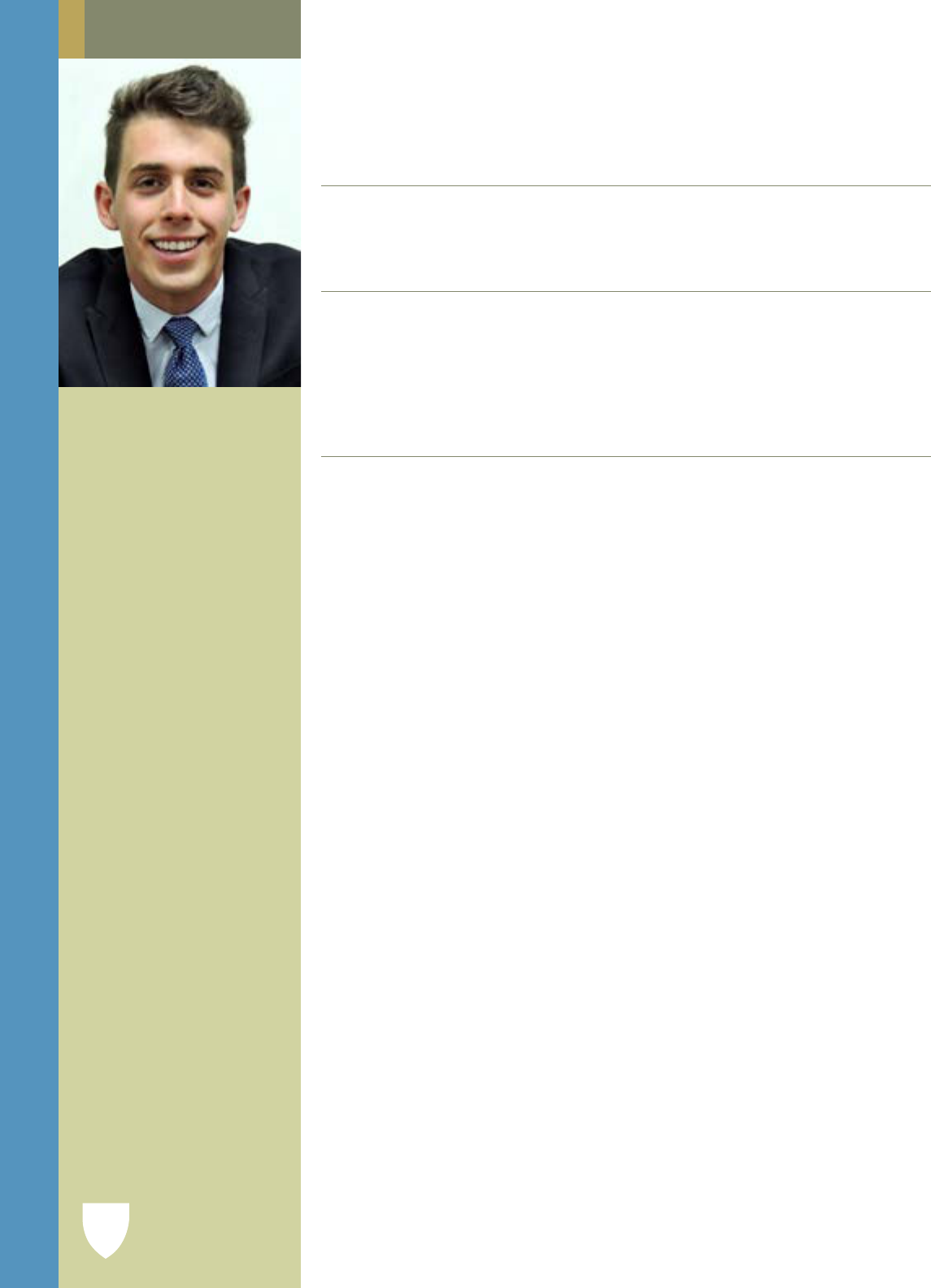
PROFILE BOOK 2013-2014
Gleitsman Fellows
Harvard Kennedy School
34
ROBERTMATTHEWREYNOLDS
Harvard Kennedy School
Master in Public Policy Candidate
A H
Loyola Marymount University, B.S. in Economics, magna cum laude; Ignatian
Award, university’s highest individual distinction
P H
e White House: Intern
Environmental Protection Agency: Intern
Centro del Muchacho Trabajador, Quito, Ecuador: Teacher
Environmental Protection Agency: Greater Research Opportunities Fellow
N
After rst visiting Ecuador and seeing widespread deforestation and poverty, I learned
the importance of development that alleviates poverty and protects the environment.
With intentions for a career in Latin American environmental policy, I studied
mathematical economics at Loyola Marymount University, participated in the
Harvard Kennedy School’s Latino Leadership Initiative and became my university’s
rst undergraduate fellow of the Environmental Protection Agency.
Since graduating, my goals have come into clearer focus while working for an Ecuadorian
development project and e White House. Teaching English at a Jesuit-run school
for the families of Quito’s working children—a demographic likely to be hit hard and
soon by climate change—instilled in me the urgency of eective environmental policy.
My internship for an energy and environment team at e White House showed me
how small teams with clear missions can change the world.
In recent years, many governments have formed teams to draw insights from behavioral
science and apply them to public policy. ese initiatives, most notably England’s
Behavioral Insights Team, use behavioral science to shape the public’s decision
environment in ways that make smart decisions (i.e. reducing household energy
wastage) easier and more natural. Unfortunately, the US government does not yet have
such a team. If this is still the case after I graduate from HKS, I intend to found one.
Coupling my HKS coursework with the Gleitsman Fellowship will provide me with
a comprehensive skillset that will equip me to work in many arrays of policy, from
crafting to implementation. I am excited to learn, collaborate and network with this
community of rst-rate activists, and soon take leadership roles in environmental policy.
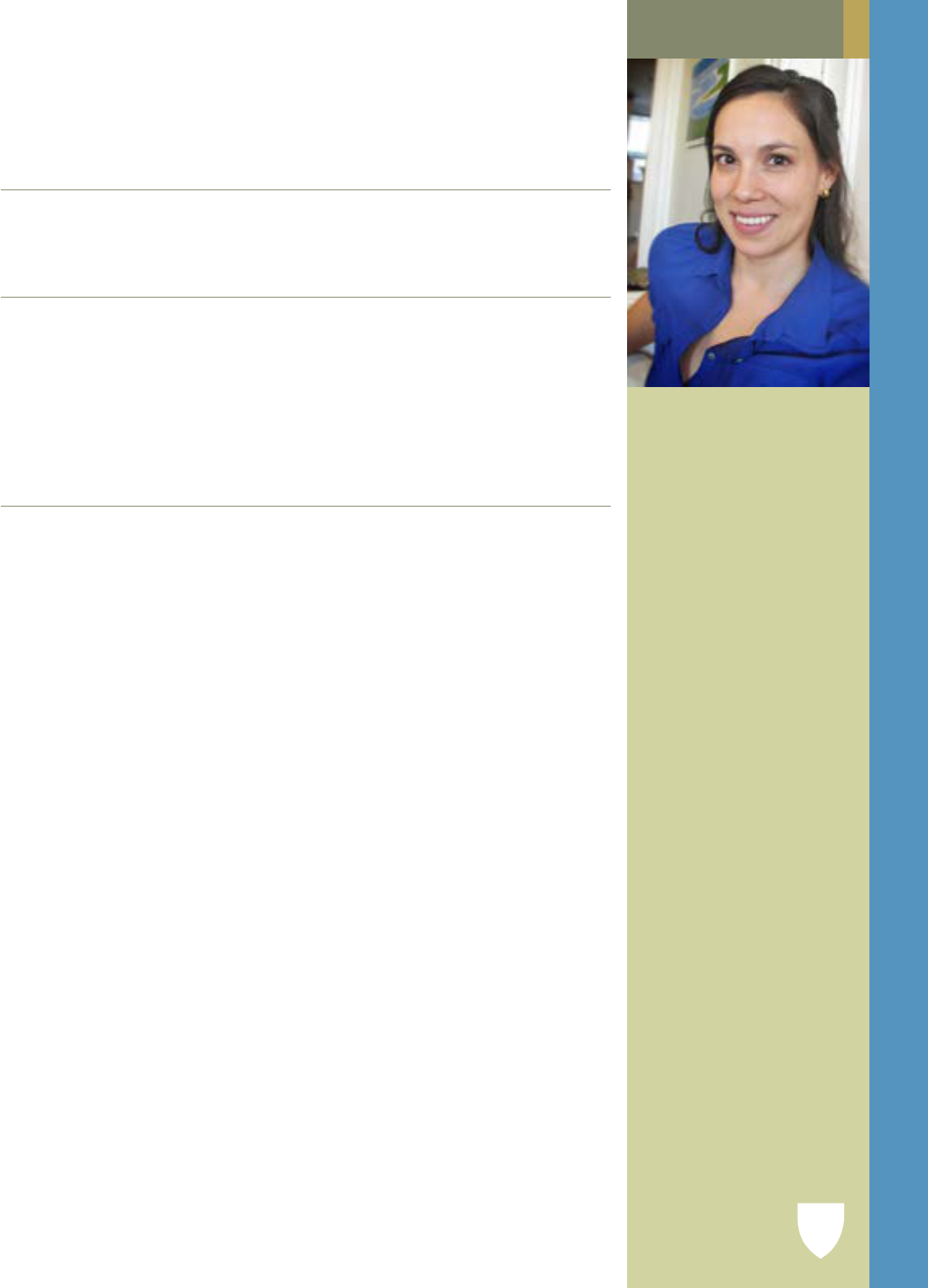
PROFILE BOOK 2013-2014
Gleitsman Fellows
Harvard Kennedy School
35
NICKIRUIZDE LUZURIAGA
Harvard Kennedy School
Mid-Career Master in Public Administration Candidate
A H
Reed College, B.A. in Cultural Anthropology; Received President’s
Commendation for Academic Excellence
P H
Crittenton Women’s Union: Various positions developing and managing
Healthy Families, Shelter Programming and Professional Development
Campaign to Elect Senator Sonia Chang-Diaz: Volunteer and Event
Coordinator
Sociedad Latina: Manager of Arts and Wellness Programs
e Little Gym: Director
N
I have always been passionate about programs for infants, toddlers, and children. Early
on I was the Director of a for-prot developmental program for young children. While
I loved a lot of parts of the job—seeing kids every day, connecting with parents about
their children’s growth, and supporting sta to create the highest quality programming
possible—I quickly tired of having the company’s bottom line as the main focus.
A Massachusetts native, I moved back to Boston in early 2008 to focus on services for
some of its highest risk young residents. My work has allowed me to keep those parts
of that early job I enjoyed so much, while additionally allowing me to be a part of a
broader solution for kids without a lot of opportunity. I have developed and managed
programs for children and youth across the city, focusing in recent years on homeless
children and teen parents.
I think that one of the biggest fallbacks of many children’s programs is that they work
too much in isolation. In my work, I have seen the benets of programming that
works in a strengths-based way to engage parents and support their goals while also
attending to the needs of the child.
For the future I am interested in developing multigenerational approaches to poverty
alleviation and family support, approaches that truly address the needs of the entire
family as a whole. I am interested in integrating these types of models within our existing
systems, focusing on optimizing service delivery and reducing overlapping services.
I am also interested in guring out ways to improve training and support for the people
working in our human service systems. I see these sta as an underutilized resource for
poor families, bogged down by ineectual systems and caught up in constant day-to-day
crises. By investing in public workers, I believe we could see better outcomes for families.
I am excited about the year that I will spend as a Mid-Career MPA and Gleitsman
Fellow. I am thrilled to have the opportunity to focus on my own leadership potential,
sharing knowledge and expertise with other leaders from many dierent disciplines
and dierent cities around the world.
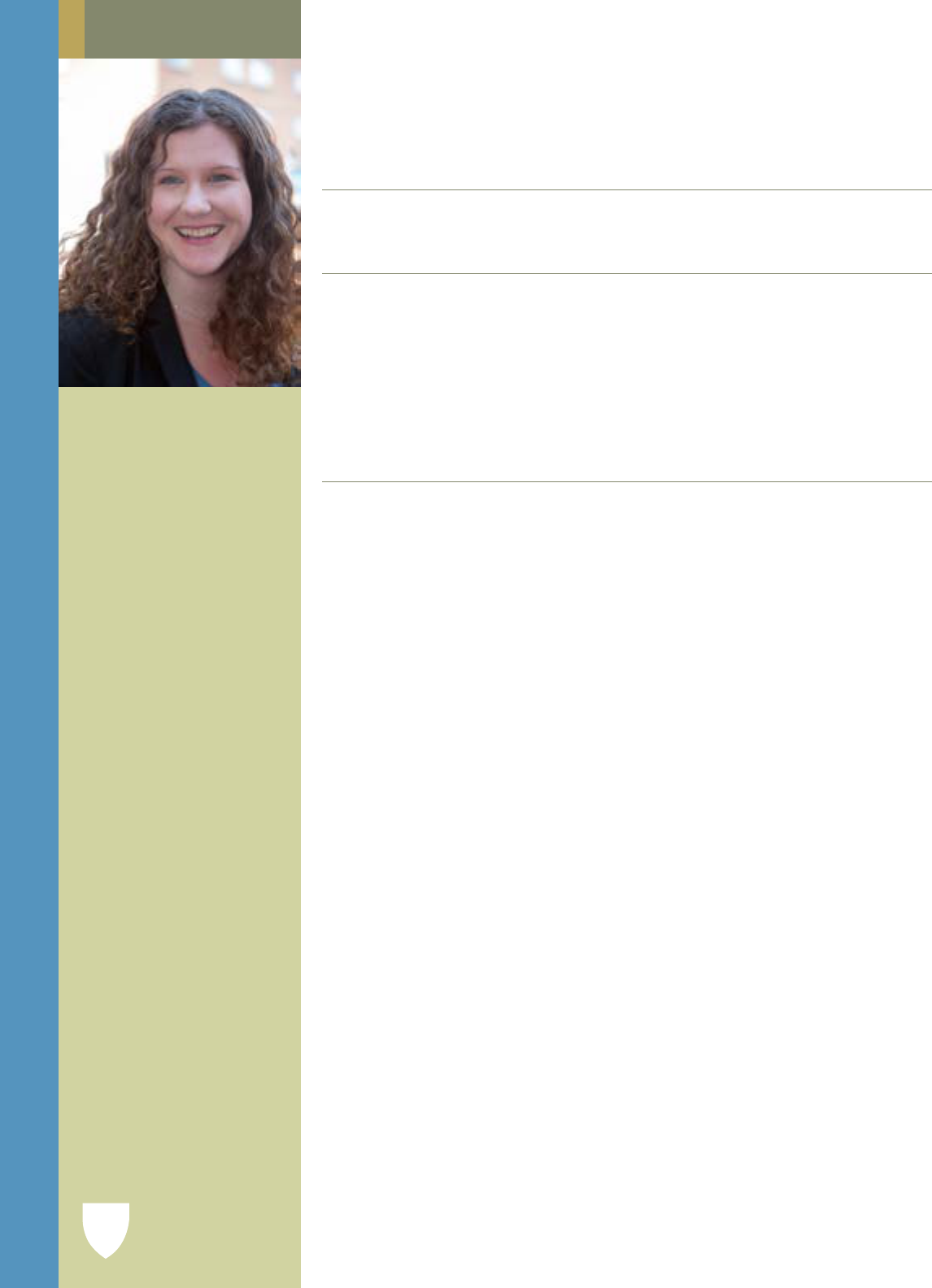
PROFILE BOOK 2013-2014
Gleitsman Fellows
Harvard Kennedy School
36
MELISSATHREADGILL
Harvard Kennedy School
Master in Public Policy Candidate
A H
Oberlin College, B.A. in Politics with Highest Honors
P H
Oce of State Senator Jamie Eldridge (Massachusetts): Director of
Communications and Policy
MassEquality: Director of Communications
Communications/Media Consultant and Trainer for numerous progressive
campaigns and nonprots
Rappaport Public Policy Fellow at Massachusetts Department of Youth Services
N
For my entire academic and professional career, I’ve been interested in one central
question: how do those who are traditionally “powerless” gain political power, draw
attention to an issue, and, ultimately, create social change? Whether I’ve been
campaigning to elect better representatives, lobbying government to change its policies,
or working in the government itself, my goal has always been to create a government
that is more responsive and accountable to the least powerful in our society.
Early in my career, after working on several election campaigns, I was lucky enough
to land my then-dream job: Communications Director for MassEquality, the LGBT
advocacy group leading the statewide campaign to protect marriage equality in
Massachusetts. It was there that I saw the transformative power of bold, innovative
ideas and a stubborn unwillingness to back down on matters of basic principle.
I did my best to bring that spirit to my most recent job in the Massachusetts Legislature,
where I had the great fortune to work for a leader committed to social change and
eager to reform the system: State Senator Jamie Eldridge. In the Legislature, I’ve
worked on policies to increase government transparency and accountability, reform our
campaign nance system, ght poverty and homelessness, raise revenue, and promote
fairer treatment of immigrants, transgender people, and ex-convicts.
e work I’ve done in the Legislature has made me eager to tackle the challenge of
reforming government on a larger scale. Although my primary passion is and has
always been to improve the quality of life and increase the power of those who have
been marginalized in our society, my time in government has taught me that systematic
reforms—such as campaign nance reform—are necessary to accomplish this.
I am seeking a degree from the Kennedy School to gain the additional management
and policy analysis skills needed to operate at senior levels of government or the non-
prot/advocacy world to drive this change. I’m looking forward to growing as a leader
and working with others interested in social change through my participation in the
Gleitsman Leadership Fellowship.
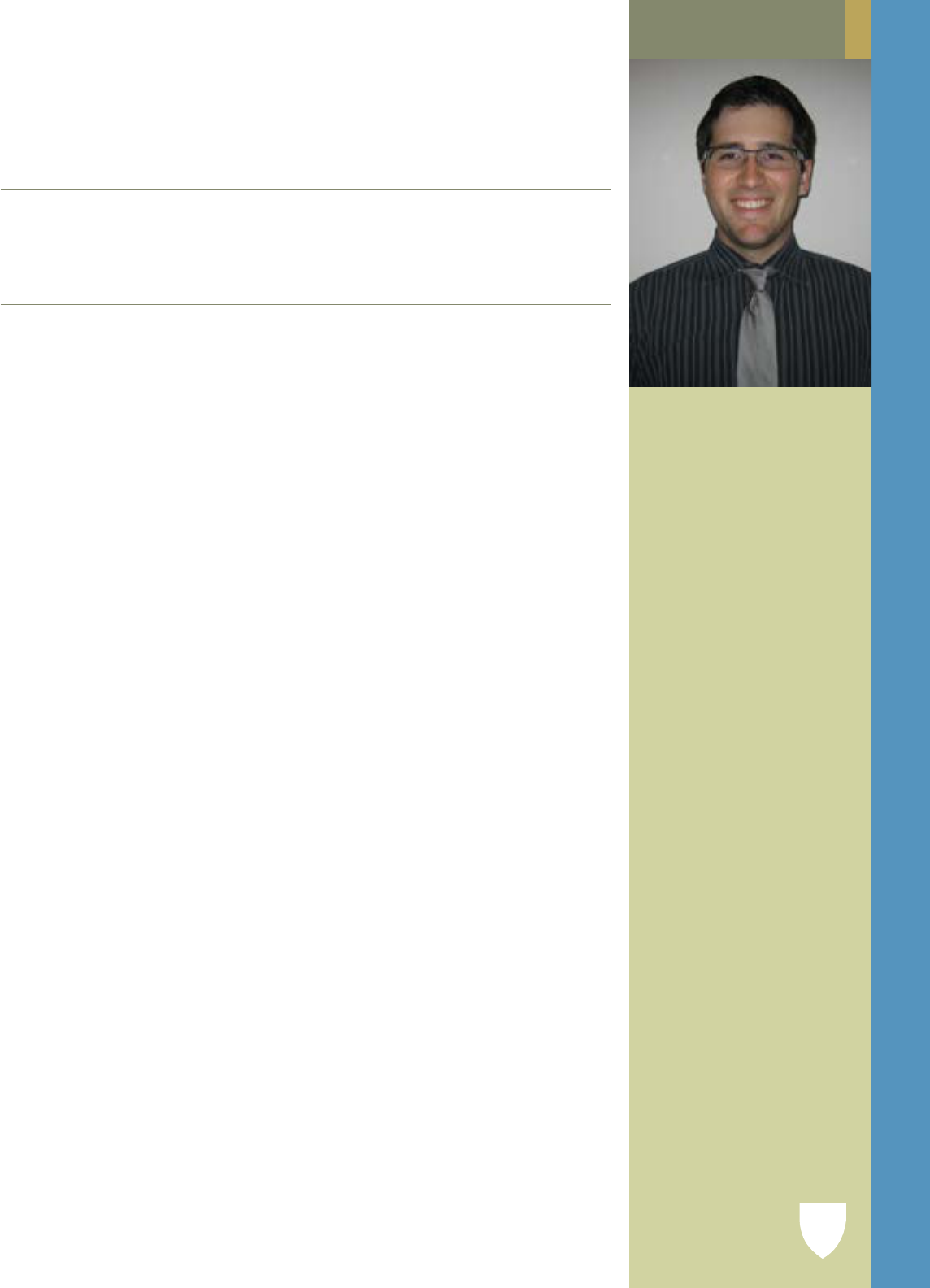
PROFILE BOOK 2013-2014
Gleitsman Fellows
Harvard Kennedy School
37
ALEXTISCHENKO
Harvard Kennedy School
Master in Public Administration Candidate
A H
Stanford Law School, J.D. Candidate
Pomona College, B.A. in History, magna cum laude
P H
Mexican American Legal Defense and Educational Fund: Law Clerk
Advancement Project: Law Clerk
Oregon State Representative Ben Cannon: Legislative Aide
Bus Project: Youth Vote Organizer and Data Management/Targeting
Coordinator
Equal Justice Works: National Advisory Committee Member
N
When I graduated college in 2007, I had a strong sense that the values and policy
priorities of my generation—the Millennial generation—were not well represented
in contemporary American political debates. So when I had the chance to join a
small nonprot focused on mobilizing young people to participate in the democratic
process, I jumped at the opportunity.
During my time at the Portland, Oregon-based Bus Project, we registered over
twenty thousand young people to vote in the 2008 election. We mobilized hundreds
of young volunteers to engage tens of thousands of voters, face-to-face, about the
issues facing our generation. Our summer organizing training program helped place
dozens of young leaders with political campaigns, advocacy groups, and direct service
providers. Partly due to our eorts, and those of other groups working on the ground,
Oregon saw the biggest jump in young voter turnout of any state in the nation.
In spite of these successes, I saw how legal barriers could prevent millions of citizens from
engaging in the democratic process. I went to law school aiming to help remove these
barriers to the franchise, and to help promote policies that enhance civic participation.
As a lawyer-in-training working on ballot access issues and helping litigate Voting
Rights Act challenges to racially discriminatory redistricting plans, I saw rsthand
how a Kennedy School education could make me a better advocate for meaningful
reform of our democratic processes—both inside and outside the courtroom.
I am excited to join a cohort of Gleitsman Fellows tackling the most challenging public
sector problems from a multidisciplinary perspective, bringing to bear the best ideas
hatched—and hardest lessons learned—in their experiences as advocates and activists.
I have come to believe that expanding access to democracy is only half the battle;
the purpose of increasing participation is, after all, to achieve tangible policy changes
that make citizens’ lives better. e Gleitsman Fellowship will sharpen my ability to
identify, organize for, and implement the policy innovations that a robust civil society
and a more representative democratic process make possible.
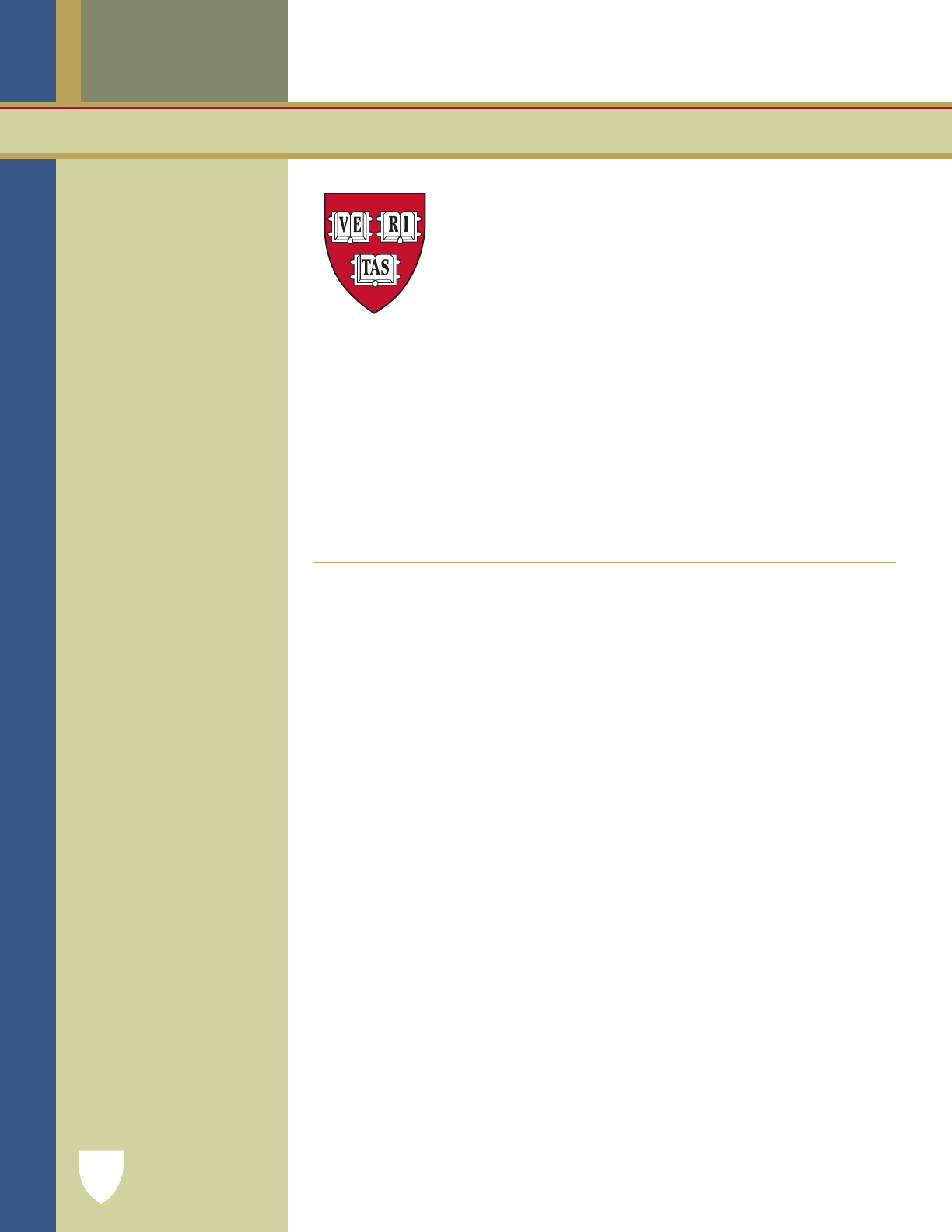
PROFILE BOOK 2013-2014
Zuckerman Fellows
Harvard University
38
Zuckerman Fellows
Harvard University
About the Zuckerman Fellows Program
T Z F P
e challenges we face in our public schools and public health systems, as well as
in government at all levels, are too complicated to be solved without the insight
and commitment of leaders with the highest-quality professional training. But
for many who have a strong aptitude for public service, the opportunity costs
associated with acquiring the necessary training are too high.
In response to this problem, the Zuckerman Fellows Program equips people from
the elds of medicine, law, and business to provide leadership for the common
good by making it possible for them to pursue public service degrees at the
Harvard Graduate School of Education, Harvard School of Public Health, or
Harvard Kennedy School. e Zuckerman Fellowship provides recipients with
full tuition and health insurance fees plus a stipend for one year.
Zuckerman Fellows are selected on the basis of commitment to public service,
leadership abilities, and intellectual and academic achievement.
In addition to their formal coursework, Zuckerman Fellows participate in a yearlong
cocurricular program that includes small-group discussions with members of the
Harvard faculty as well as other leading academics and practitioners, personal
and professional skill-building workshops, and a eld experience. Taken together,
these interdisciplinary activities help the Fellows integrate classroom learning
with their individual career plans and interests.
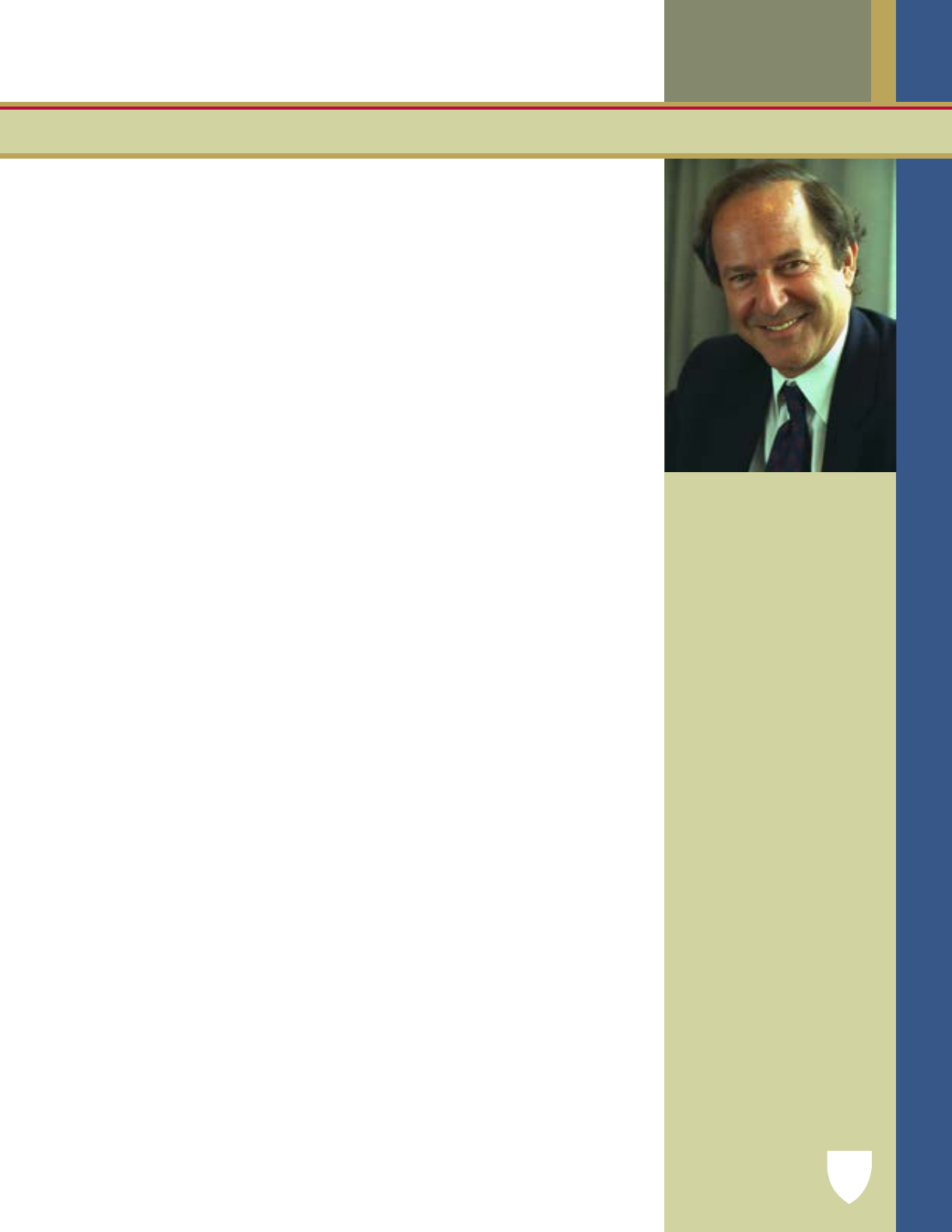
PROFILE BOOK 2013-2014
Zuckerman Fellows
Harvard University
39
Zuckerman Fellows
Harvard University
M B. Z is the Chairman and Editor-in-Chief of U.S.
News & World Report and is the publisher of the New York Daily News. He is
also the co-founder, Chairman and Chief Executive Ocer of Boston Properties
Inc. and a regular commentator on e McLaughlin Group.
He is a trustee of Memorial Sloan Kettering Cancer Center, a member of the
Bank of America Global Wealth & Investment Management Committee, the
Council on Foreign Relations, the Washington Institute for Near East Studies, the
International Institute of Strategic Studies and the Vice Chair of the International
Peace Institute. He is the Vice Chairman of e Fund for Public Schools and
serves as a Co-Chair of the Bipartisan Policy Center’s Cyber Security Task Force.
He is a sponsor of the Kennedy School of Government at Harvard University,
a former Associate Professor of City and Regional Planning at the Harvard
Graduate School of Design, a former lecturer of City and Regional Planning
at Yale University, a past president of the Board of Trustees of the Dana Farber
Cancer Institute in Boston, a former Chairman of the Conference of Presidents of
Major American Jewish Organizations, a member of the Trilateral Commission
and the former Chairman of the Principal’s International Advisory Board of
McGill University. He is a former Chairman of the Conference of Presidents of
Major American Jewish Organizations and the Board of Soviet Jewish Zionist
Forum and served as President of the America-Israel Friendship League.
Mr. Zuckerman is a graduate of McGill University in Montreal where he received
an undergraduate degree in 1957 with rst class honors, a degree in law in 1961
and an honorary LLD in 2011. He received an MBA with distinction from the
Wharton Graduate School, University of Pennsylvania in 1961 and an LLM from
Harvard University in 1962.
He has received honorary degrees from Colby College, Southampton College,
Hebrew College, Berkeley College, the Icahn School of Medicine at Mount Sinai
and an honorary Doctorate of Laws from McGill University. Mr. Zuckerman was
awarded the Commandeur De L’Ordre des Arts et des Lettres by the government
of France, the Lifetime Achievement Award from Guild Hall, the Gold Medal
from the American Institute of Architecture in New York and the Sy Syms
Humaritarian award from Yeshiva University.
About Mortimer Zuckerman
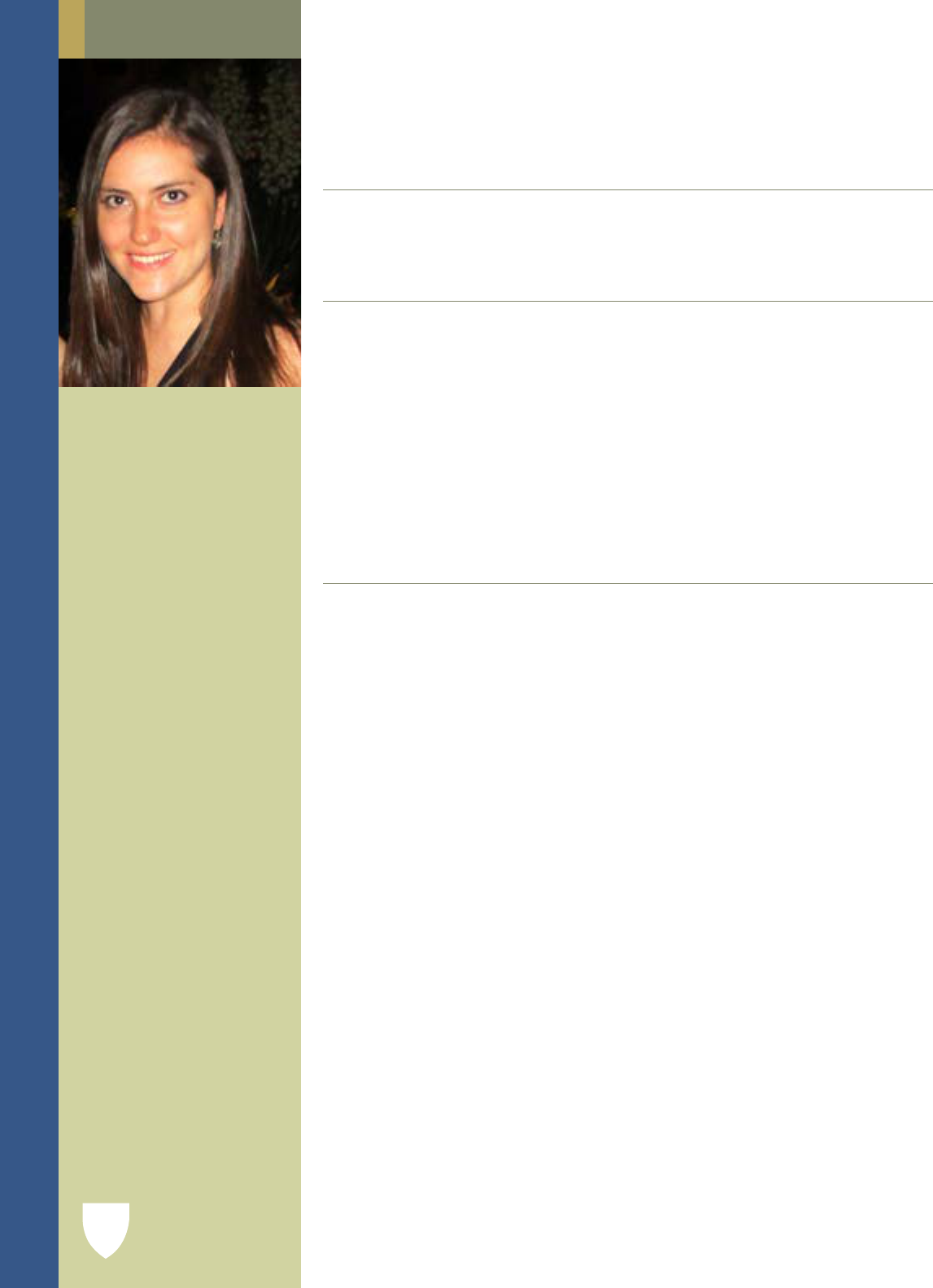
PROFILE BOOK 2013-2014
Zuckerman Fellows
Harvard University
40
KATEAITKEN
Harvard Kennedy School
Master in Public Policy Candidate
A H
Harvard Business School, M.B.A. Candidate
Yale University, B.A. in Political Science, Pi Sigma Alpha
P H
Barclays Investment Bank: Assistant Vice President, 2012 Barclays
Citizenship Award Winner for “Team Achievement of the Year”
Barclays Women’s Initiatives Network: Junior Advisory Council
Founder/Co-Chair
World Economic Forum: Global Shaper
Echoing Green: Social Investment Council Member
Belgian Ministry of Finance: International Finance Intern
Senator Hillary Rodham Clinton: Intern in the Department of the
State Director
N
Housing nearly half of Nairobi’s population on only ve percent of its landmass,
the urban slum of Kibera is the largest in Africa; yet the government provides no
public services to the settlement – no schools, health clinics, or basic sanitation.
My experience volunteering with a Kibera-based social enterprise called Shining
Hope for Communities has strengthened my commitment to a career in economic
empowerment and poverty alleviation. Shining Hope combats poverty and gender
inequality by linking tuition-free schools for girls with essential social services. I have
worked with over a dozen social enterprises, but Shining Hope’s integrated approach
and tangible impact is the example I turn to again and again when explaining why I
believe social enterprise can succeed where public policy and free markets have failed.
I am committed to leading the eort to eliminate global poverty by uniting the talents
and resources of both the public and private sectors. I learned of Shining Hope’s
mission in Kibera through my work on the Social Investment Council of Echoing
Green, a New York-based impact investing organization that provides seed funding
to Shining Hope and other social enterprises in over forty countries. In my three
years serving on the Council, I have advised over a dozen social entrepreneurs –
including Shining Hope’s co-founders – on improving their organization’s funding
and operational strategies, and I have experienced rst-hand how powerful business
acumen can be when directed to causes that truly matter.
I plan to pursue a career in impact investing where I can fund and support innovative
market-based ventures that advance social and economic opportunity in developing
economies. I am particularly interested in supporting enterprises that improve the
quality and availability of educational and business opportunities for traditionally
disadvantaged groups, such as women. By bringing private sector practices and
incentive-based approaches to today’s most pressing social challenges, I hope to provide
promising social enterprises with the support required to empower communities
and deliver eective solutions. e Zuckerman Fellowship will help me develop this
cross-sector perspective by immersing me in an educational ecosystem of passionate,
socially-conscious individuals who approach public issues from a variety of disciplines.
I look forward to a transformative year of collaboration and exchange.
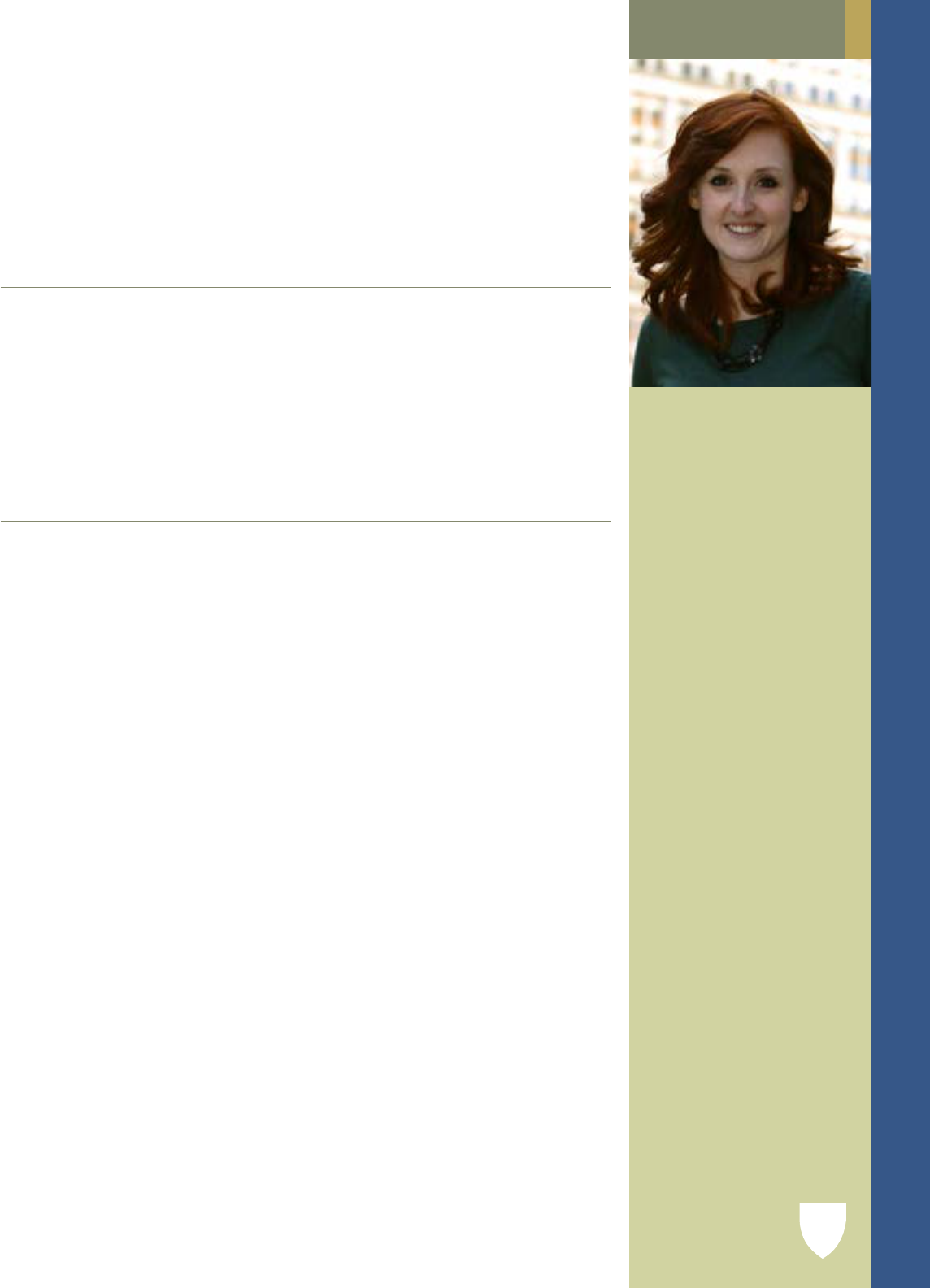
PROFILE BOOK 2013-2014
Zuckerman Fellows
Harvard University
41
KAILEYBURGER
Harvard Graduate School of Education
Master of Education Candidate in Education Policy and Management
A H
Washington University School of Law, J.D., cum laude
Truman State University, B.A. in Political Science, magna cum laude
P H
Gerry and Bob Virgil Ethic of Service Award, 2012
Washington University Public Service Student of the Year, 2013
Marshall-Brennan Constitutional Literacy Project: Co-founder, Washington
University Chapter
Washington University Journal of Law & Policy: Executive Articles Editor
Panelist, “Poverty and Promise in America’s Rust Belt,” Clinton Global
Initiative University, 2013
N
My formative experiences in public service can be traced to North St. Louis
neighborhoods devastated by unthinkable poverty and violence. As a volunteer,
basketball tournament director, and later, a community events coordinator for a city
Alderman, I fell in love with the tremendous spirit of North St. Louis. e kindness
shown to me by individuals in dire situations focused my commitment to public
service and emboldened me to advocate for change. I sought out legislative and
political opportunities, and as an intern in the Missouri Senate, I came to understand
the crucial role of law in addressing issues plaguing my community.
During law school, I became intensely focused on the intersection of juvenile justice
and education. I volunteered in Washington University’s Civil Justice Clinic, helping
represent juvenile oenders. During my internship, the clinic represented a 15-year-
old charged with rst-degree murder, facing life without the possibility of parole.
Assisting the defense of this young man opened my eyes to the startling and pervasive
injustices young people face in our legal system. Sentenced to 32 years in state prison
alongside adults, this young man’s fate compels me to prevent such fates for other
young people. In furtherance of this goal, I co-founded the law school’s chapter of
the Marshall-Brennan Constitutional Literacy project, teaching at-risk high school
students about the legal system and their fundamental rights. e chapter is slated
to reach several more schools in coming years, and was featured at the 2013 Clinton
Global Initiative University Conference.
During my second law school summer I continued working with young people in
Family Court with the New York City Corporation Counsel’s oce. e correlation
between failing schools, poverty, and delinquency was apparent. Beyond this, I saw
young people confused by the court system and unaware of their rights. Constitutional
literacy and educational engagement emerged, in my mind, as feasible solutions
in reducing delinquency and empowering at-risk youths. By combining my legal
background with a degree from Harvard’s Graduate School of Education, I am
hopeful that I can eectively advocate for enhanced civic education, particularly for
young people at risk of delinquency.
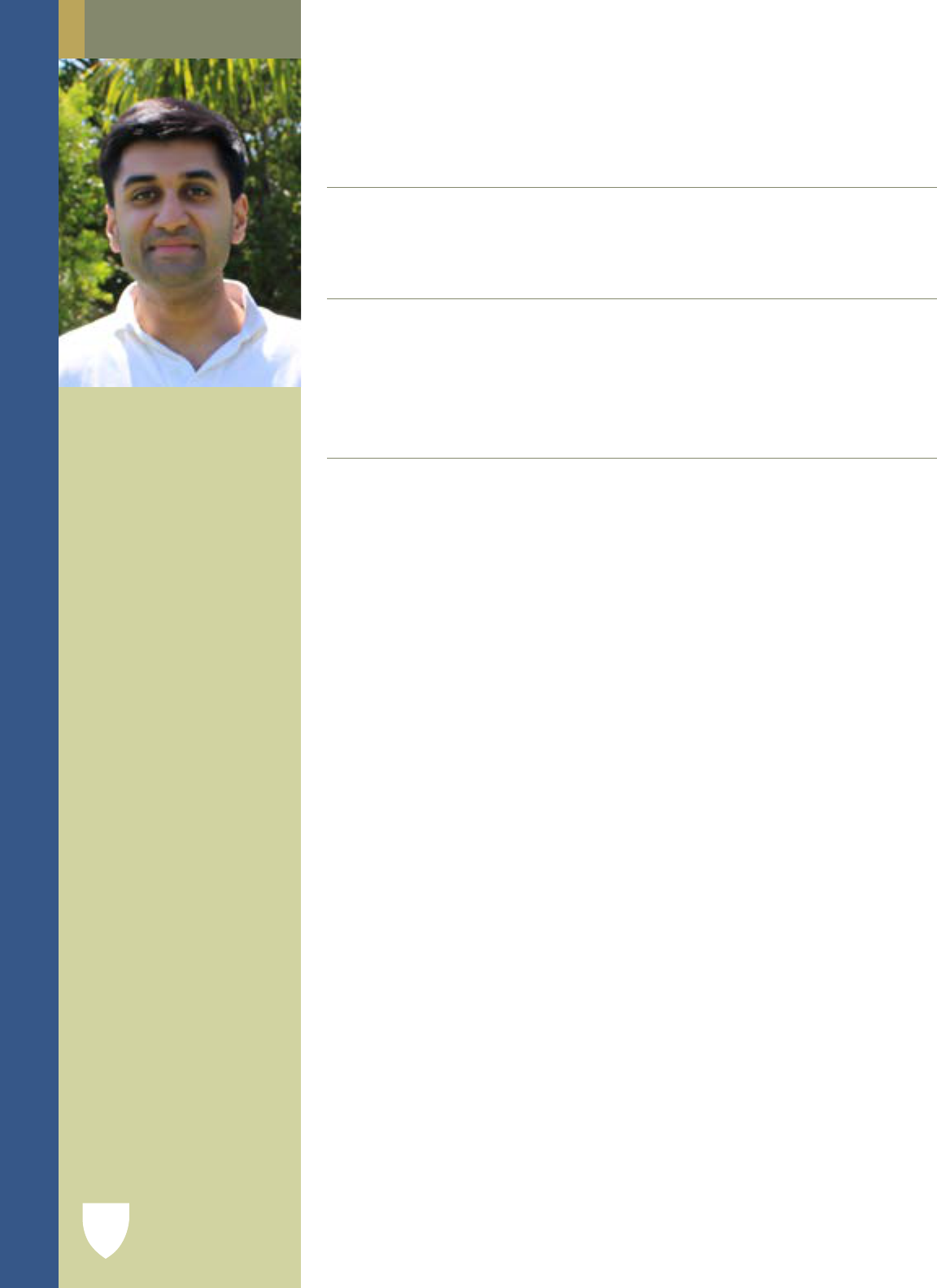
PROFILE BOOK 2013-2014
Zuckerman Fellows
Harvard University
42
SUDEEPDOSHI
Harvard Kennedy School
Master in Public Policy Candidate
A H
Harvard Business School, M.B.A. Candidate
Princeton University, A.B. in Public Policy, magna cum laude
P H
McKinsey & Company, New York: Engagement Manager
e Wall Street Journal, Hong Kong: Robert L. Bartley Fellow
Co-founder of NYEngage, a matching platform for McKinsey consultants
and New York non-prots
N
Near my childhood home in Mumbai, where my family still lives, is one of Asia’s most
populous slums. Dharavi is a world unto itself, a citadel of squalor that encapsulates
everything that can be devastating about the human condition. Many of its almost one
million residents live below the poverty line without access to clean water, electricity,
education or health care. And in an all-too-often-seen dichotomy that denes the
developing world, they do so in the shadows of modern skyscrapers where people –
like my family – have access to all this and much more. My life has taken me away
from Mumbai but my passion for correcting the type of inequality I witnessed there
has grown. Studying public policy at the Woodrow Wilson School at Princeton
opened my eyes to how global and pervasive this problem can be, and how solutions to
fundamental problems can have global impact and scalability.
My time at McKinsey & Company has allowed me to apply a private sector lens to
nding these solutions. In my three years as a consultant, I have seen how professional
development practices developed for multi-national companies can translate into
better support models for teachers in low-income areas, how lean manufacturing can
make our public infrastructure more sustainable and environmentally-friendly, and
how thinking about nancial concepts such as return on investment can change the
fundraising mindset for global diseases such as AIDS and malaria.
ere is so much to be gained by the cross-pollination of ideas between policy
and business, and we need more leaders that recognize this. With the Zuckerman
Fellowship at its core, my hope is that a joint degree between Harvard’s Kennedy
and Business Schools will help me develop into such a leader – someone driven by a
sense of purpose to reduce inequality of access and opportunity around the world, but
also informed by core business concepts that, as my time at McKinsey has started to
demonstrate, can be valuable in almost any professional context.
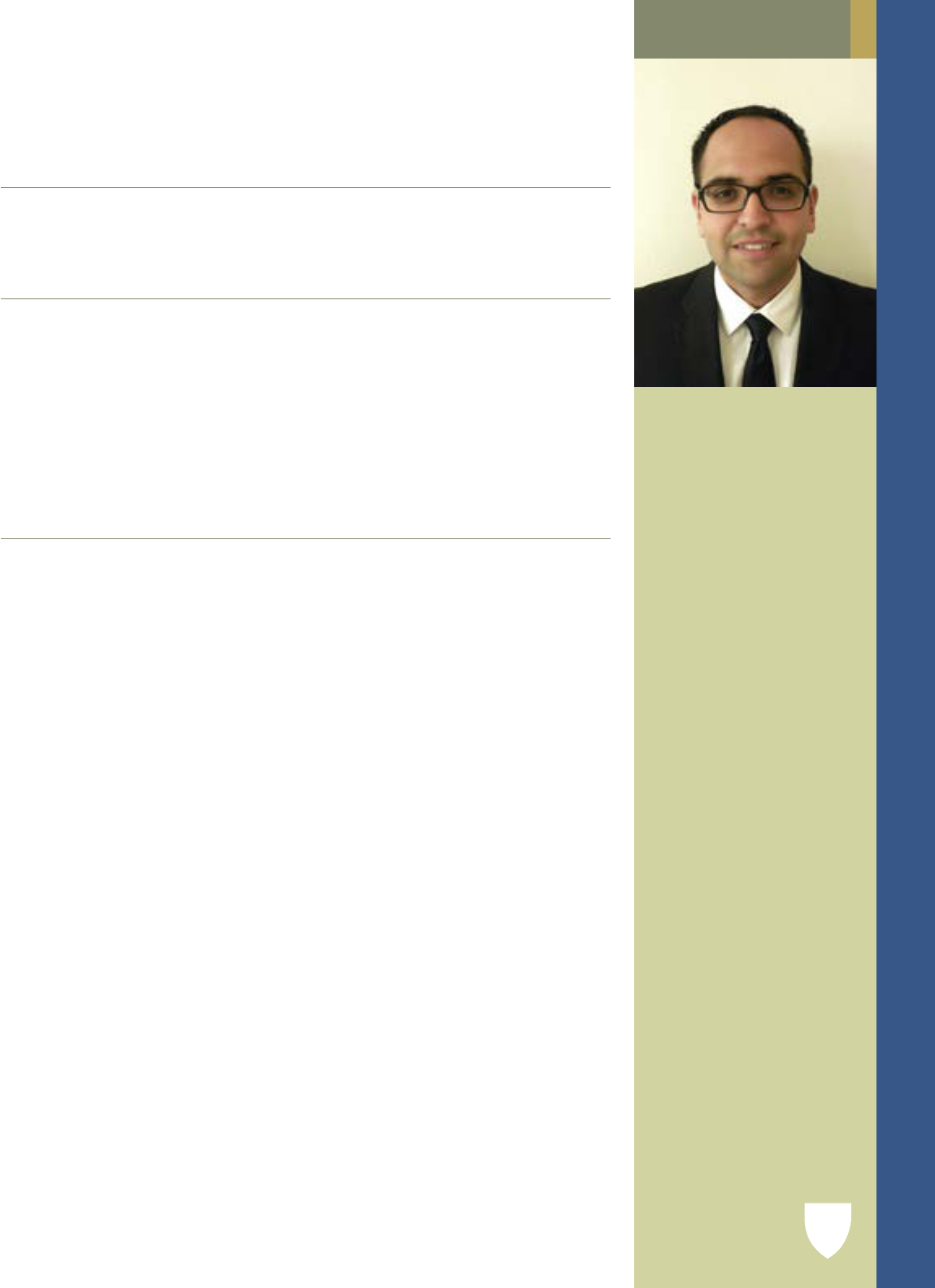
PROFILE BOOK 2013-2014
Zuckerman Fellows
Harvard University
43
MOISESMOY H.GALLEGOS
Harvard School of Public Health
Master of Public Health Candidate
A H
Stanford University School of Medicine, M.D. Candidate
Harvard College, B.A. in Neurobiology
P H
Phillips Brooks House Association (PBHA): Houston and Moreland Service
Award
Peer Health Exchange Harvard: Co-coordinator and Health Educator
Stanford Health Careers Opportunity Program: Teaching Assistant and Mentor
Stanford University Minority Medical Alliance: Mentorship Co-director
Stanford School of Medicine, Arbor Free Clinic Screen Team: Co-coordinator
e Valley Foundation, Santa Clara: Medical Student Fellow
N
Growing up without health insurance, and believing it a luxury not likely to exist
in the near future, my family came to see healthcare as something we wished we
would never need rather than something we desired. Unfortunately, illness happens,
especially in the setting of less than perfect knowledge of basic preventive practices
like proper dental hygiene and healthy eating. On these occasions we sought care in
the best ways we could, ways that I now accept as examples of things to be addressed
in healthcare reform: trips to the emergency room with non-emergent conditions,
sharing of medications prescribed to others, visits from the “doctor” who practices
door-to-door medicine for a nominal fee. I believe strongly that for immigrant or
underserved individuals, families like my own, access to healthcare is only part of the
solution to health inequities that divide our communities.
Teaching health workshops in Boston high schools helped me realize that poor health
decisions are often made not out of carelessness but out of lack of understanding.
Teens who never learned about sexually transmitted infections, the eects of alcohol
or drugs, or the reality of mental illness may handle such challenges in less than ideal
ways. As a health navigator in a community clinic I witnessed the diabetic patient
justify medication non-compliance by thinking “one day won’t make a dierence,”
and the obese patient shyly smile while recounting yet another failed attempt at diet
modication. Inspirationally though, these same patients convert to empowered
managers of their health when the time is taken to explain the pathophysiology of
their disease and the reasoning behind treatment. Health education, in the clinical,
community, and school setting, oers an opportunity to enhance preventive medicine.
I hope to develop a career as a physician-educator, practicing medicine rst-line as
well as preventing illness through patient and community education.
I believe education is important to healthcare reform, but so is development of
advocacy, policy, and medical training. e Zuckerman Fellowship represents an
opportunity to deconstruct healthcare from various professional angles alongside
amazing colleagues, so that in collaboration we may construct multidisciplinary
solutions to address health disparity.
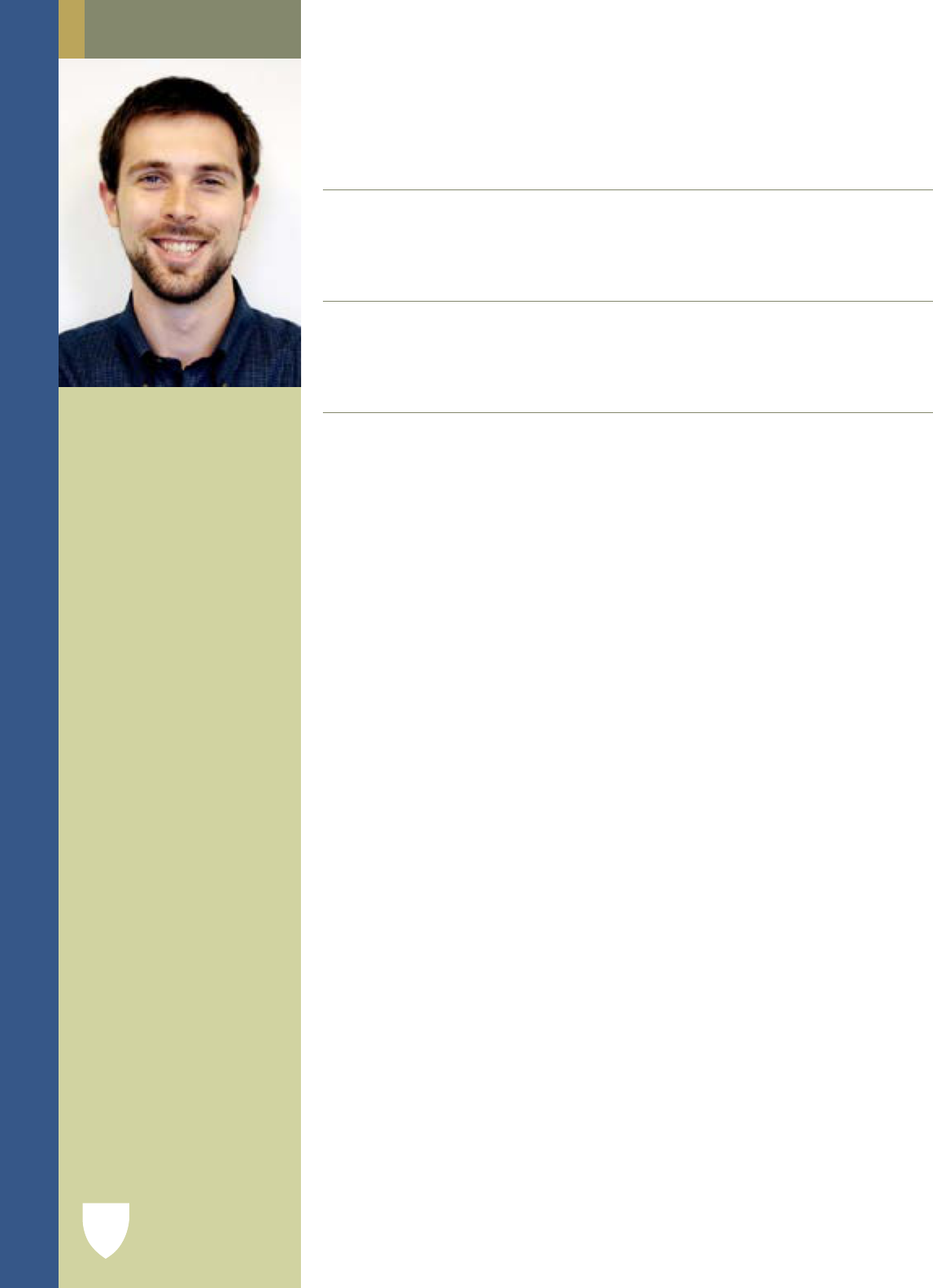
PROFILE BOOK 2013-2014
Zuckerman Fellows
Harvard University
44
MATTHEWGROWDON
Harvard School of Public Health
Master of Public Health Candidate
A H
Harvard Medical School, M.D. Candidate
Harvard College, A.B. in History and Literature, summa cum laude
P H
UCSF Memory and Aging Center: Clinical Research Coordinator
Partners in Health, Huehuetenango, Guatemala: Project Co-Leader
N
Working with patients aected by dementia armed my commitment to entering the
medical profession and alerted me to one of the most pressing social issues of our time:
the rapidly aging world population, with its prevalence of chronic non-communicable
diseases and its profound demographic eect on health systems. Following college, I
worked at the UCSF Memory and Aging Center as a research coordinator for a study
comprising patients with Alzheimer’s disease and frontotemporal dementia. Even
more than the clinical research aspects of our work, the most lasting impressions from
my time at UCSF were the health policy implications of Alzheimer’s disease, which is
projected to aect 1 in 85 individuals globally by 2050.
Since beginning medical school, I gained hands-on experience with the systemic
management of chronic diseases in rural Guatemala, a setting far removed from
the UCSF clinics. During the summer of 2011, a medical school classmate and I
collaborated with Boston-based Partners in Health to train a group of Guatemalan
community health workers in the diagnosis and management of diabetes and
hypertension. Our project pushed me to consider the most eective ways to bring
knowledge gained in medical school to health workers. Despite the many logistical
barriers hindering the treatment of chronic diseases in a rural setting, our experience
supported the promising contention that community health workers represent one
piece of a feasible solution to the global epidemic of chronic diseases.
Obtaining a MPH degree at Harvard School of Public Health will enable me to
contribute to the ongoing eort to implement a health system prepared for the crushing
burden of chronic non-communicable diseases. I am eager to gain the analytic skills
needed to conduct population-level research with direct relevance to health policy, and
to devise solutions to the seismic demographic shifts facing our country. Specically,
I wish to build health systems that provide early diagnosis, genetic counseling, and
treatment for patients with dementia and psychosocial support for caregivers. To
do so as a Zuckerman Fellow represents the invaluable opportunity to develop the
broadening skills of public health alongside inspiring colleagues from a diverse array
of professional backgrounds.
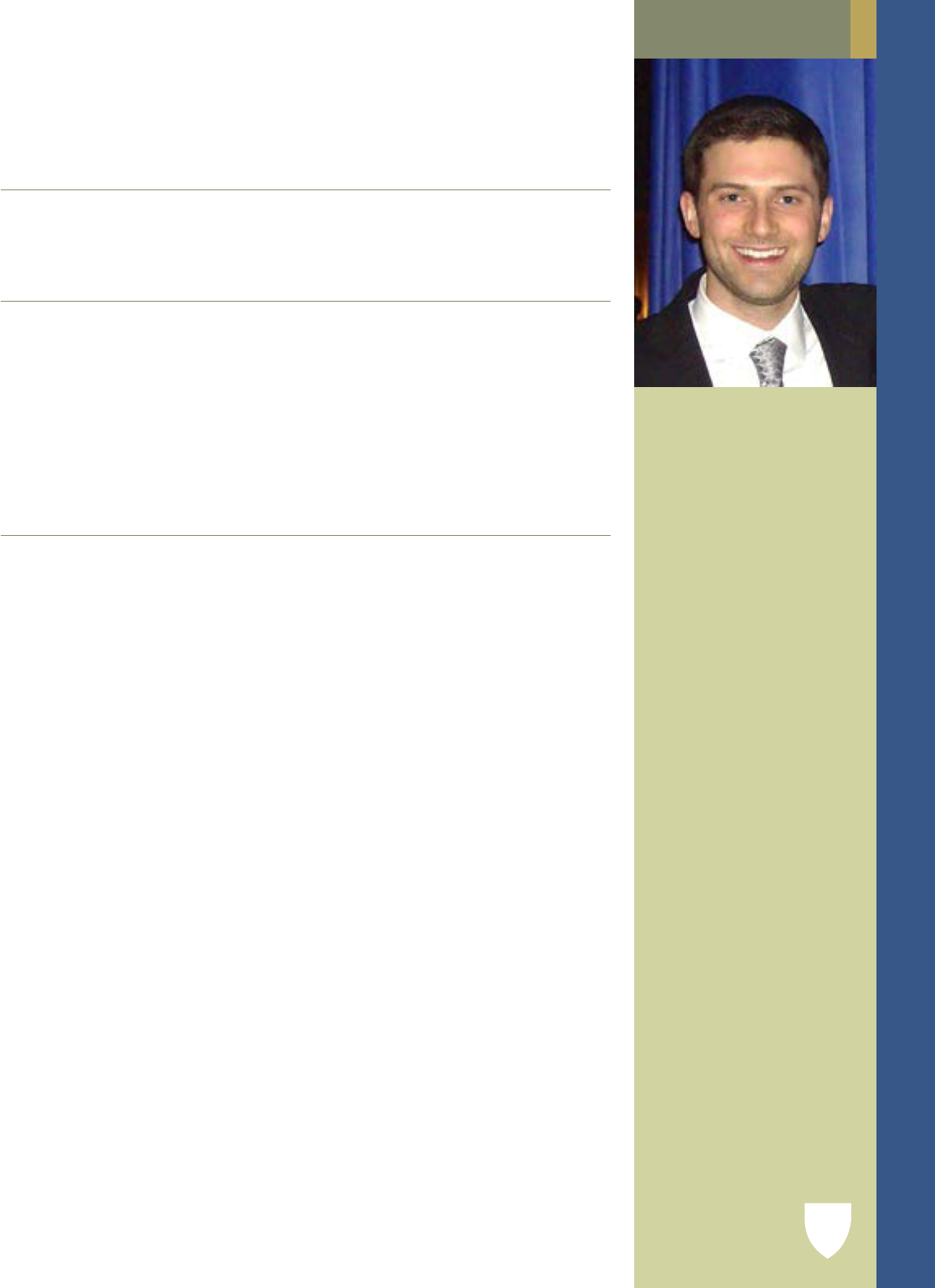
PROFILE BOOK 2013-2014
Zuckerman Fellows
Harvard University
45
JOSHUALIPSKY
Harvard Kennedy School
Master in Public Administration Candidate
A H
Georgetown University Law Center, J.D. Candidate
Columbia University, B.A. in Political Science
P H
e White House, Executive Oce of the President: Associate Director of
Press Advance
e White House, Executive Oce of the President: Associate Director,
Visitors Oce
Obama for America 2008: National Advance Sta
e Daily Show with Jon Stewart: Election 2008 Intern
CNN: Political Unit News Assistant
N
At fteen years old, I was fortunate to earn an internship in the oce of Congressman
Sam Farr of California. My rst day of work was September 10, 2001. e next day, the
world changed. My new oce was a terrorist target and yet I found myself rushing out
of geometry class to jump on the Metro and head to the Capitol. My years spent on
the Hill taught me what public service is all about – passion for helping build a better
country and a better world.
In college I explored my interest in political communications. From CNN to the Daily
Show I learned rst hand about how media narratives are shaped by leaders to advance
their policy proposals. In 2008, like many of my peers, I dropped my bags at home and
joined the campaign of a young senator from Illinois who spoke for my generation.
My experience at the White House took me across the globe from a war zone in
Afghanistan to the halls of Buckingham Palace, to the G-20 Conference in Seoul,
Korea. is amazing opportunity showed me exactly how I could contribute to the
political process in the future.
One of the major problems in America today is the inability of policy experts to eectively
explain how legislation can positively impact people’s everyday lives. I believe the
experts must become better communicators and the communicators need to understand
the policies they are trying to explain. e concurrent study of both law and public
administration will help me begin to bridge the gaps in the language of our politics.
My long-term goal is to help craft and support desperately needed public initiatives,
including restructuring our education system via teacher recruitment and nally
creating a national energy smart grid. ese projects can only succeed when the best
solutions meet the best explanations. No strategy in our complicated world explains
itself. at’s the lesson learned from my years working in public service, national media
and political activism. rough the Zuckerman Fellowship and my studies at Harvard
Kennedy School, I hope to utilize the lessons of my experiences and the wisdom of my
fellow students to develop new answers to the world’s challenges.
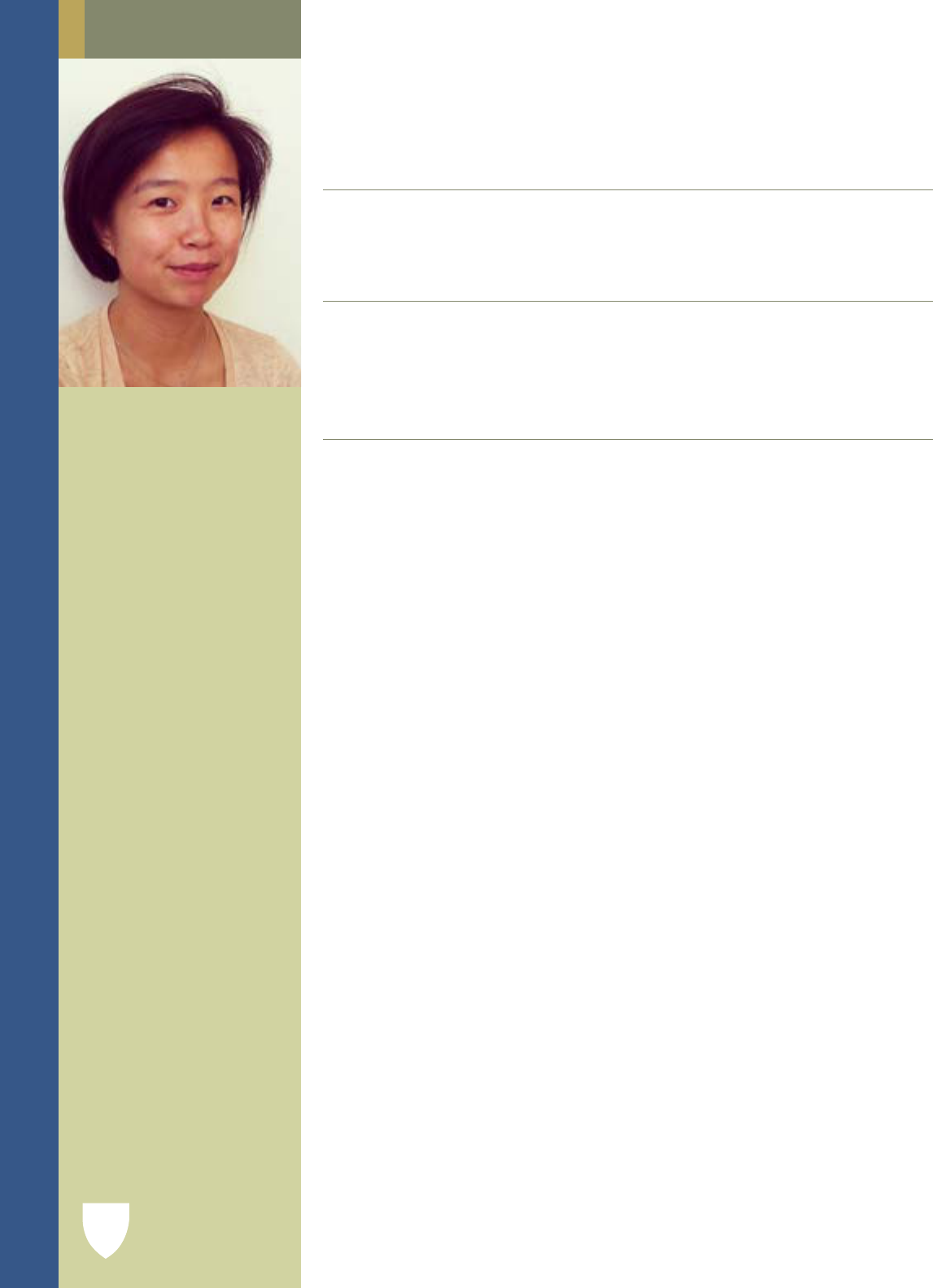
PROFILE BOOK 2013-2014
Zuckerman Fellows
Harvard University
46
LYDIALO
Harvard School of Public Health
Master of Public Health Candidate
A H
University of California, Los Angeles, M.D. Candidate
Harvard College, B.A. in Social Studies, cum laude
P H
Mobile Clinic Project at UCLA: Coordinator
Phillips Brooks House Association at Harvard University: Vice President
Chinatown Citizenship: Director
N
I got my start in public service as a volunteer teacher, preparing recent Chinese
immigrants for the US naturalization exam while a college student in Boston. As the
child of parents who left China in the wake of the Cultural Revolution, I felt a deep
connection with their desire to become citizens. As I spent more and more time in
Boston’s Chinatown, I also tutored elementary and middle school students and was a
counselor for a summer camp.
My mentors and classmates at the Phillips Brooks House Association at Harvard, the
parent organization for those Chinatown groups, showed me how to turn my love of
teaching in Chinatown into a more substantial commitment to public service. Having
honed my leadership skills there, I went on to become a director for the citizenship
program, to serve on PBHA’s ocer committee as the afterschool program coordinator,
and nally as the executive vice president for the organization.
Branching out into global health also taught me important lessons about implementing
successful public service programs. With the Clinton Health Access Initiative in
Malawi, I led a team in providing the rst set of aggregate data on the country’s ve-
year-old antiretroviral program.
As a medical student, I have seen exciting opportunities for organizational change
as a means to improve healthcare delivery in underserved communities, such as my
work with the homeless at the Mobile Clinic Project at UCLA. What fascinates me
about healthcare for the underserved is that we already have the clinical answers; we
have simply lagged behind in implementing them to the benet of all. I hope that
the Zuckerman Fellowship will help me develop the skills to build, organize and lead
health systems that will not fail future patients.
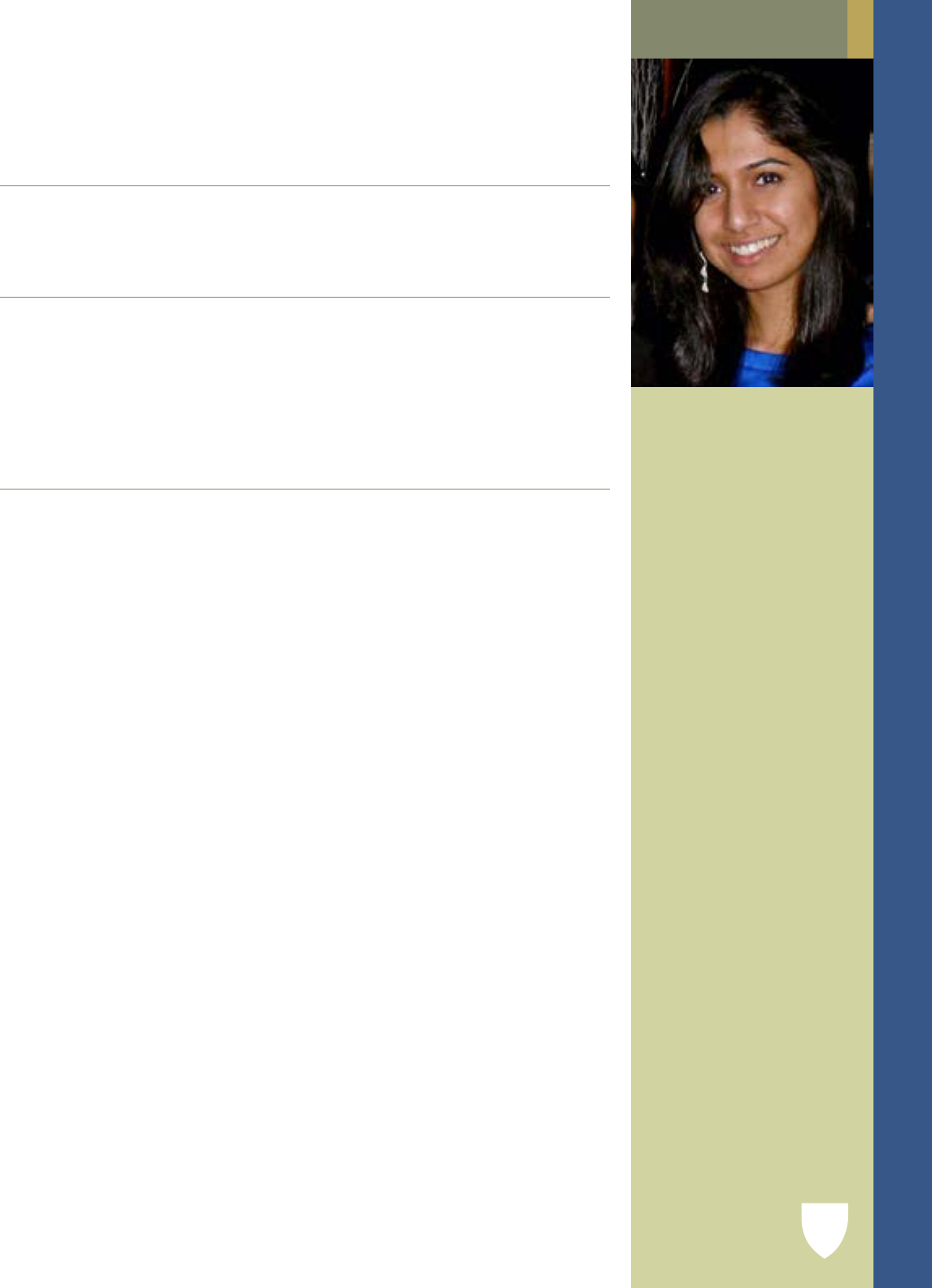
PROFILE BOOK 2013-2014
Zuckerman Fellows
Harvard University
47
DIVYAMALLAMPATI
Harvard School of Public Health
Master of Public Health Candidate
A H
Harvard Medical School, M.D. Candidate
Northwestern University, B.A. in Anthropology and Global Health
P H
Fulbright Fellowship, India, 2009-2010
Tiyatien Health: Volunteer
Clinical Topics in Global Health: Student Course Co-Coordinator
e Freedom Foundation: Researcher
GlobeMed: Founding Member and Director of Education and Training
N
Growing up, my father and I spent every Saturday morning with a globe. We would
spin it and my arm would approach in a wild wave until my nger would stop it,
revealing a country or region. For the rest of the day, two eager explorers in a suburb
of Dallas would scour books, movies, and magazines to learn about that place, its
tradition, culture, wildlife, history, politics, and people. From a young age, my curiosity
in others, my observations of the diverse ways in which we live and interest in the
commonalities of the human experience shaped my trajectory.
As an anthropology major and founding member of a non-prot in college, I was
able to explore these childhood interests in both a theoretical and practical manner.
In classes about the anthropology of violence, gender, and global health, I discovered
and explored the impact of social and political inequality on women, their families,
and their communities. e contrast to classroom debates and analytical papers was
building a national organization, GlobeMed, and forming a network of universities
and college students interested in engaging in global health in responsible and eective
ways. As a director, I learned to manage teams, establish successful projects, and, most
importantly, work in partnership with my peers both locally and internationally.
My senior thesis work on the national family planning program in India enabled me to
further my study of women’s health, access to medical care, and political discourse as a
Fulbright Fellow. In medical school, I have been fortunate to nd passionate colleagues
and dedicated mentors who have encouraged work in diverse settings from Boston
to rural Liberia and in varied elds such as economic empowerment and health care
delivery. All have shaped strong convictions and a dedication to integrate medicine
with my background as an anthropologist in order to understand how health care can
be delivered in the most responsive of manners for women and how clinical care can
inform policy decisions in community, national, and international spheres. I am excited
to not only to pursue an MPH but also to embark on this journey with my co-fellows!
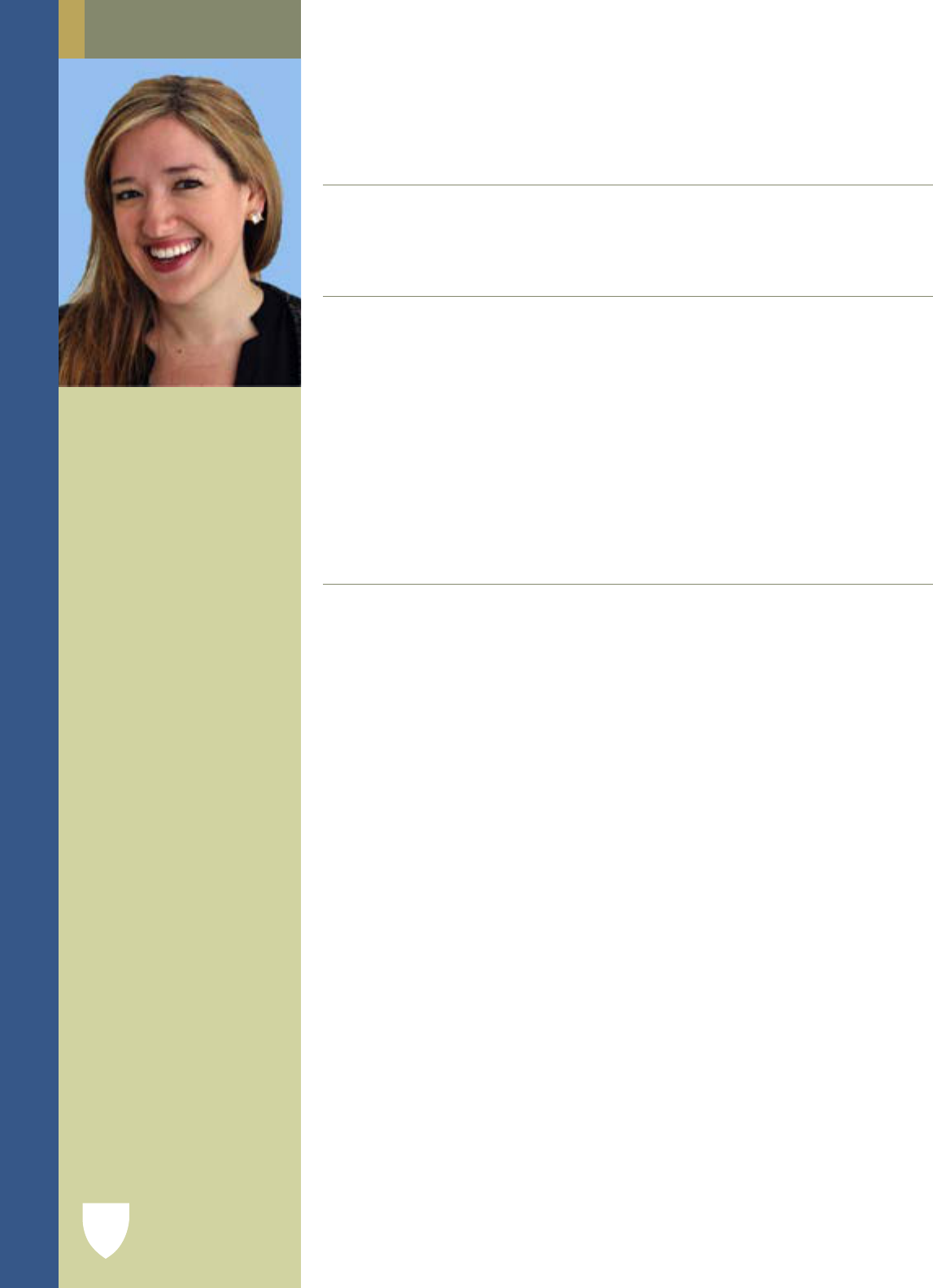
PROFILE BOOK 2013-2014
Zuckerman Fellows
Harvard University
48
CAROLINEMAULDIN
Harvard Kennedy School
Master in Public Administration Candidate
A H
MIT Sloan School of Management, M.B.A. Candidate
Tufts University, B.A. in International Relations, cum laude
P H
e Omidyar Network: Summer Associate
Open Government Partnership Support Unit: Acting Director
US Department of State: Speechwriter and Special Assistant to the Under
Secretary for Civilian Security, Human Rights, and Democracy
Accion International: Board Liaison and Special Assistant to the President
& CEO
Truman National Security Project: Fellow
MIT Sloan Entrepreneurs for International Development: Co-President
Love Grain, LLC: Co-Founder
N
We are all creatures of language—individuals dened by the words we use, speak, write,
and hear. Each of us makes two choices in every interaction: how to convey thoughts into
words, and how to respond to the words of those around us. With these choices, we can
either convene or alienate, and it is the compilation of these choices, made well over the
course of a lifetime, that dene our capacity for impact.
Working for the global micronance organization Accion International, I learned that
smart business people—bankers—could speak the language of the poor, and vice versa. In
nding a shared language—one grounded in common sense and dignity—micronance is
providing a path out of poverty for millions.
When I moved to the State Department, my environment changed considerably. In the
midst of complex policy decisions, a language of hope and common sense would no longer
cut it. As a speechwriter, I quickly learned the importance of nuance: choose the wrong
word, and trigger the corrosion of foreign relations.
Eighteen months into my tenure at State, I was asked to help develop and launch a new
initiative on President Obama’s foreign policy agenda: the Open Government Partnership
(OGP). First envisioned by National Security Sta at the White House, the initiative
sought to elevate openness as the foundation for stronger societies. With only six months
to ready the initiative for the President’s launch event, I became an emissary for open
government, immersing myself in the language of good governance. I quickly learned
that openness meant many things to many people: to some, it meant demanding more
accountability from elected ocials, to others it meant using government data to drive
private sector innovation. I understood that our success was contingent on listening to
every party at the table, using their words to determine our collective language for OGP.
OGP now counts nearly 60 countries among its ranks with over 100 civil society
organizations supporting the implementation and accountability of country commitments.
Despite scarce resources and consistent roadblocks, we ultimately negotiated the rst-
ever international declaration on open government principles and triggered a shift in the
international conversation around good governance.
Language chosen carefully is never more important than when bringing disparate ideas together.
I can think of no better way to maximize my graduate education at MIT Sloan and Harvard
Kennedy School than through the Zuckerman Fellowship, in which public servants from all
backgrounds come together to create a shared community and language for the greater good.
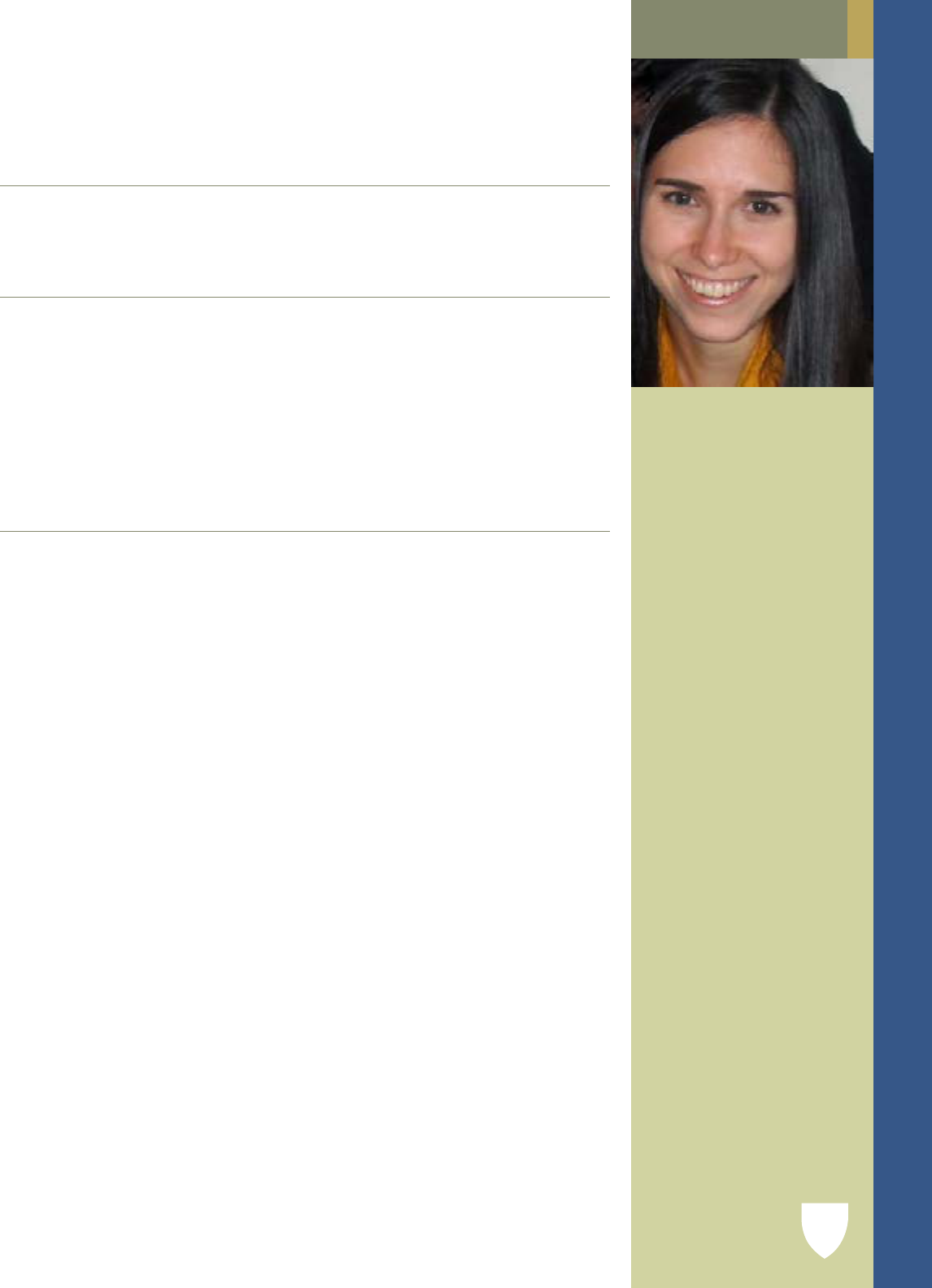
PROFILE BOOK 2013-2014
Zuckerman Fellows
Harvard University
49
JULIANA E.MORRIS
Harvard Graduate School of Education
Master of Education Candidate in Special Studies
A H
Harvard Medical School, M.D. Candidate
Vassar College, B.A. in Science, Technology, and Society
P H
La Clínica del Pueblo: Language Access Policy Advocate
National Institute of Public Health of Mexico: Migration Research Fellow
Student Immigrant Movement of Massachusetts: Community Organizer
American Medical Student Association: National Education Equity Initiative
Founder
Race in the Curriculum Working Group at Harvard Medical School:
Co-Founder
N
Ever since I was a child volunteering alongside my parents at the local soup kitchen, I
knew that I wanted to dedicate my life to helping others. In college I decided to pursue
a career in primary care medicine and sought out an internship at an inner-city health
clinic. Here, my eyes were opened to the health burdens and barriers to care that the
poor, mostly immigrant patients of the clinic experienced. As I listened to their stories,
I began to see that the roots of their health inequities lay in a range of social factors
and policies; thus it would take systemic policy solutions to begin to reverse them.
When I got word of a large march through the streets of the city to protest a punitive
national immigration bill, I was on the front lines, marching alongside the clinic sta
and patients. By the end of the march, I was committed to making advocacy for health
equity a prominent part of my future career as a physician.
I’ve pursued my interest in advocacy in various ways. After college, I moved to Mexico
to volunteer in migrant shelters with a human rights NGO. e following year, I
worked in Washington DC as an advocate for increased immigrant inclusion in health
reform. Since moving to Boston, I’ve gotten involved in local community organizing
to promote access to education for undocumented students and to expand workplace
rights for domestic workers. I’ve also developed my leadership within the medical
community, becoming a National Coordinator within the American Medical Student
Association (AMSA) to promote health equity education among medical students.
roughout these experiences, I’ve been struck by the power education wields in
work for social change, whether it’s educating stakeholders in a campaign or teaching
patients about community health. As a Zuckerman Fellow, I will pursue a Master of
Education in Special Studies, with a focus on Popular Education and Community
Empowerment. ese academic studies, combined with the exposure the Fellowship
provides to a community of innovative thinkers and change-makers, will help me
enhance my eectiveness as a primary care physician advocate.
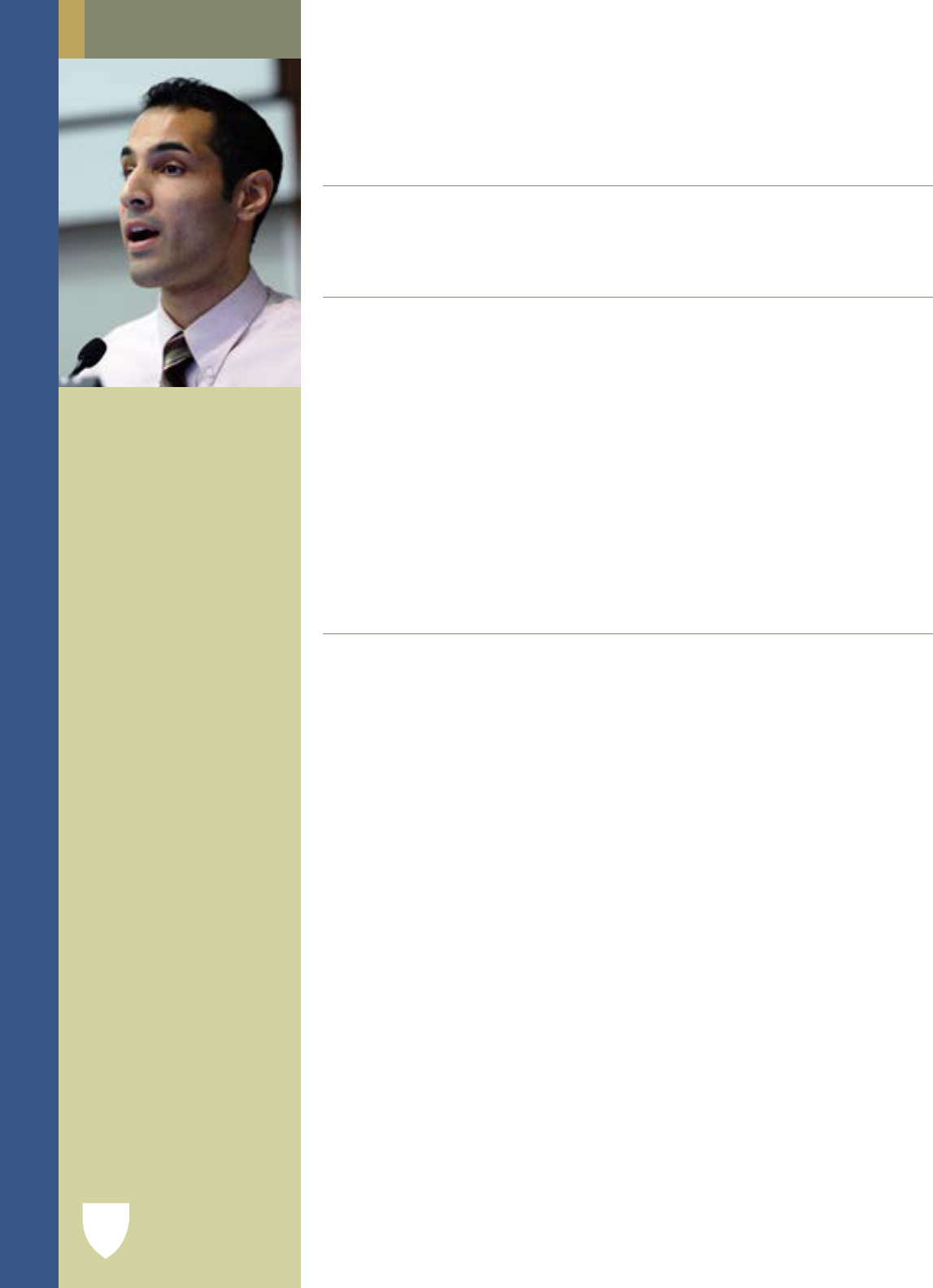
PROFILE BOOK 2013-2014
Zuckerman Fellows
Harvard University
50
ATULNAKHASI
Harvard Kennedy School
Master in Public Policy Candidate
A H
Johns Hopkins University School of Medicine, M.D. Candidate
University of Iowa, B.S. in Neurobiology
P H
Medical Student Section of American Medical Association: National Student
Chair
Hopkins Medicine Distinguished Speaker Series: Founder
World Health Initiative 501(c)(3): Founder
American College Health Association: National Student Chair
University of Iowa College Democrats: President
Iowa City Person of the Year
“e Most Sought-After Young Man in Iowa” by ABC World News &
“Iowa’s Campus Kingmaker” by Wall Street Journal
Interviewed by Good Morning America, CNN American Morning,
NPR Weekend Edition, BBC e World Today
N
When I was elected President of the University of Iowa College Democrats in April
2007, student activism looked hopeless. e organization had an inconsequential
presence on campus, limited resources, and meager student involvement – eight people
were present on the day I was elected. However, instead of becoming discouraged by
our dwindling existence, I saw an opportunity to awaken a sleeping giant.
Over a series of nine months we relentlessly organized students, sparking unprecedented
student engagement and magnifying our traditionally marginalized voice. In the end,
we were able to be a part of the historic turnout of over 63,000 students on that cold
winter night on January, 3rd of 2008 for the Iowa Caucuses.
is experience brought me toward self-reection and personal struggle to understand
just what type of impact I wanted to create in our world. It forced me to think beyond
the traditional connes of my customary Indian family and the standard expectations
of becoming a doctor while taking the safest life path forward. I became inspired to
bring life to communities underappreciated and overlooked in public discourse.
After graduating in 2009, the debate around health reform was rapidly heating up
for our country, and I set forth to Washington, DC to work in health policy. I quickly
became frustrated by how often physicians, and especially medical students, were
marginalized in the health reform debate. Memories from Iowa of student apathy and
disengagement reverberated in me once more, and I set forth to change this – this
time for our patients. Currently, in my third year of medical school, I believe we are
our patients’ greatest advocates. I want to make this a reality in the public sphere. It
is my vision to mobilize physicians across this country to engage in the public debate
on healthcare – 365 days a year, 7 days a week – on behalf of our patients and citizens.
e Zuckerman Fellowship will catalyze this vision for me, allowing me to forge
life-long bonds with individuals who see the world as I do, who expect more from
themselves than simply what their profession demands of them, and who desire to
leave this world a better place than when they came into it.
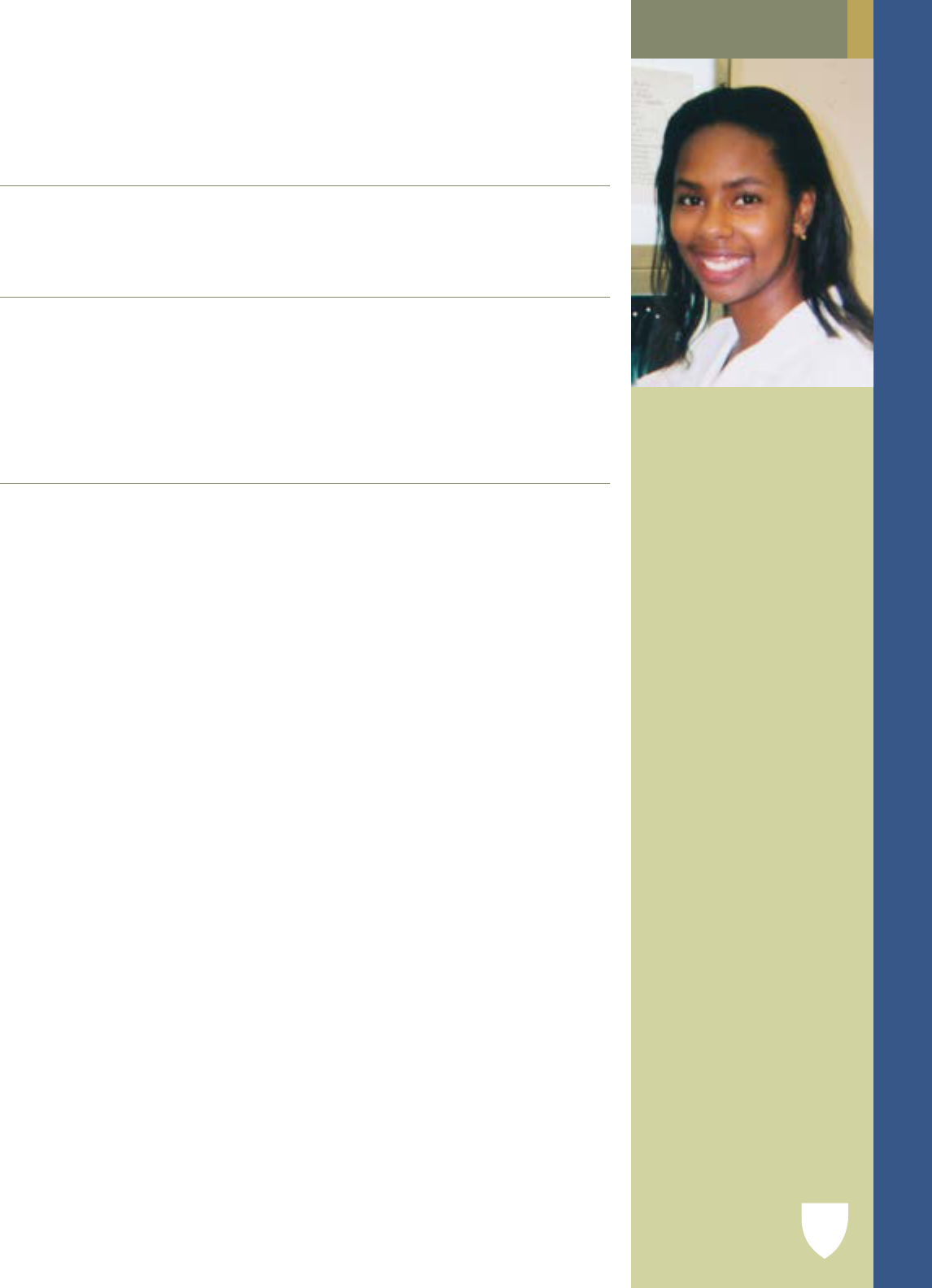
PROFILE BOOK 2013-2014
Zuckerman Fellows
Harvard University
51
CARRIEPEEK
Harvard Graduate School of Education
Master of Education Candidate in Mind, Brain, and Education
A H
New York Medical College, M.D.
Harvard University, A.B. in Biology
P H
Harvard Medical School: Clinical Fellow in Neurology
Boston Children’s Hospital/Harvard Medical School: Behavioral Neurology
Fellow
Boston Children’s Hospital/Harvard Medical School: Child Neurology Resident
Sinai Hospital: Pediatric Resident and Attending Physician
N
At this point in my career in medicine, I have had the privilege to actively participate
in improving the well-being of children. Most recently, as a child neurologist
specializing in the eld of behavioral neurology, I evaluate and care for children with
developmental delays, academic diculties, learning disabilities, autism spectrum
disorder, and attention decit hyperactivity disorder. With my background in general
pediatrics, child neurology, and behavioral neurology, I bring a unique perspective to
the study of educating children with disabilities.
As a child neurologist with a strong interest in helping with management of children
with educational issues, the Master of Education program in Mind, Brain, and
Education at the Harvard Graduate School of Education will provide me with the
opportunities to further study the academic challenges of children with disabilities
from an educator’s point of view as well as to learn ways to positively impact their
academic experience. is in turn will allow me to develop a new perspective with
which to evaluate and assist children with developmental delays, behavioral problems,
and learning disabilities.
As a child neurologist, I have the opportunity to travel within the country to give
presentations regarding management of children with disabilities. e Zuckerman
Fellowship program will provide more opportunities for me to share important
management considerations for these children within the public sector as well as with
other health care professionals. us, as an educator, I will continue to be a strong
advocate for children so that they can achieve their full potential.
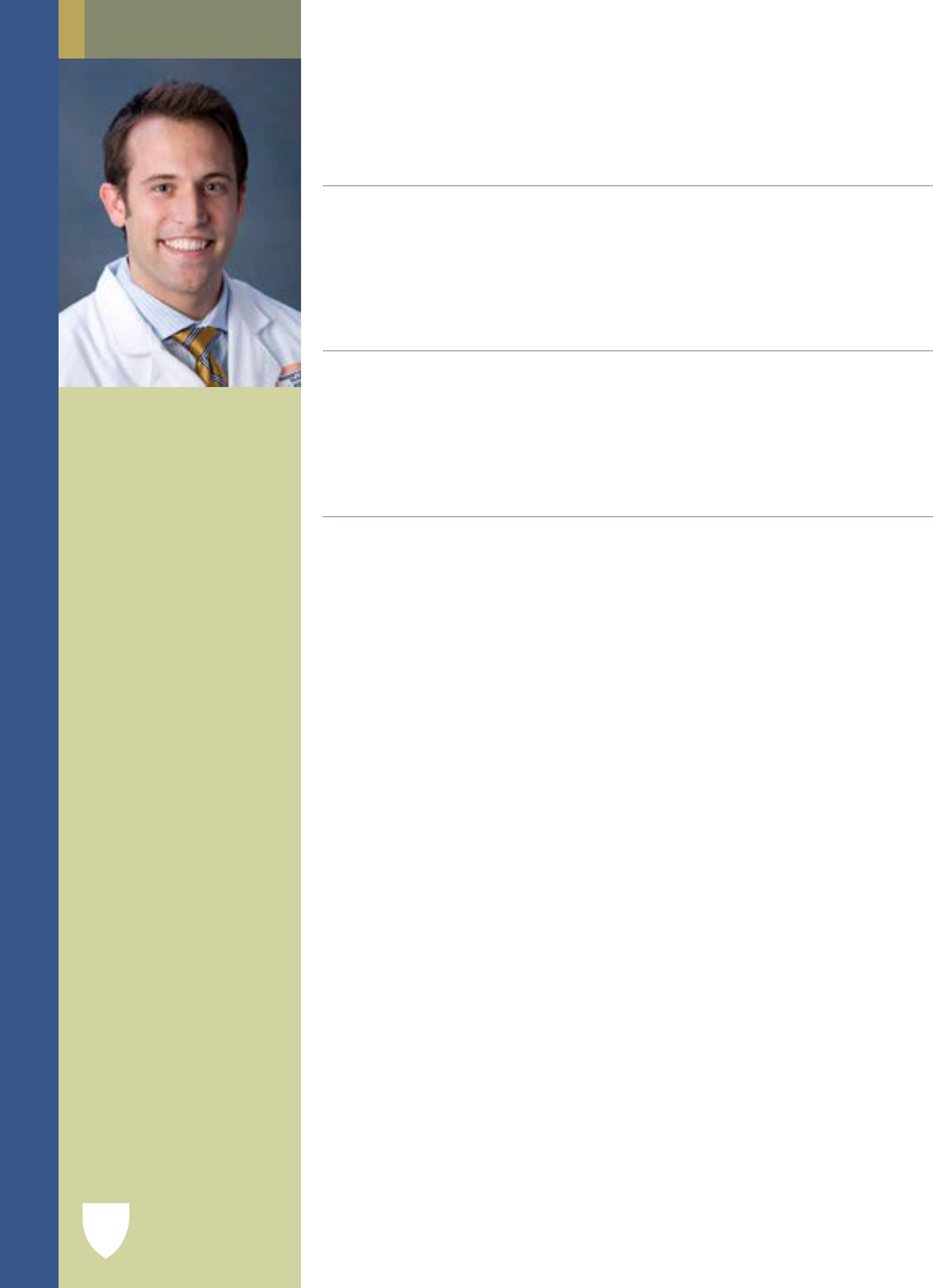
PROFILE BOOK 2013-2014
Zuckerman Fellows
Harvard University
52
JOHN G.PHILLIPS
Harvard School of Public Health
Master of Public Health Candidate
A H
Harvard Radiation Oncology Program, PGY-4: Resident in Radiation Oncology
University of Tennessee Chattanooga: Transitional Year Residency
Vanderbilt University School of Medicine, M.D., Alpha Omega Alpha
University of Alabama, B.S. in Chemistry, summa cum laude
P H
Truman Scholar
National Cancer Institute: C-Change Fellow
Canby Robinson Society: Medical Scholar
Howard Hughes Medical Institute: Undergraduate Research Fellow
N
My family is from a town of around 750 people on Sand Mountain, the Southern tip of
the Appalachian Mountain Trail, in Northeast Alabama. At a young age, I witnessed
the eects of cancer on families and the spectrum of care aorded to patients in this
country. I very quickly gained an appreciation for the importance of all aspects of
oncology and I have explored the cancer world through a wide variety of lenses.
As a Radiation Oncology Resident, I spend most of my days working directly with
cancer patients. I see patients in all stages of their illness, from those newly diagnosed
with curable disease to those in need of palliation at the end-of-life. e day-to-day
interaction with families is exceptionally rewarding. I have also been fortunate to have
excellent mentors at every point in my education who taught me how to combine
clinical skills with a curiosity for research. rough this collaboration, I have helped
develop new drug delivery systems, researched new protocols for novel therapies, and
dened risk factors which predict outcomes in certain cancers.
As a Truman Scholar, I spent time in DC examining the much broader eects of
our healthcare and research policies. I witnessed rsthand the opportunity for impact
beyond the clinic. As a Zuckerman fellow, I am pursuing the degree of Master of Public
Health with a concentration in Health Policy to equip me with the skills necessary
to both design and run eective cancer clinical trials, as well as to understand the
underlying mechanisms which guide our research policies in this country. I am most
excited about collaborating with Zuckerman fellows from other elds, and gaining
insight and strategies from their unique perspectives.

PROFILE BOOK 2013-2014
Zuckerman Fellows
Harvard University
53
AARON R.QUARLES
Harvard Kennedy School
Master in Public Policy Candidate
A H
Harvard Medical School, M.D. Candidate
University of Notre Dame, B.A. in Psychology, magna cum laude
P H
e Family Van Mobile Health Clinic: Research Fellow
Black Health Organization: Co-President
Health Profession Recruitment and Exposure Program: Executive Committee
Brigham and Women’s Hospital Department of General Medicine:
Research Assistant
Race in the Curriculum Working Group: Co-Founder
N
My struggle for racial identity and my background have given race and inequality
central roles in my life. As a biracial male raised by a white mother in a black
neighborhood who attended schools that remain segregated, there was simply no gray-
zone to occupy. In my neighborhood, schools were underfunded, drugs and gangs were
pervasive, and unemployment was the norm. My family was not shielded from these
realties—I watched as loved-ones battled addiction, fell victim to violence, lost their
employment, or spent time behind bars. Mine is not a singular experience, but one
shared by far too many communities across this nation.
Having been granted tremendous educational opportunities, I dedicated myself to
learning about inequalities in neighborhoods like mine. Combining that with interests
in science and a desire to serve, I envision a career as a physician-advocate—exploring
the socio-economic and political contributions to disease and working tirelessly (within
healthcare and beyond) to combat disparities and give voice to marginalized communities.
At HMS, my interests and passion have continued to evolve. Research opportunities
oered new ways to channel my energy and curiosity toward health disparities. I helped
lead an expansion of an educational program for minority high school students. rough
a science curriculum and a mentored research project, we inspire young people to imagine
careers in health sciences. I joined colleagues in an eort of curricular reform regarding
racism and health disparities. And while rotating through hospitals, I am increasingly
aware of systemic contributions to the diseases and outcomes of my patients.
e complexity of healthcare and the urgency of addressing its varied problems of
access, costs, and quality are daunting. None of these issues exist within a vacuum. ey
are intricately linked to the economic and political events of our national community.
In order to have the impact I am capable of and responsible for, I must begin to
understand those intricacies. e diversity at HKS and the relationships I will form
through the co-curricular program will oer many lenses through which to see those
problems. e Zuckerman Fellowship represents a chance to grow in my commitment
and ability to serve the public in meaningful ways, as well as a responsibility to share
my life and experiences with other future leaders.
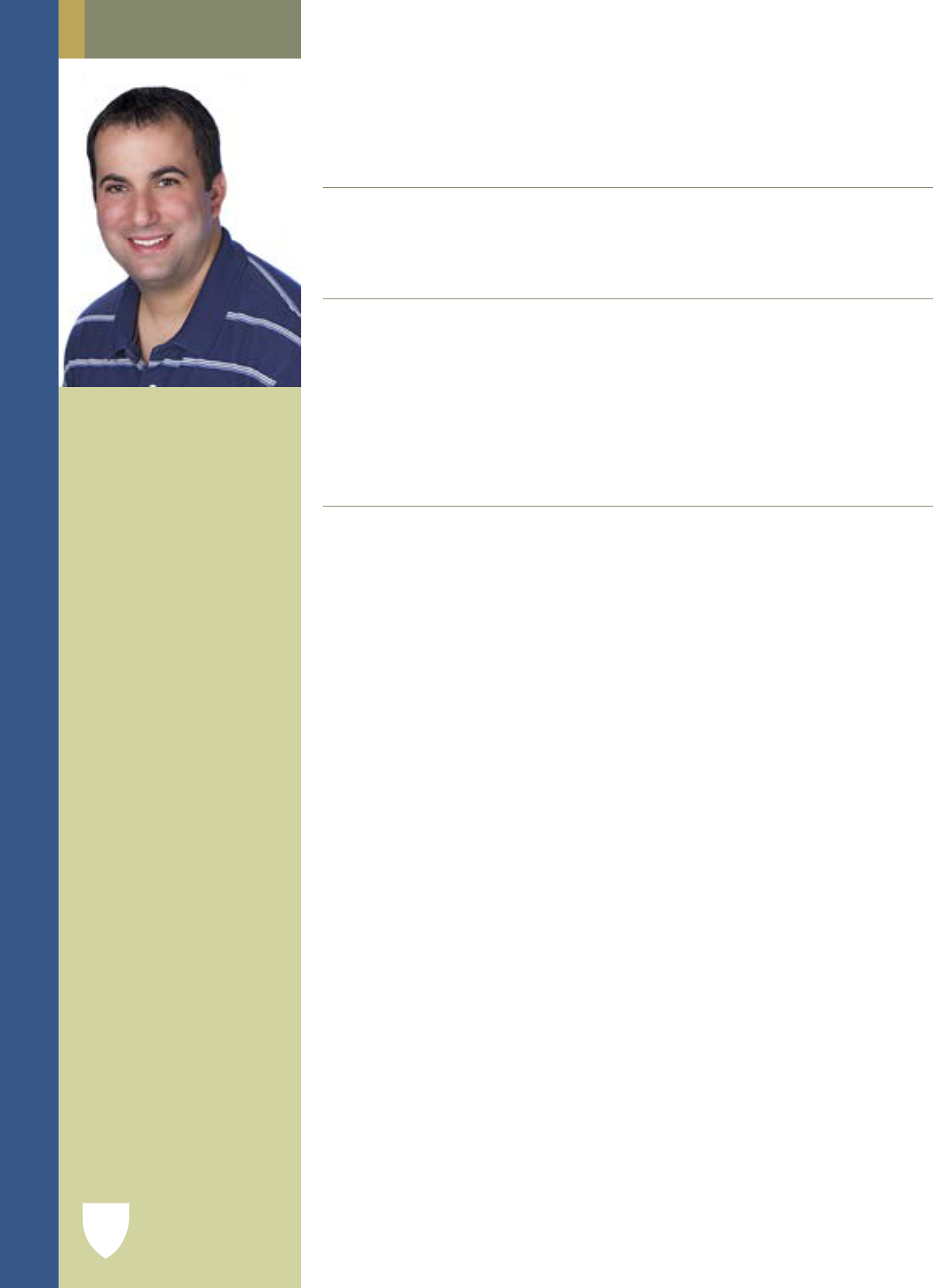
PROFILE BOOK 2013-2014
Zuckerman Fellows
Harvard University
54
DAVIDTROPIN
Harvard Graduate School of Education
Master of Education Candidate in the Teacher Education Program
A H
University of Miami School of Law, J.D.
Syracuse University, B.A. in Political Science, cum laude
P H
Center for Ethics and Public Service, University of Miami School of Law:
Fellow
Lawyers for Literacy: Fellow
Colson Hicks Eidson: Attorney
Honorable Jose E. Martinez, United States District Judge, Southern District
of Florida: Judicial Intern
N
I froze during the fall semester of my freshman year at Syracuse University. However,
it was not the cold upstate New York weather that caused me to freeze. It was the
beginning of September and the teaching assistant for my Sociology 101 class handed
out the instructions for the rst assignment, a four-page essay. Despite taking all
Advanced Placement and honors courses in high school, I never wrote an essay of
any signicant length. I attended a large public high school in Miami, Florida with
over 3,000 students. e average class size was in excess of forty students and because
of this my teachers rarely assigned work that would require more eort to grade
than using a Scantron machine. us, I left high school without many of the skills
necessary to survive in college. My experience as a high school student combined
with my curative freshman year of undergrad were early factors that inspired me to
pursue a career as a high school teacher.
While my high school experience showcased the need for highly skilled teachers, my
personal passion for teaching was cemented while I was in law school. It was during
this time when I began working with the Street Law Program. Street Law is a legal
and educational outreach program that trains law school students to teach law to high
school pupils. It was not uncommon for me to teach students at a correctional high
school in the inner city and students at a suburban private school in the same week.
Working with students of dierent backgrounds reinforced my desire to help ensure
that all students have the opportunity to receive a great education.
As a teacher, I will work tirelessly to ensure that my students have the fundamental
skills necessary to succeed in college and in life. I am looking forward to using my
training from the Teacher Education Program combined with leadership skills honed
through the Zuckerman Fellowship to teach, mentor, and coach high school students
and help guide them towards becoming successful productive members of society.
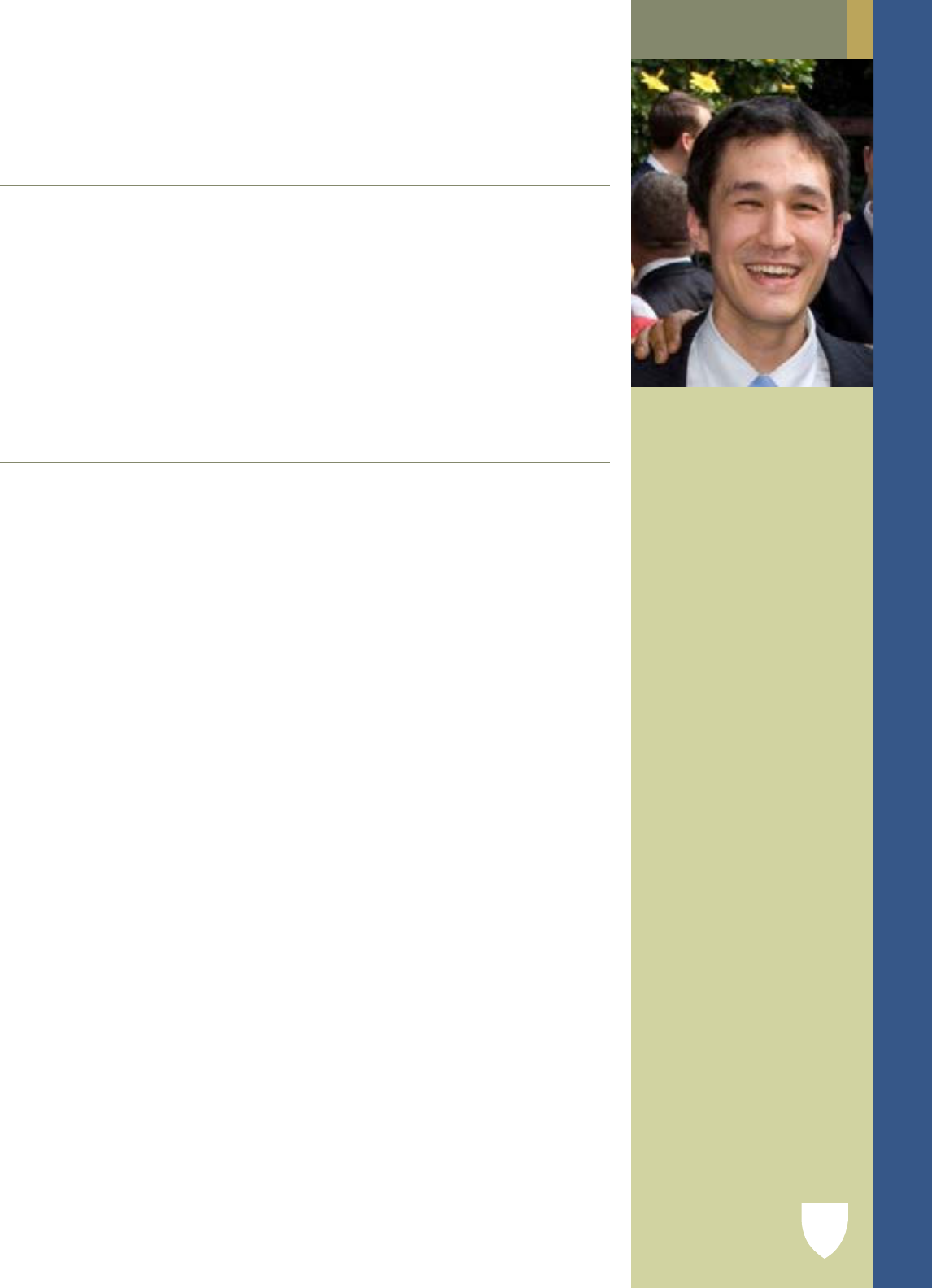
PROFILE BOOK 2013-2014
Zuckerman Fellows
Harvard University
55
ADAMWANGLEVINE
Harvard Kennedy School
Master in Public Administration / International Development Candidate
A H
Harvard Business School, M.B.A. Candidate
Stanford University, B.A.
Fulbright Scholar, China
P H
e White House: National Economic Council
McKinsey & Company: Corporate Finance
World Bank: China
N
My experiences with private and multilateral institutions as well as the US federal
government have shown me the value of careers that bridge a globally diverse spectrum
of elds in the public and private sector.
Joining McKinsey & Company in New York, I learned skills related to the management
of teams and processes as well as my understanding of private markets. My time with
the World Bank in China was critical to my understanding of the region and the
dynamics of one of the most important economic relationships in the world.
Joining the National Economic Council in 2009, I saw the utility of these experiences
in my role developing and implementing economic policies during and in the wake
of the nancial crisis. I found the opportunity to develop economic policy incredibly
rewarding in its ability to eect positive change in society. However, I also recognized
that my previous experiences allowed me to be signicantly more eective and
informed in my position.
Going forward, I believe the Zuckerman Fellowship presents the ideal environment
for continuing this exploration of careers that bridge the worlds of policy and business.
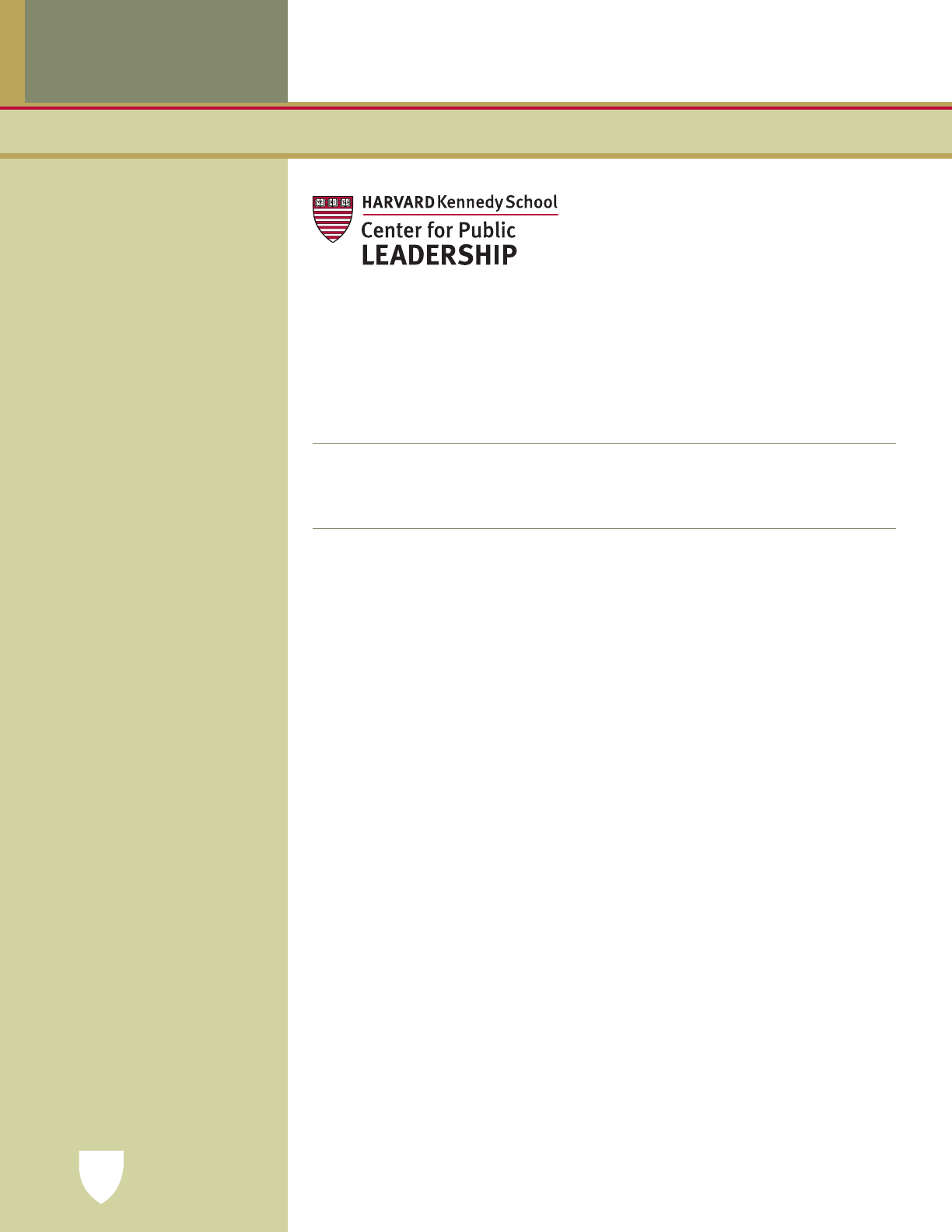
PROFILE BOOK 2013-2014
56
Center for Public LeadershipFellows
F
C P L F P,
:
www.centerforpublicleadership.org
:
Brooke Lynn King
Fellows Coordinator
Center for Public Leadership
Harvard Kennedy School
79 JFK Street
Cambridge, MA 02138
Phone: (617) 496-5238
Email: brooke_king@harvard.edu
Jennifer Firneno
Assistant Director for Fellowship Programs
Center for Public Leadership
Harvard Kennedy School
79 JFK Street
Cambridge, MA 02138
Phone: (617) 496-4764
Email: jennifer_rneno@harvard.edu
Center for Public Leadership Fellows
